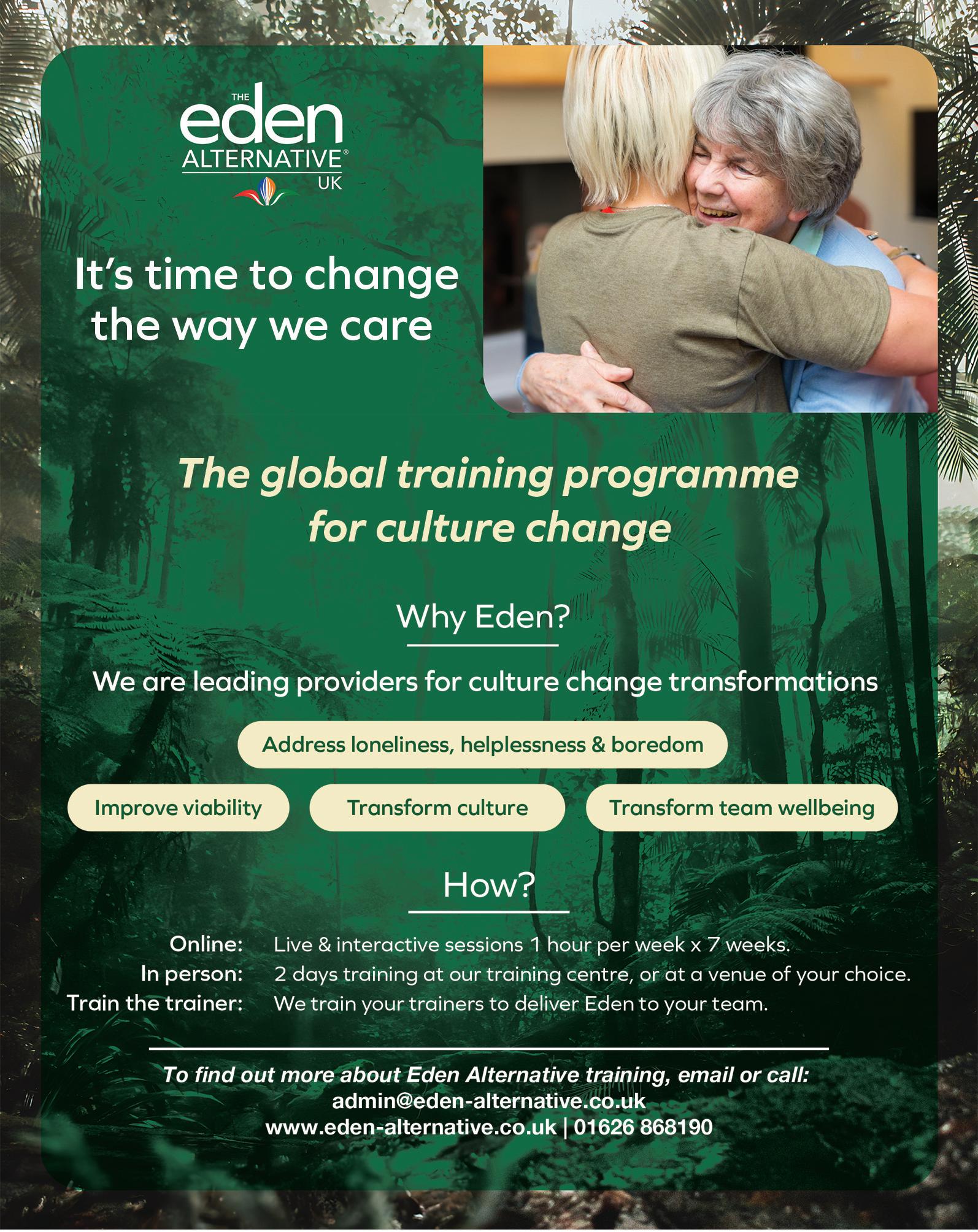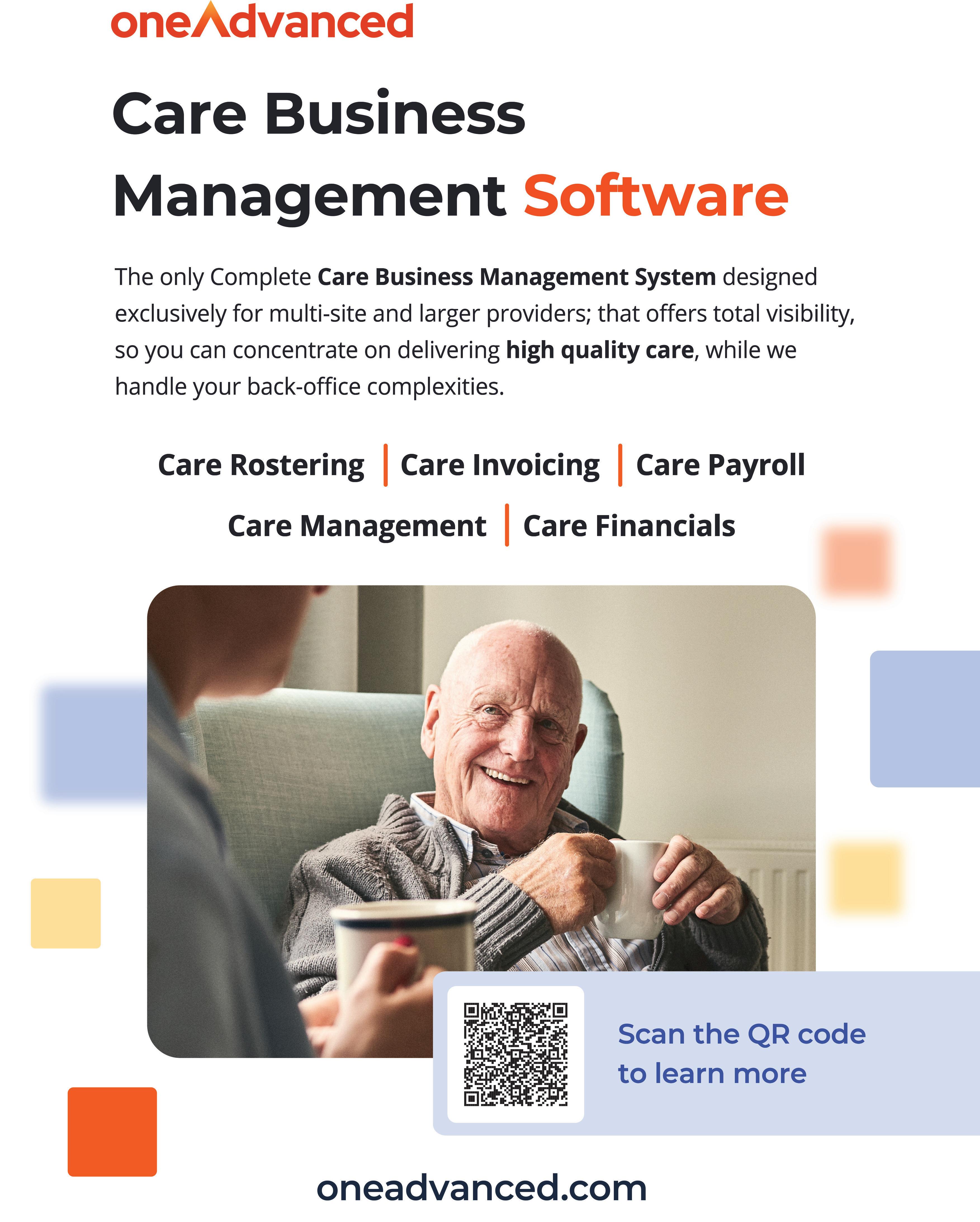

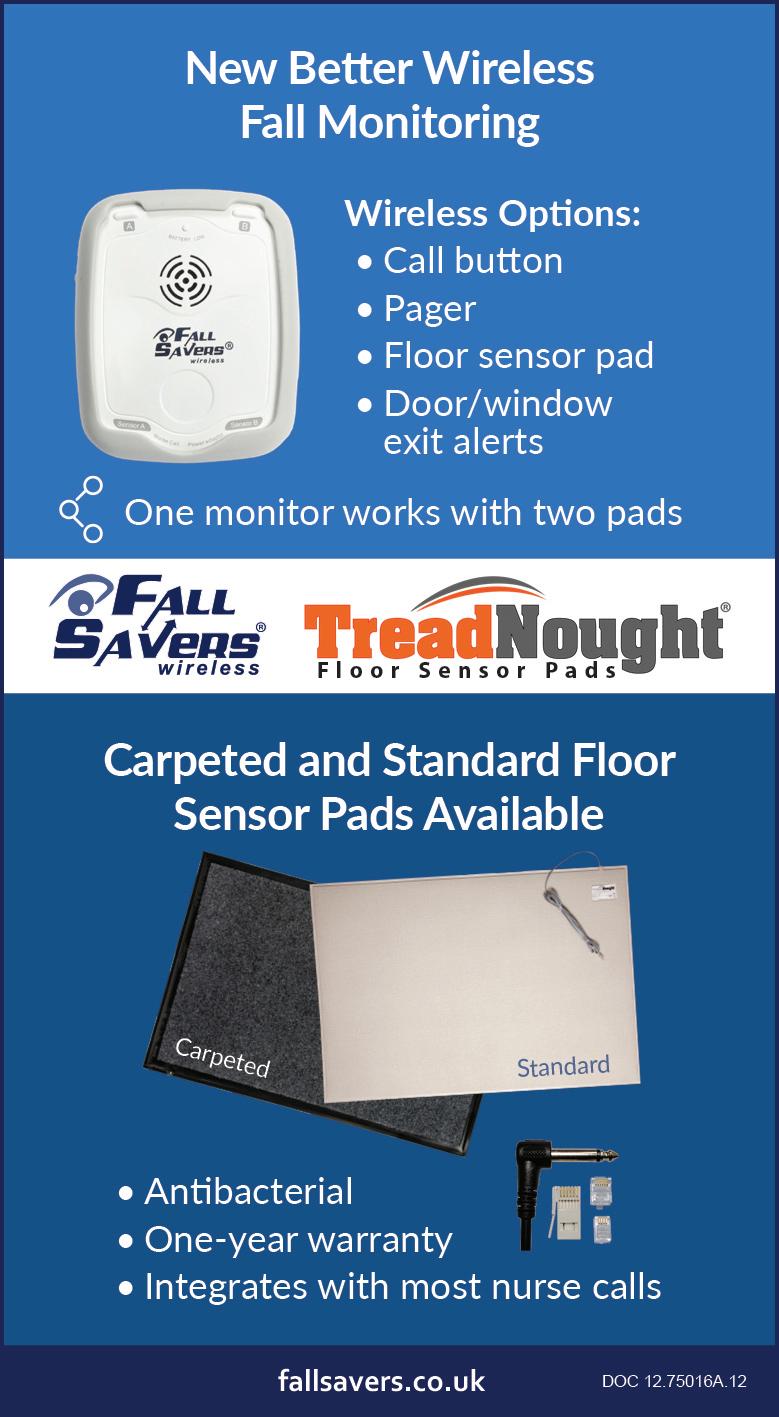













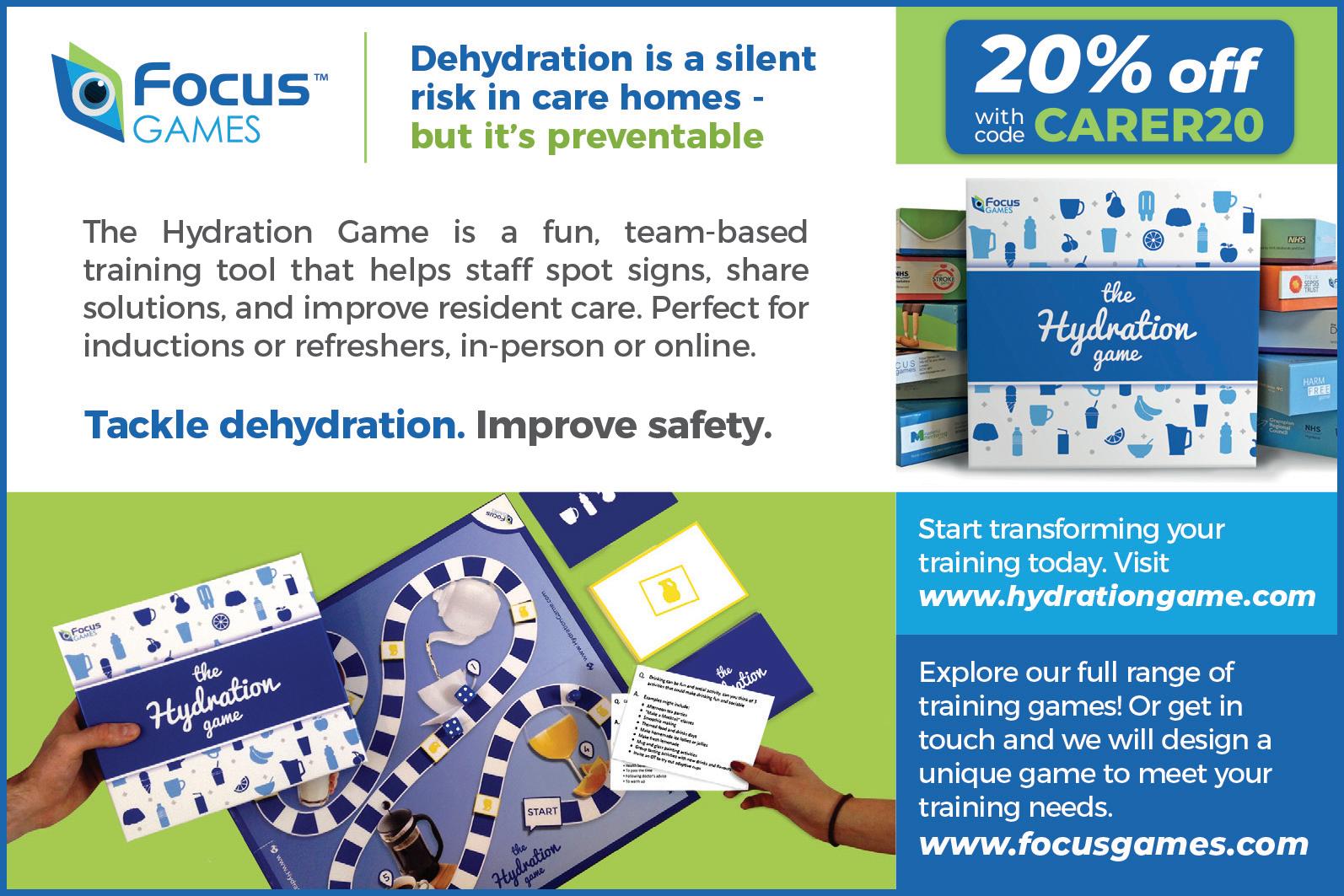
(CONTINUED ON PAGE 3...)

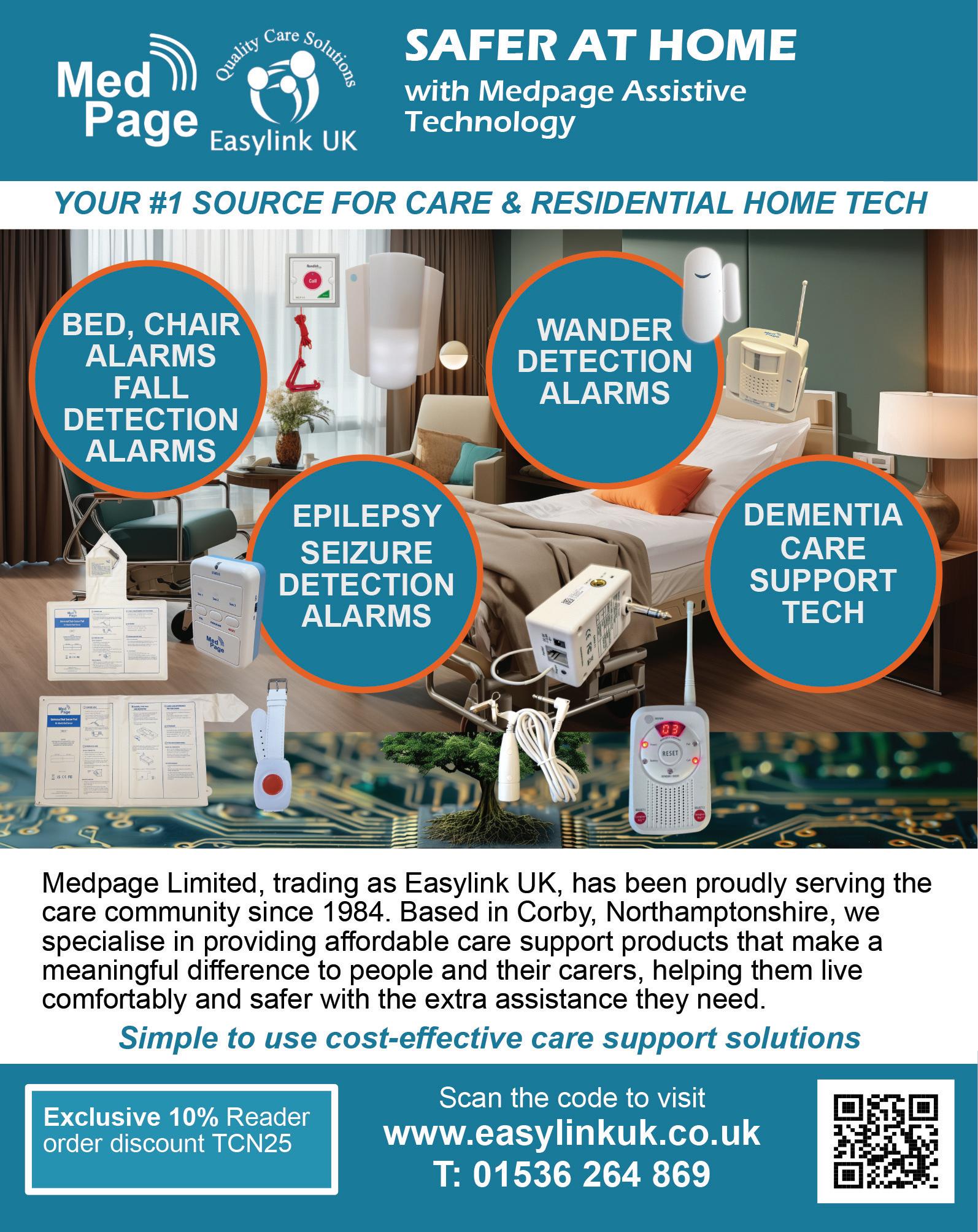
Carer is
Contributions are welcome for consideration, however, no responsibility will be accepted for loss or damage. Views expressed within this publication are not necessarily those of the publisher or the editorial team. Whilst every care is taken when compiling this publication to ensure accuracy, the publisher will assume no responsibility for any effects, errors or omissions therefrom. All rights reserved, reproduction is forbidden unless written permission is obtained. All material is assumed copyright free unless otherwise advised.
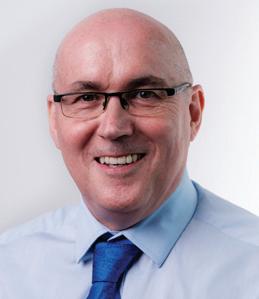
As I write this, the UK Covid-19 Inquiry's Module 6 hearings examining the pandemic's devastating impact on adult social care are drawing to a close.
Over the past month, we have witnessed once again the human cost of a system that was woefully unprepared for the crisis that engulfed our care homes and communities in 2020.
The Inquiry's "Every Story Matters" initiative has documented powerful personal accounts from families, care workers, unpaid carers and people with care and support needs from across the UK, revealing what many of us in the sector already knew –that the pandemic exposed fractures in our social care system that had been years in the making.
Reading through the testimonies emerging from Module 6, I am transported back to a seminar I attended in 2022. Frontline care home managers, operators and staff were invited to stand up and share their experiences of those dark early months of the pandemic.
The room fell silent as, one by one, these dedicated professionals recounted their struggles. They spoke of making impossible decisions with inadequate guidance, of watching residents die alone, of staff working double shifts while battling their own fears and exhaustion. They described the agony of implementing visiting restrictions, knowing full well the emotional cost to families and residents alike.
I wrote then about how harrowing that afternoon was, how the raw emotion and professional anguish had remained with me long after the last speaker sat down. The tears, the trembling voices, the anger at being forgotten by policymakers – it was a microcosm of what our entire sector endured during those unprecedented times.
Now, as Module 6 concludes its examination, we are confronted with the same testimonies on a national scale. The "sorrow and anger" of families and the "impossible" situations faced by carers that the Inquiry has documented mirror exactly what I witnessed in that room three years ago.
The pain is still raw, the scars still visible.
But what disturbs me most deeply is not the recounting of past failures – it is the stark warning that has emerged from this inquiry. We have been told that if another pandemic were to happen tomorrow, the big worry is that social care would be in exactly the same position as before. This is not merely disappointing – it is unconscionable.
We must never find ourselves in that position ever again. The testimonies heard through "Every Story Matters" and the evidence presented to Module 6 must not become mere historical records. They must serve as a clarion call for urgent, systemic change.
The voices that have been heard throughout this inquiry – the grieving families, the exhausted care workers, the isolated residents – they must continue to echo in our decision-making long after the final reports are published. Their stories matter not just for the historical record, but for the future we must build together.
We owe it to everyone who suffered during the pandemic to ensure that when the next crisis comes – and it will come – we are ready. Not just with plans and procedures, but with a system that truly values the human lives it exists to protect and support.
I can always be contacted at editor@thecareruk.com

EMAIL: sales@thecareruk.com
WEBSITE: www.thecareruk.com
EDITOR
Peter Adams
SALES DIRECTOR
David Bartlett
PRODUCTION & DESIGN
Matthew Noades
PRODUCTION & WEB ADMIN
Charlene Fox
Published by

(CONTINUED FROM FRONT COVER)
Module 6 of the Inquiry, the impact of the pandemic on the adult social care sector, heard evidence in relation to the experiences of people who lost loved ones in social care settings, those who used social care during the pandemic, their families and care workers. The inquiry also heard about the decisions made in relation to the care sector and measures to control the spread of Covid-19 in care settings during 2020-2022.
Jacqueline Carey KC, counsel to the Inquiry, laid out the eight areas of focus:
The impact on people’s experience of care
The structure of the sector
• Key decisions made about the sector
The management of the pandemic in adult and residential homes
• Do not attempt cardiopulmonary resuscitation (DNACPR) orders Changes to inspection regimes
Deaths related to infections
Infection prevention and control (IPC) in social care FRAGILE WORKFORCE
Ms Carey asserted that the pre-pandemic state of adult social care was “fragile” and that it “lacked resilience”.
She outlined issues including the discharging of Covid-19-positive patients from hospitals to care homes, local governments struggling to procure personal protective equipment (PPE), a low-paid and overworked workforce and poor testing capacity.
The Inquiry has examined more than 47,000 personal stories shared through “Every Story Matters”, the largest public engagement exercise ever undertaken by a UK public inquiry.
This record is also made up of experiences gathered in 336 research interviews and 38 events held across the four nations.
The hearings heard distressing testimony, including powerful personal accounts from families, care workers, unpaid carers and people with care and support needs from across the UK.
DEVASTATING TOLL
In perhaps the most distressing testimony Reverend Charlotte Hudd, a registered nurse who worked at a care home during the pandemic, described being forced to become the sole remaining nurse caring for approximately 20 residents with complex needs after five colleagues tested positive for COVID-19.
Working entirely alone for ten consecutive days, she was so overwhelmed by the responsibility and fear that at 3am one night she felt compelled to write down her final wishes and a "do not attempt cardiopulmonary resuscitation" instruction, recognising that if she became ill, there would be no one available to provide assistance.
The emotional and physical toll has been devastating. Rev. Hudd now lives with post-traumatic stress disorder and long COVID, ulti-
mately forcing her to leave her position in June 2021. Her experience represents the extreme end of staffing crises that swept through care homes nationwide.
In an unprecedented move, Rev. Hudd took the extraordinary step of raising a safeguarding alert concerning her own situation, formally declaring that neglect was occurring due to circumstances beyond her control. She explained that with insufficient staff, there was genuine potential for harm through delayed continence care, repositioning, nutrition and medication administration.
"Working as a single person with numerous responsibilities, I acknowledged the increased risk of medication errors," she told the inquiry, describing the moral distress of a situation where proper care standards could not be maintained.
CRITICAL SHORTAGES
The inquiry has also heard shocking evidence about critical shortages of personal protective equipment. Care home staff were forced to create makeshift protective gowns from bed sheets and store their limited supply of masks in freezer bags between shifts to enable reuse.
UNISON general secretary Christina McAnea told the inquiry that the situation was "shockingly bad", with policy "made up by Ministers as they went along, with no proper centralised system in place for PPE distribution."
She revealed that UNISON's COVID helpline received over 1,000 calls on its launch morning, many from desperate care staff. When she tried to find official guidance on PPE use, even a senior Health and Safety Executive official couldn't locate it initially, and when found, described it as "complete gobbledygook."
“LEAST WORST DECISION”
Former Health Secretary Matt Hancock appeared before the inquiry early July, defending the controversial decision to discharge hospital patients into care homes during the early pandemic period. Questioned by Ms Carey, Mr Hancock acknowledged the discharge policy was an "incredibly contentious issue".
But he added: "Nobody has yet provided me with an alternative that was available at the time that would have saved more lives."
And he told the inquiry: "It's the least-worst decision that could have been taken at the time.”
The policy was later ruled unlawful by the High Court, in a verdict handed down by Lord Justice Bean and Mr Justice Garnham. They said: “The decisions of the Secretary of State for Health and Social Care to make and maintain a series of policies contained in documents issued on 17 and 19 March and 2 April 2020 were unlawful because the drafters of those documents failed to take into account the risk to elderly and vulnerable residents from non-symptomatic transmission.”
Former Welsh Health Minister Vaughan Gething also gave evidence, acknowledging that with hindsight, more could have been done to protect care home residents. He admitted that earlier testing "might have
been a helpful additional safeguard" and accepted that guidance requiring negative COVID tests before discharge should have been issued sooner than the two-week delay that occurred.
NO “SAFETY NET”
Perhaps most alarmingly, UNISON general secretary Christina McAnea warned that "if another pandemic were to happen tomorrow, the big worry is that social care would be in exactly the same position as before."
She highlighted that the lack of sick pay remains unresolved, explaining how care workers with COVID continued working because "they had no safety net, no money in the bank to tide them over."
The Care Quality Commission's decision to stop inspections during the pandemic meant no oversight was taking place, potentially missing high infection levels and problems such as managers locking safety equipment in cupboards.
DNACPR NOTICES
The inquiry has heard from witnesses about topics including the impact of visiting restrictions on care recipients and their families, concerns regarding DNACPR notices, and pre-pandemic preparedness.
The inquiry heard from a registered manager of a care home who said, “I refused when they said, ‘We’re going to give everybody a DNACPR’, and I went, ‘You’re absolutely not’. My residents will make that decision for themselves. You’re not going to enforce that, so don’t be sending anybody here because you’re not doing that. I asked the question. I asked everybody the question because who knew what was going to happen, but I wouldn’t let anybody come in and do that.”
LEARNED LESSONS
Northern Ireland's former commissioner for older people told the UK Covid Inquiry that locking down care homes to protect residents from Covid was "one of the most difficult decisions" that had to be made throughout the pandemic.
Eddie Lynch said his office heard distressing stories from families about loved ones whose conditions deteriorated due to not receiving family visits.
He said he hoped lessons can be learned and that concrete changes can be made to how care homes will cope in the case of a future pandemic.
The Inquiry has now held the last of nine roundtable discussions with various sectors to support its Module 10 investigation into the impact of the pandemic on society. The final roundtable was with organisations in the housing and homelessness sector.
Each roundtable discussion will lead to a report that will be entered into the Module 10 investigation as evidence. They will also be published on the Inquiry website when Module 10 public hearings are in progress from 18 February 2026. The reports, alongside other evidence, will help to inform the Chair’s findings and recommendations.

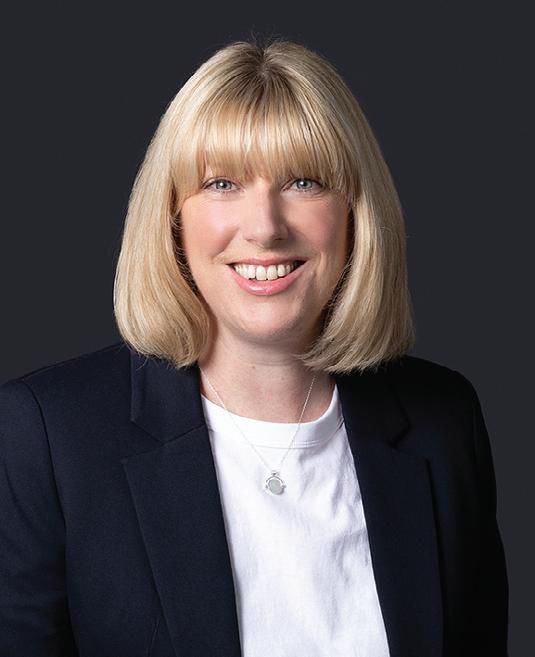
Innovating working patterns, supporting career progression and improving visibility among young people are key ingredients in making care jobs more appealing, according to a new Browne Jacobson report published a year on from a landmark workforce strategy.
These are some of the recommendations set out by the UK and Ireland law firm in its white paper, titled Workforce strategies for care providers.
It builds on the first-ever Workforce Strategy for Adult Social Care in England by Skills for Care, which was published in July 2024, by advising on how care providers can develop their own talent pipelines across three broad themes – train, attract and retain, and transform.
Insights were collected from a roundtable held by Browne Jacobson’s employment and HR services team as part of its “Future of Care” series. It brought together leaders from independent residential care homes, domiciliary care providers, sector-aligned advisers and charities, and the NHS.
Laura Chinyere-Ezeh, HR Consultant who leads Browne Jacobson’s HR services team for the health and social care sector, said: “Skills for Care’s Workforce Strategy aims to ensure we have enough of the right people with the right skills to provide the best possible care and support for the people who draw on it.
“While this sets out policy recommendations at a macro level, it’s vital that care providers are developing their own workforce strategies to ensure they can continue to deliver high-quality care over the coming decades.
“This requirement has been reinforced by the government’s immigration white paper, which restricts care worker visas for overseas workers, who represent a significant proportion of the health and care workforce.
“Therefore, the care sector must work towards ensuring it has access to the people and skills needed to make it fit for the future.
“Despite the absence of formal government adoption and direct financial enhancements such as increased pay or investment, care providers have the opportunity as private businesses to innovate, adopt the recommendations in this report and future-proof their provision with a workforce strategy to meet an
increasing demand for their services.”
A wide range of challenges were brought to light during the roundtable and reflected in the report. A key issue is in attracting and retaining young people, with King's Fund research showing only 8% of the social care workforce comprises 18 to 24-year-olds.
Barriers include a perception that parents aren’t supportive of young people’s desire to join the care sector and a communications gap about what the job entails.
Related to this are challenges around flexible working and career development opportunities, which could be tackled by collaboration between the health and social care sectors to foster mutual respect and equitable treatment of employees.
The Workforce strategies for care providers recommendations can be broadly summarised, under the headings of the Workforce Strategy, as:
Train: Invest in training managers and supervisors to be capable and competent future registered managers. Ensure this training and development is broad to include leadership, managing people, operations and the commercial aspects of running a business, while building on the traditional governance and care quality focus of registered managers.
Attract and retain: Enhance the attractiveness and accessibility of the care sector by improving visibility among young people, promoting the rewarding nature of care work and career pathways, and by innovating working patterns to adopt flexible work – bolstering diversity and inclusion to reflect the breadth of people who draw on care services.
• Transform: As integrated care is promoted and collaboration between the NHS and social care is encouraged, care providers can advocate for their sector by fostering mutual respect between both sectors, by addressing any classism, and working to carve out career pathways as training and experience develop in this collaborative space.
Participants in the roundtable included Karolina Gerlich, of the Care Workers Charity; Rebecca Smith, of NHS Employers; Rick Canavan, of BA Healthcare; Shirley Hall, of Royal Star & Garter; Susanne Chatterley, of Lewisham and Greenwich NHS Trust; and Vishal Shah, of Banyan Care.
To read the full Workforce strategies for care providers report, visit www.brownejacobson.com/insights/workforce-strategies-for-care-providers-future-of-care-report
Care South, has championed the dedication and hard work of the teams at its 16th Stars Awards ceremony.
The annual event, which took place on Thursday 17 July at AFC Bournemouth’s Vitality Stadium, recognises and rewards individuals and teams from across the organisation who go the extra mile to provide great care to residents and clients. It was the second stage of the Stars Awards following localised events held in the care group’s homes and offices to announce the finalists. Nominations are made by colleagues, residents and relatives.
Hosted by Simon Bird, CEO, it featured members of the teams from each of the not-for-profit charity’s care homes and care at home offices based across Dorset, Somerset and North Devon.

A host of accolades were handed out to worthy winners from those working on the frontline through to their colleagues working behind the scenes to enable the provision of outstanding care. The awards included Care Home of the Year, Care South at Home Office of the Year, Carer of the Year, Newcomer, Dining Experience, Activities Team and Best Support Team to name but a few.
A special presentation was given by Karen Hodges, Group Dementia Lead, highlighting Care South’s
journey to becoming a true dementia care specialist. This includes the care group’s receipt of the University of Worcester’s Hennell Award for specialist dementia care, and Care South’s continued approach to delivering dementia care excellence, and making a difference to those in its care. She highlighted many initiatives such as the Dementia Care Coaching programme, Namaste care, the ‘decaffeinated-by-default trial’, and a unique dementia training experience for all staff members.
Karen’s significant and outstanding contribution to the care of residents living with dementia was then recognised with the Chair’s Award, presented by Chris Kean, Chair of Care South.
Simon Bird, CEO at Care South, said: “I am immensely proud of every member of the Care South team, but extra special congratulations must go to our winners at this year’s Stars Awards as they really do go above and beyond to deliver the very highest quality care to all our residents and care at home clients.
“It is so important that we celebrate the incredible work that our carers and support teams do day in day out – week in week out – to provide outstanding care, as well as Food, Fun and Friendship to all those in our care and bringing reassurance and peace of mind to their families and loved ones.”
In April 2025, the Supporting the Provider Market (STPM) team in County Durham published a new report evaluating the use of pobroll® — a waterproof bed-bathing wrap designed to improve dignity, comfort, and ease during personal care.
This evaluation was carried out across 10 care homes with high numbers of residents living with dementia. Each setting was given one or more pobroll® units and invited to share feedback through a structured survey. The findings reveal how even simple tools can make a significant difference in everyday care.
How was pobroll® used?
Most care homes used pobroll® daily or several times per week, showing it quickly became part of regular practice. Staff noted that one of the biggest challenges was not having enough units — all homes requested additional stock after the trial, highlighting a clear appetite for wider adoption. What did care teams think?
Feedback from the care homes showed strong support for the tool:

Ease of use was rated highly, with an average score of 4.4 out of 5. Staff found pobroll® straightforward to incorporate into care routines.
Training was rated slightly lower, at 3.8 out of 5, suggesting that while the wrap is easy to use, additional training resources could improve onboarding for new users.
Resident response was positive. Three in ten care homes reported improved mood or behaviour during bed
Written by Pat O’Brien of
bathing for dementia patients.
• Key benefits included greater warmth, coverage, and dignity for residents, especially those who might find conventional methods distressing. Some teams also found it particularly useful for end-of-life care
Would they recommend pobroll® for bed bathing for dementia patients?
Absolutely. Homes rated their likelihood to recommend pobroll® at 4.3 out of 5, with half of respondents giving it a full 5 out of 5. The overall feedback was clear: this is a valued, meaningful addition to personal care.
Would they recommend pobroll® for bed bathing for dementia patients?
The results of this trial reinforce what many professionals already believe — that small, thoughtful design changes can significantly improve care. For residents who are bedbound or living with dementia, personal care can often be a distressing experience. But with the right tools, it doesn’t have to be.
The pobroll® isn’t a complex device. It’s a simple, dual-layered cotton towelling wrap. But its thoughtful design — offering full coverage, comfort, and support — makes a real difference where it matters most. If you’re part of a care home, hospice, or hospital and would like to explore how pobroll® could benefit your residents or service users, get in touch. We’re here to support compassionate, dignified care — one small change at a time.
See the advert on the facing page for details, or visit www.pobroll.co.uk
Local authority budgets for social care were overstretched by £774 million last year to meet the legal duty to provide care and support, recording the highest overspends in a decade, according to the latest annual survey from the Association of Directors of Adult Social Services (ADASS).
Local authorities across England have been forced to cut prevention spending by over 10% this year as adult social care costs continue to spiral out of control.
The organisation’s Spring Survey, released yesterday (July 15), paints a stark picture of a system under unprecedented strain. Prevention spending has plummeted to £1.3 billion, its lowest level since 2021/22, as cash-strapped councils are forced to prioritise crisis interventions over early support services.
The survey findings highlight how mounting financial pressures are pushing local authorities into “crisis mode” operations. With escalating care costs and dwindling resources, councils are increasingly unable to invest in the preventative measures that could help residents maintain their independence longer.
This represents a significant challenge to the Government’s ambitious 10 Year Health Plan, which emphasises three key transitions: shifting from hospital to community care, moving from treatment to
prevention, and embracing digital transformation.
The research underscores the difficult balancing act facing care leaders. As demand for intensive support services continues to rise, councils are finding themselves with little choice but to scale back early intervention programmes that could prevent more serious care needs from developing.
The survey also shines a light on the critical role of unpaid carers, who are increasingly stepping in to fill service gaps. These dedicated individuals – often family members and friends – are providing essential support that would otherwise fall to professional services.
However, the research warns that this reliance on unpaid carers comes at a significant cost, with many experiencing negative impacts on their own health and wellbeing. The survey emphasises the urgent need for enhanced local support systems to better assist these vital members of the care community.
Furthermore, three quarters of Directors continue to see increasing numbers of people with some of the most complex care needs approaching their councils for support, who would have previously had their care funded free of charge through an NHS budget called Continuing Healthcare (CHC).
Data shows a postcode lottery for CHC funding, with people less
likely to be successful in obtaining CHC support according to where they live in the country.
The trend of care workers increasingly being asked to carry out health tasks that would normally have been covered by NHS staff continues despite this often being unfunded, and a staggering 100% of those Directors surveyed believe increased pressure on the NHS will in turn increase pressures for adult social care into next year .
Jess McGregor, ADASS President and Director of Adult Social Care in Camden, said: ‘We shouldn’t have to choose between helping people with complex needs now and preventing others from getting unwell –we need to support people at both ends of the social care spectrum.
‘But without more investment to keep people well and independent at home, we risk undermining the shift towards prevention and neighbourhood health that Wes Streeting, the NHS and this Government are rightly championing.’
Ms McGregor added: ‘It’s vital that adult social care leaders who are well versed in delivering support at the community level are meaningfully involved in decisions about where and how resources for neighbourhood health and care are spent. After all, acute hospitals are not best placed to deliver social care at the neighbourhood level – but councils are.’
When care home Brendoncare Froxfield asked resident Jean Birtles what she would like to celebrate her 105th birthday, she said she wanted a snake charmer!
To grant her wish, they invited Paul Smith from Feathers, Fangs and Furries from Andover.
Paul and his family came along not just with a snake, but with a selection of their other exotic creatures to entertain Jean, her family members and friends, residents and team members.
Paul gladly took on the role as the snake charmer for the birthday girl. She is a big animal lover and keeps everyone entertained about all the animals she has cared for over the years. She kept goats and once took them to London by car. She is affectionately known as Granny Goats by her family!

Jean came to live at Froxfield in 2019, moving there from Bexhill-onSea in East Sussex where she was actively involved in the community and was a much-loved member of the local Women’s Institute. Staying active is very important to her and she believes this is her secret to a long and happy life.
She said afterwards: “Paul is a great entertainer and I knew the others would enjoy seeing him.”
Trudy Allen, Froxfield’s Wellbeing Supervisor, said: “Jean is such a character and when she told us what she wanted to do to celebrate her birthday, we decided we were up for the challenge of finding a charming man with a snake!
A huge thank you to Paul and his family for making this such a special occasion.”
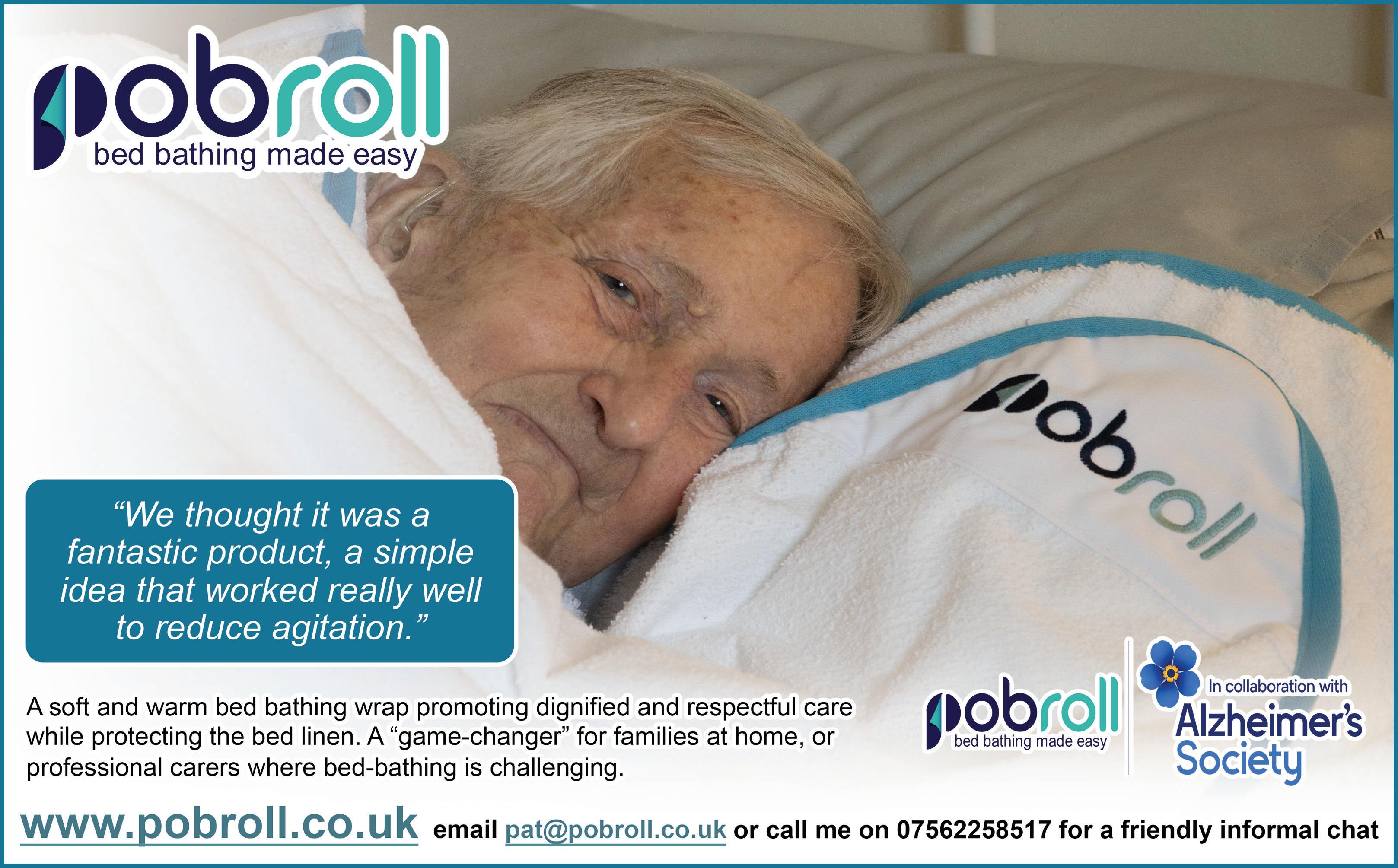
By Nikki Walker - CEO of QCS, an RLDatix Company
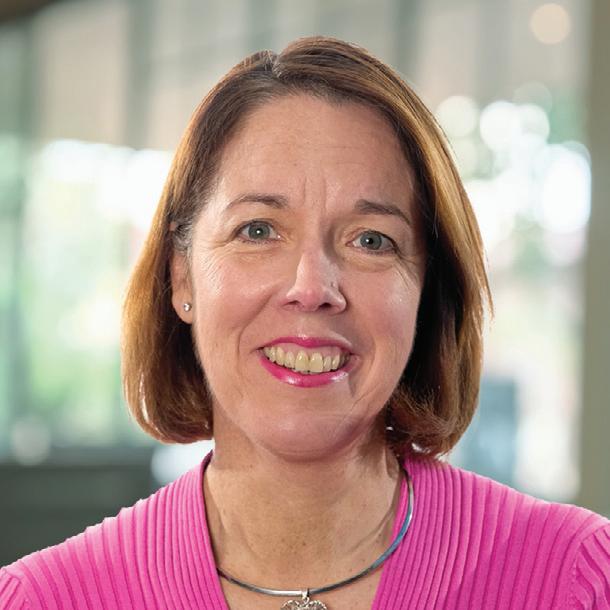
The social care sector stands at a turning point. With rising demand, increasing regulatory scrutiny, and ongoing staffing pressures, providers are being asked to do more, with less. In this environment, the way forward isn’t just about working harder it’s about working smarter.
One of the most transformative shifts on the horizon is the move towards truly integrated care systems: digital platforms that bring together compliance, care planning, risk management, training and quality monitoring in one unified place. More than just a convenience, this integration is fast becoming essential. Currently, many providers juggle multiple systems or rely on a mix of digital tools and paper-based processes. Information is scattered. Teams duplicate effort. Vital data goes unnoticed.
The result? Frustration, inefficiency and risk.
A connected system solves this by creating a single source of truth, where care delivery and compliance are not just stored, but actively linked. Changes in a policy can automatically update associated risk assessments. Notes in a care plan can prompt training needs. Audit trails are clear and accessible. For staff, it means less time on admin. For managers, better visibility. For individuals receiving care, more consistent, safer support.
Adding artificial intelligence (AI) into the mix elevates this even further. AI can help spot patterns in care records, prompt best practice actions and reduce the burden of documentation. Crucially, AI isn’t there to replace human decision-making it’s there to support it. By giving frontline teams real-time, intelligent guidance, it helps ensure nothing is missed and quality remains high.
Of course, technology alone isn’t enough. These systems must be built on deep sector knowledge and shaped by those working in care. Platforms like QCS, for instance, combine expert-backed content with intelligent tools to provide not just data, but insight. It’s this fusion of trusted information and digital innovation that’s beginning to change how care is delivered.
But a connected future is about more than software. It’s a cultural shift towards a care environment that is proactive rather than reactive, where data drives improvement, and where teams feel confident and supported.
In a sector where every moment counts, integrated systems offer more than efficiency, they offer the chance to focus on what matters most: people. When technology works seamlessly in the background, it frees carers to do the deeply human work that technology can’t replicate.
The future of care is not just digital. It’s intelligent. And most importantly, it’s integrated.
To see how QCS are integrating care planning, rostering. audits, mock inspection, surveys, training, compliance, dementia care and more into one integrated system backed by AI technology, follow the link. www.qcs.co.uk/what-we-do/
Skills for Care, in partnership with the Council of Deans of Health, has launched the first ever strategy for social care in practice learning and curriculum of nursing education programmes.
The strategy was launched at an online event on 23 July 2025. During the event, attendees had the opportunity to hear from a variety of key speakers, including The Minister of State for Care Stephen Kinnock and Chief Nurse for Adult Social Care Deborah Sturdy, and learn more about the strategy and how social care can become a placement of choice for all student nurses and nursing associates.
The Social Care Nursing Placement Strategy aims to foster stronger connections between students, care providers, employers, the social care workforce, universities and colleges, to enhance and promote understanding and engagement with social care settings and provide sustainable high quality practice placement opportunities. It also sets out the recommendations needed to ensure the future workforce has the knowledge and skills to support population health in England in the very near future as well as to meet the future direction of the 10-year plan for health.

Chief Executive of the Council of Deans of Health, Ed Hughes, said: “The Council of Deans of Health is proud to be working with Skills for Care to develop and deliver a social care placement strategy for nursing education that provides opportunities for members to expand their placement portfolios and for students to experience a range of settings to help their development as healthcare professionals.”
“We are working with our member universities and colleges to encourage more nursing students to look at a career in social care environments. This strategy sets out some valuable steps towards achieving this shift to making social care a destination of choice.”
Oonagh Smyth, CEO, Skills for Care, says: “Nursing in social care is a critical part of our social care workforce and this strategy will offer future graduates into the health and care system a clear understanding of how people drawing on care and support access health and care services.”
The Council will be working with Skills for Care to promote social care as an opportunity for placements and as a career choice. This collaboration involves the launch of a new social care network for students and early career nurses and supporting the implementation of the strategy with our members and stakeholders.
THE COUNCIL’S CONTINUED PARTNERSHIP WITH SKILLS FOR CARE AIMS TO ACHIEVE THE FOLLOWING OBJECTIVES:
• Promote the opportunities that social care has to offer.
• Maintain and grow the quality and capacity of social care practice placements.
• Increase students’ understanding of social care and inspire them to work in the sector.
• Work with our members to help embed the social care placement strategy into the healthcare education sector.
“The skill and expertise of care professionals working in people’s own homes and communities offers rewarding learning and development opportunities across the breadth of nursing education programmes. This strategy gives much needed recognition of the complexity, professional autonomy and leadership of nursing roles in social care.”
Professor Martin Green OBE, Chief Executive of Care England commented: “We are proud to have long championed the inclusion of adult social care within nursing education, and today’s strategy marks a vital and visionary step forward which we wholeheartedly support. Nursing in social care is uniquely complex, skilled, and deeply human; it demands clinical expertise, leadership, and compassion in equal measure.”
“By offering student nurses meaningful placements in care homes, supported living, and home care, we open their eyes to the reality of integrated, person-centred care delivered at the heart of communities. These experiences will not only enrich their training but inspire many to see adult social care as the rewarding and impactful career it truly is. This is how we build a confident, connected, and compassionate workforce for the future; and we welcome this bold commitment to making that future a reality.”
In retail, bigger is often equated with better. But in continence care, size alone does not equal performance. What matters is fit, appropriateness, and clinical suitability.
At Ontex, we believe continence care should be clinically sound, cost-conscious, and centred on the individual. We support care providers through practical training, formulary-aligned product design, and assessment-led solutions that preserve dignity and comfort.
Addressing Common Misconceptions in Care Settings

Here are some frequently encountered misconceptions about absorbent continence solutions:
1. "The bigger the resident, the bigger the pad."
This is a frequent misunderstanding. Correct sizing depends on accurate waist, hip, and thigh measurements. In many cases, a smaller, well-fitted solution provides better containment. Selection should also be based on the individual’s continence profile and type- not just physical stature.
2. "Belted products fit anyone if tightened enough." Tightening at the waist does not guarantee security around the legs. A proper fit should allow a one-finger gap at the leg and a two-finger gap at the waist. Belted options are often higher-cost items and should be used only when clinically appropriate.
3. "Double padding keeps residents drier."
Layering pads undermines containment. Once fluid reaches the
waterproof backing of the upper pad, it is diverted laterally often leading to leaks, moisture-related skin compromise, and reactive containment changes that increase staff burden. A single, well-matched product is always the safer choice.
4. "Pull-ups are the best option for everyone."
Pull-on formats suit some profiles but may hinder others. They are not ideal for individuals with reduced dexterity or limited mobility. Two-piece systems offer greater flexibility and allow for the use of personal underwear—supporting comfort, autonomy, and dignity.
Why Assessment Is Essential
A thorough continence assessment rather than assumption-based product selection is key to improving outcomes, optimising cost, and protecting resident wellbeing.
Key Assessment Components:
- Measurements: Capture accurate waist, hip, and thigh data. Always refer to product-specific sizing guidance.
- Bladder Diaries: Maintain a 3-day fluid intake and output record to determine actual absorbency needs. This often reveals a lighter option may suffice.
Clinical and Operational Benefits:
- Prevents unnecessary product usage
- Reduces reactive containment changes
- Minimises moisture-related skin issues and infection risk
- Improves comfort, dignity, and independence for residents
Our guidance aligns with NHS England policy on absorbent containment: assessment-led provision, a maximum of four pads per 24 hours unless clinically justified, and prioritisation of adaptable two-piece systems wherever appropriate.
Broader Considerations
- Infection Risk: Continuous use of containment products without regular reassessment can increase the likelihood of urinary tract infections. A structured, assessment-led approach helps mitigate this risk.
- Skin Health: Selecting the right containment format supports skin preservation. Regular skin checks should accompany each pad change.
- Cost and Resource Efficiency: Product selection tailored to individual need reduces waste, optimises staff time, and supports broader NHS resource stewardship. NHS formularies consistently prioritise flexible, fit-for-purpose solutions.
Final Thought
In continence care, assumptions cost more than time they impact dignity, safety, and outcomes. Assessment-led, evidence-based selection reflects best practice and ensures the right solution, for the right person, at the right time. Want to support your team with continence product fit checks or product training delivered by our Nurse Advisors? Ontex provides practical resources and training, tailored to your care setting. Contact your local nurse advisor to arrange a session.
For
Social care vacancy rates have returned to pre-Covid levels, according to the latest data from Skills for Care – the workforce development body for adult social care in England.
The annual ‘Size and structure of the adult social care sector and workforce in England’ report also found that the adult social care sector has continued to grow between April 2024 and March 2025, despite a significant fall in the number of international recruits.
The new figures – based on data from Skills for Care’s Adult Social Care Workforce Data Set (ASC-WDS) –show that the vacancy rate for 2024/25 fell to 7%. This was a return to similar levels seen prior to 2021/22, when the rate had peaked at 10.5%.
The total number of vacant posts in 2024/25 was 111,000, which is a 12.4% decrease on the previous year.
The number of filled posts grew by 3.4% to 1.6 million. This growth was smaller than the previous year, but still the second highest increase on record.
The report shows the turnover rate in the independent sector decreased from 25.8% in 2023/24, to 24.7% in 2024/25.
The number of international recruits fell from 105,000 in 2023/24 to 50,000 in 2024/25.
However, the number of posts filled by people with a British nationality continued to fall, decreasing by 30,000 in 2024/25 - a decrease of 3%. The overall decrease in posts filled by people with a British nationality since 2020/2021 is 85,000 (7%).
The total number of posts in adult social care in England – comprising filled and vacant posts - was 1.71m in 2024/25, and this is an increase of 2.2% from 2023/24.
The sector still faces long term recruitment and retention challenges as it is projected to need around 470,000 new posts - an increase of 27% - by 2040 to keep up with the projected growth in the population over the age of 65.
£1,000 with
A team of dedicated staff and volunteers from Brunelcare’s Little Heath Care Home have successfully climbed Pen y Fan, the highest peak in South Wales, raising over £1,000 to support activities and enhance the living environment for their residents across the home.
Pen y Fan is situated in Brecon Beacons National Park and stands at 886 metres (2,907 ft) above sea-level.
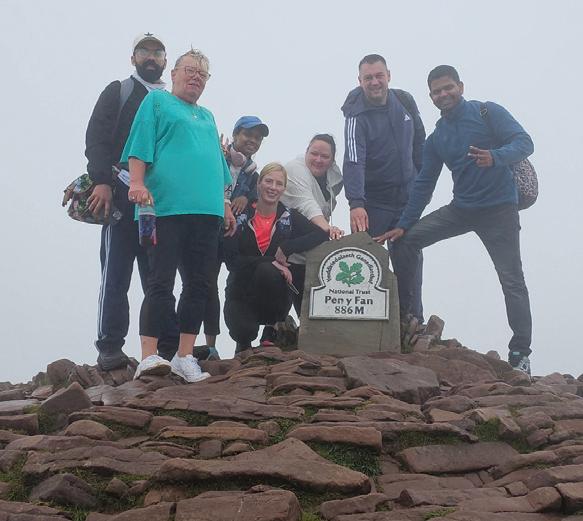
The fundraising initiative, led by team members Jess Ward, Business Manager at Little Heath and Ruth Easton, Homemaker at the care home, was launched with the aim of improving day-to-day life
at the care home from funding new activities to enhancing the overall environment. The challenge quickly gained momentum and was embraced by the wider team, becoming not just a charitable event, but a valuable team-building experience.
Krishna Mullekattu, Little Heath Care Home Manager said: “Climbing Pen y Fan in the wind, rain and mud was no easy feat, it was exhausting and, at times, even a little dangerous. But alongside an incredible team of staff and volunteers, we made it to the top! I’m proud that our determination helped raise funds for the meaningful activities we provide to our residents every day.”
Skills for Care's Adult Social Care Workforce Data Set (ASC-WDS) has data on more than 700,000 people in over 20,000 locations and enables data to be gathered flexibly on new areas of interest, to support policymaking and understanding of the workforce.
Oonagh Smyth, Skills for Care’s CEO, says:
“It's encouraging to see the sector continuing to grow and the vacancy rate falling back to pre-Covid levels.
“But we can't afford to be complacent as some of this will be down to the fall in vacancies in the wider economy, which we know always benefits our sector. We need to protect ourselves from the wild swings in vacancy rates driven by the wider economic picture.
“It’s important to recognise that, while the vacancy rate in social care has reduced, it’s still three times that of the wider economy. And the data show that we’ll still need 470,000 more posts by 2040, so all of us in adult social care need to stay focused on workforce issues.
“Building resilience means investing in stable recruitment and retention and making roles more attractive to the domestic workforce over the long term. That includes improving development opportunities, improving the quality of roles and supporting positive cultures within organisations.
“The sector is strongly committed to action. It's been a year since we published the Workforce Strategy for Adult Social Care in England, when the sector came together to develop it under Skills for Care's leadership. We've made a lot of progress implementing it over the past year and more than half of the Strategy's recommendations and commitments are already in progress or complete.
“We know there's lots more to do, though. Everyone - from Government to care providers, from regulators to frontline staff - has a role to play in building the workforce we need to deliver the best possible care and support for the people in our communities who draw on local services.”

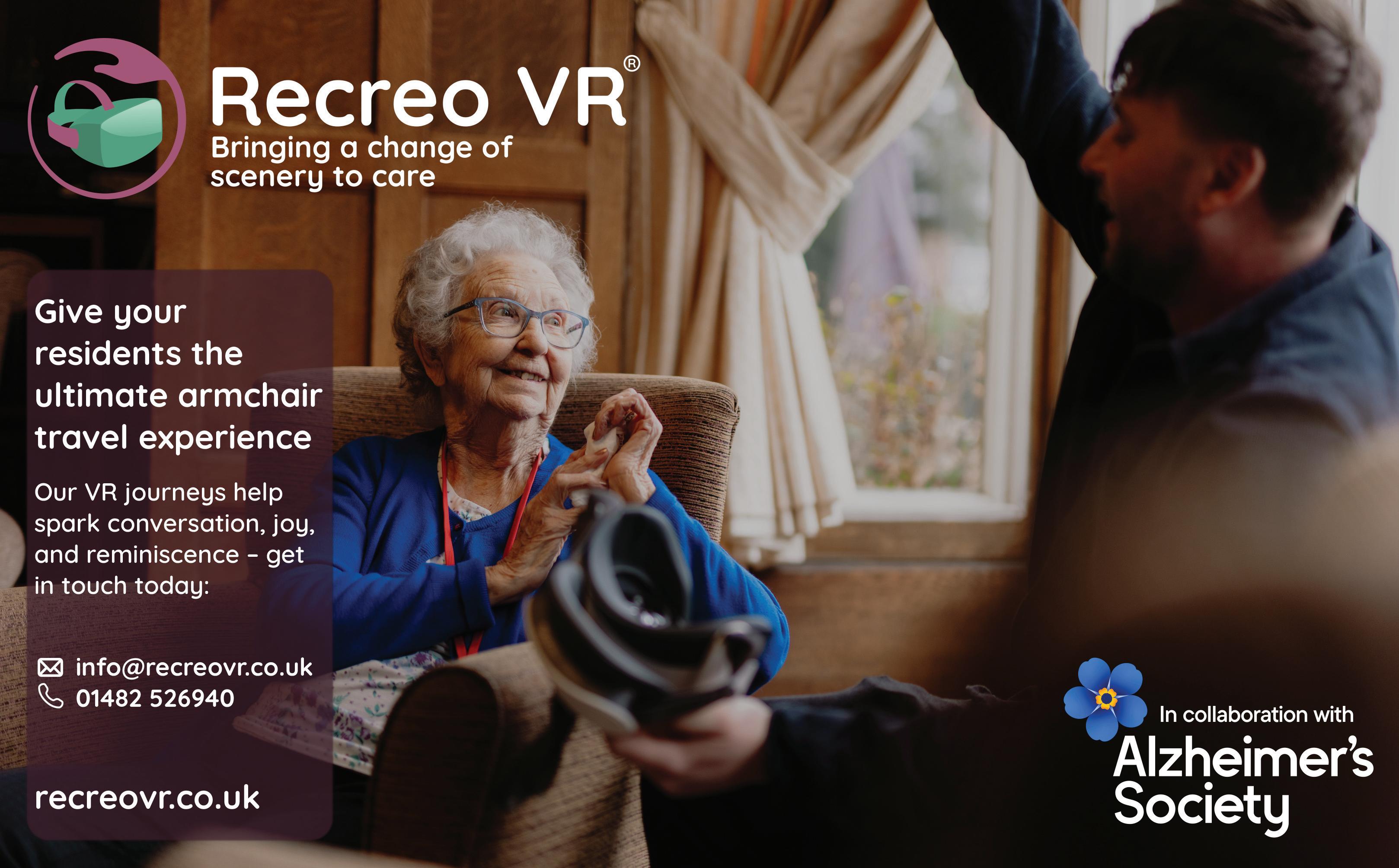
By Lauren Dennis, Trainee Solicitor at Birketts LLP

The care sector provides essential support to individuals who need assistance. While carers dedicate their time to the well-being of others, the pressures of the job often leave their own mental health overlooked. The emotional toll of caregiving, combined with systemic challenges, has led to increasing concerns about mental health within the sector.
New research published by the International Longevity Centre UK (ILC) finds that serious mental health conditions are hampering people’s ability to live more fulfilling long lives. Health and Social Care workers are at high risk of experiencing anxiety, depression, and burnout due to the weight of their responsibilities. Burnout is a state of emotional, physical and mental exhaustion which can occur when experiencing long-term stress and pressure; it is a major concern in the sector. When carers are physically and emotionally drained, both their health and the quality of care they provide can suffer. It can also lead to more serious consequences including suicidal thoughts, or increased risk of accidents caused by fatigue.
HSE GUIDANCE
The HSE has focused on preventing work-related stress and promoting mental well-being among employees. Their guidance can be found here: https://www.hse.gov.uk/stress/. Employers have a legal responsibility to help their employees. As with other hazards at work, work-related mental health issues must be assessed to measure the levels of risk to staff. Once risks are identified, steps must be taken to minimise it as far as reasonably practicable.
The HSE links poor mental health and stress with an increase in both suicide and workplace accidents. Fatigue is particularly relevant to the care sector, arising from prolonged exertion, sleep deprivation, and disruption of circadian rhythms—factors commonly experienced by care workers due to long and irregular shifts. The HSE highlights that fatigue leads to slower reaction times, reduced attention, and impaired decision-making, all of which increase the risk of errors and injury.
Where such factors contribute to a death—whether through accident, misadventure, or suicide—there is a clear risk that a care provider or employing organisation may be called as an Interested Person (IP) to an inquest. This is particularly the case if organisational practices or working conditions are alleged to have contributed to the deceased’s state of fatigue or mental ill-health. The coroner may consider whether systemic issues such as staffing levels, shift patterns, or support mechanisms played a role, thus bringing the organisation’s actions and policies under scrutiny during the inquest.
The Thriving at Work Report sets out a framework of actions which employers of all sizes can, and should, put in place. The full report can be found here: https://assets.publishing.service.gov.uk/media/5a82180e40f0b6230269acdb/thriving-at-work-stevensonfarmer-review.pdf.
Ways to support your staff:
Implement a mental health at work plan which promotes good mental health and outlines the support available for employees.
Increase awareness of mental health.
Encourage open conversations.
• Provide good working conditions with a work life balance.
Have management structures in place for employees to go to for support.
Monitor employee mental health by talking to your employees and understanding risk factors.
The Care Quality Commission (CQC) has published its annual controlled drugs oversight report for 2024, revealing key challenges facing care homes in managing controlled medications, particularly for end-of-life care.
The report, published on 15 July 2025, examines the CQC’s oversight activity under the Controlled Drugs (Supervision of Management and Use) Regulations 2013 and highlights findings from inspections and engagement with local controlled drug intelligence networks led by NHS England.
Among the primary issues identified in the report, the CQC specifically highlighted difficulties with “access to controlled drugs in care homes for end of life care” as a significant concern. This continues to be a persistent challenge for residential and nursing care providers seeking to ensure appropriate pain management and comfort care for dying residents.

The regulator also emphasised the critical importance of healthcare professionals working within their scope of practice – a particular concern for care homes where staff may not always have clear guidance on controlled drug administration boundaries.
The report identified concerning levels of fraudulent activity and diversion of controlled drugs by health and care professionals, as well as support staff. This included instances of people impersonating healthcare professionals to obtain controlled substances.
Of particular relevance to care settings, the CQC noted fraudulent prescriptions being produced within electronic systems in primary care to conceal theft, alongside ongoing fraud involving private prescriptions for controlled drugs in lower schedules.
NHS primary care services prescribed 74,160,671 controlled drug items in 2024, representing a slight increase of 0.4% compared with 2023. The report noted that overall prescribing levels across different schedules of controlled drugs remained stable.
Notable trends included increases in prescribing volumes of medicines licensed to treat ADHD, such as dexamfetamine, lisdexamfetamine and methylphenidate, and a continued increase in testosterone prescribing.
Conversely, there were reductions in prescribing of several medications commonly used in care settings, including pholcodine, pethidine, fentanyl, diamorphine, zopiclone and zolpidem.
The report highlighted significant growth in non-medical prescribing, with pharmacist prescribing continuing to expand and accounting for over half of all non-medical prescribing. Paramedic prescribing increased dramatically by 704% in 2024 compared with 2023, following legislative changes at the end of 2023 that permitted paramedic independent prescribers to prescribe a range of controlled drugs.
Cannabis-based products for medicinal use (CBPMs), which are Schedule 2 controlled drugs, continue to be prescribed almost exclusively in the independent sector. The most recent data showed a 130% increase in unlicensed CBPM prescribing in independent services between 2022/23 and 2023/24.
The report also flagged impending changes to NHS England and the regional and national controlled drugs oversight function, which may affect how care homes interact with oversight bodies in future.
The CQC noted the ongoing need to improve cross-border prescribing datasets on controlled drugs, which could impact care homes operating across different regions or accepting residents from various areas.
The report included themes identified from a review of Prevention of Future Death Reports, shared to highlight the risks associated with controlled drugs across healthcare settings, including care homes.
The CQC has made recommendations in the report to raise awareness and address the specific issues identified during 2024, with particular attention to ensuring appropriate access to controlled drugs for endof-life care while maintaining robust security and governance arrangements.
Social care collaboration and use of an “outside the box” approach to recycling of community equipment means daily life is now safe for teenager Rhianna Maness. The 17 year-old has complex disabilities, including seizures and being non-verbal. Her parents Melissa and Darren themselves have health issues.
Getting Rhianna up and down stairs was becoming a risk, but the conventional solutions- a stairlift or through-floor lift- were not viable.
Rhianna’s Occupational Therapist at Calderdale and Huddersfield NHS Trust found out about AAT’s Sella stairclimber, and reached out for assessment support. It worked!
A Sella was available at Medequip’s stores for Kirklees’ Council, as were some of the accessories needed to ensure Rhianna was sat secure and properly supported as she needed. As a result, using the re-issue capability of the stairclimber, Rhianna’s carers can now transfer her up and down the stairs without risk to her or themselves. Should Rhianna have a seizure en route, the stairclimbing process can be safely paused for as long as required.
“It’s been a real life saver,” says Melissa. “Rhianna’s face shows that she enjoys it, and it’s made the world of difference to us all.
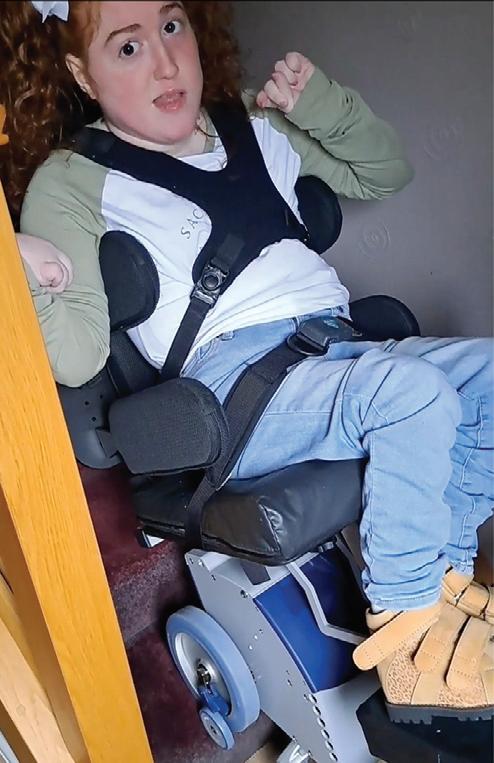
“It was a bit scarey to start with at the top of the stairs, but AAT trained us fully in how to use the stairclimber safely. If Rhianna has a seizure, we just stop until it’s passed and we can resume.”
Adds Gareth Brown of AAT, “Rhianna requires significant support to sit. We had most of the accessories she needed in stores @ Kirklees, so there was only need to purchase a couple of small additions. Her access to all levels of the family home has been made safe, including assessment, equipment and training, for around £1000- a fraction of the cost of other solutions, had they been viable.”
AAT’s re-issue facility for stairclimbers is unique within the sector. It means that- where appropriate- necessary, reasonable and practical changes can be made to make stairs safe for someone with reduced mobility, for <£1000/ £650 pa(1). There are no structural alterations nor permanent restriction of the stairs for other members of the household.
The third annual Care Trends Report 2025 from OneAdvanced, in partnership with Care England, shines a light on the realities facing the care sector today. Based on a survey of 404 multi-site care providers, the findings lay bare the challenges providers say are holding them back, often directly impacting the workforce management and the delivery of care and support.
Staggeringly, almost half (48%) of care providers report they are now effectively ‘working in the dark’ – having insufficient advanced visibility of their organisation – a figure that has more than doubled from 21% last year. This blind spot is forcing many into backward-looking strategies, addressing historical inefficiencies rather than pursuing future-focused solutions.
Nearly half (47%) of providers struggle to track move-ins and move-outs, a critical operational blocker directly impacting the timeliness of care delivery.

Administrative errors are also draining valuable resources, with 78% of providers spending three to- six hours each month amending payroll errors. That’s a sharp increase from 49% the previous year, reflecting a growing burden on already overstretched back-office teams, often pulling focus from more critical care priorities. It seems that employees themselves are bearing the brunt. Almost a third (32%) of providers say they’re unable to offer their employees the right number of hours. Another 22% struggle with scheduling shifts at times that work for staff.
These figures clearly indicate a vital opportunity to support care providers to offer much needed flexibili-
ty, to boost employee satisfaction, meet care demand, and comply with the upcoming changes to employment laws.
Professor Martin Green OBE, CEO at Care England reflected on the findings: ‘This year’s Care Trends Report is a wake-up call for everyone invested in the future of social care. It exposes the pressures faced by providers, from operational challenges to workforce demands, it importantly, highlights the extraordinary resilience and commitment of care provider’s most valuable asset—their people! The highly skilled individuals who work tirelessly caring for some of the most vulnerable people in our society.
Care providers are already facing significant operational challenges in delivering services, upcoming legislative changes are expected to introduce further complexities, putting additional pressure on providers who are already struggling to maintain the status quo. It is essential that we amplify their voices to ensure they receive the right support and solutions needed to sustain their future.’
Ric Thompson, SVP – Health & Care at OneAdvanced, comments: ‘The Care Trends Report 2025 does more than highlight challenges—it amplifies the voices of the millions of people working in care and advocates for decisive action across the sector. The encouraging news is that the report reveals strong momentum and a clear appetite for change. And with the right support and technology, care providers can shift from reactive firefighting to proactive, future-ready care.’
The Care and
Policy experts from some of the Alliance’s 60 member organisations, as well as a range of older and disabled people with experience of drawing on care, plus their unpaid carers and care professionals met with MPs to discuss the current state of social care. They discussed the transformative impact good, reliable care can have, and the issues many people face trying to get the care they need. The Care and Support Alliance also encouraged MPs to engage with the independent commission on social care, and to keep the pressure on Government to support the 3.5 million people unable to get the support they need right now.
Anna Dixon MP, who hosted the event, said: “We must build political consensus on social care, and raise public awareness of how important care and support is. People who draw on and provide care are too
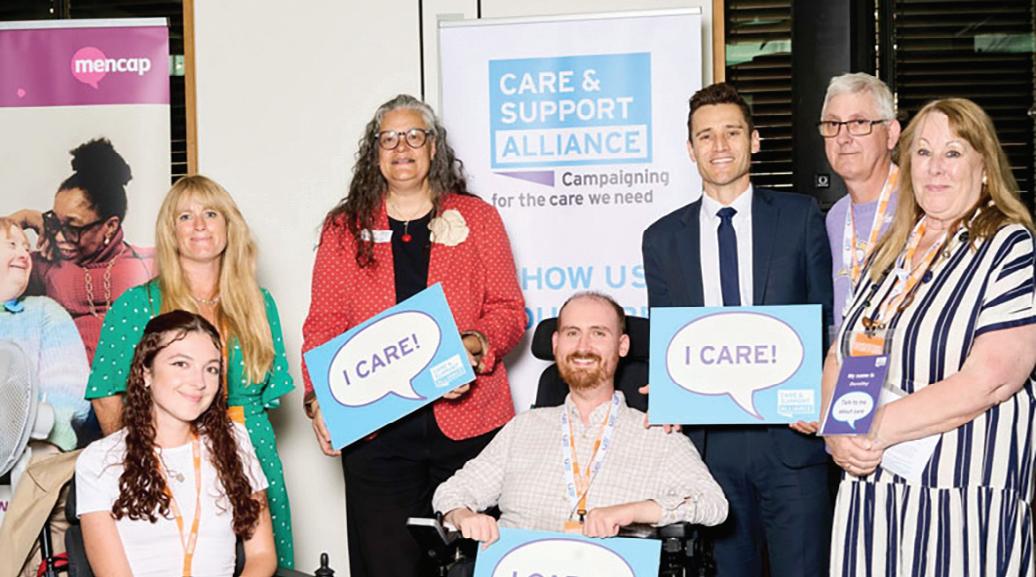
often invisible. We have to change that and celebrate the value of care and support.”


Jack, who receives social care, said: “The less care I get, the less independent I am. There’s a real lack of aspiration for what a good life is for someone with a disability. We need a well-funded, needs-led care system that moves from enabling mere survival to fulfilling lives.”
Emily Holzhausen, Care and Support Alliance Co-Chair, said: “MPs –your voice really matters to us. We want you to hold decision makers to account and work with us to secure a better future for all of us. Investing in care is investing in all of us”
Wondering if your MP was there? Here’s a list of those who joined the Show Us You Care event, or who sent a member of their team on their behalf.
Anna Dixon, Ben Maguire, Ben Obese-Jecty, Bernard Jenkin, Hamish Falconer, Ian Sollom, Jeff Smith, Jo Platt, John Milne, Luke Evans, Mark Garnier, Nick Timothy, Perran Moon, Rebecca Norris, Taiwo Owatemi and Tulip Siddiq

•
• They can be bought as seen or refurbished and sign-written to your own requirements.
• Fully serviced, new mot & warranty
• Engineers inspection supplied if required.
•
•
•


By Steven Hurst, Director of Corporate Learning at Arden University

Effective leadership is the backbone of any successful organisation, but in the care industry, it takes on an even greater significance.
Leadership in care homes directly impacts the quality of care provided to residents, influences staff engagement and drives organisational success. Without strong and empathetic leaders, the consequences can be severe: from low staff morale and high turnover to a decline in care standards and negative outcomes for residents.
With increasing challenges in the healthcare sector, it is vital to understand what constitutes good leadership. Steven Hurst, Director of Corporate Learning at Arden University, explores best practices for effective leadership in the care sector, addressing common challenges and how practices can avoid accidental managers.
THE ACCIDENTAL MANAGERS EPIDEMIC
It’s easy to fall into the trap of promoting high performers into leadership roles, without providing the necessary support or training. However, this can create an ‘accidental manager’, who may lack the skills to effectively lead, motivate or manage a team. Unfortunately, this can then enforce reduced team performance, increased employee turnover and a toxic workplace culture.
The issue of accidental managers is more widespread than we might think. Research shows that 82% of new managers in the UK receive no formal management training. Similarly, 26% of senior managers, and 52% of managers overall, admit they’ve never been provided with structured leadership development opportunities.
Crucially, effective leadership is vital in care settings. While leaders oversee operational processes, ensuring the organisation runs smooth-
ly, they also inspire, motivate and guide their team to achieve shared goals. A great leader doesn’t just set targets; they cultivate an environment where staff feel empowered, valued and supported.
Achieving this balance is critical in care homes, where both logistical efficiency and human connection are key.
PREVENTING ACCIDENTAL MANAGERS
Identifying potential accidental managers before they’re placed in leadership roles is critical. Firstly, it’s important to ensure managers have people skills. This will involve being able to empower others and share the workload effectively. On top of this, care homes are a highpressure environment, which can also take a toll on care staff. Leaders need to recognise the signs of burnout early and implement measures to support mental wellbeing, such as flexible working arrangements, counselling services and open discussions about stress management, which is why people skills are so important. Just because an employee is a top performer, it doesn’t necessarily mean they’re ready for a leadership role – they may need formalised training and support to get there.
Managing a care home involves regular inspections and adhering to strict regulations, so leaders must also be proactive in ensuring the home remains compliant, incorporating regular audits and ongoing training to stay ahead of any potential issues. So, a good leader will also need to take feedback from their team, patients or senior leadership; the inability or resistance to adapt signals a potential gap in leadership readiness.
Strong leadership is not just about operational success; it’s also about nurturing people. Leaders who inspire their teams often see higher engagement levels, better performance and lower turnover rates. This positively impacts care standards, ensuring residents receive the level of support and compassion they deserve. Developing leadership competency is not always instinctive; it often requires self-awareness, training and experience. Here are some qualities that distinguish outstanding leaders in care homes:
• Competency: Understanding care standards, legal responsibilities and sector-specific needs is essential.
• Vision: A strong leader creates and communicates a compelling vision for the future, inspiring others to work towards the same goals.
Empathy: Effective leaders genuinely understand and care about the people they work with, fostering trust and respect.
Decision-making skills: Leaders must weigh risks, evaluate options and make informed decisions in high-pressure situations.
Adaptability: The care sector is dynamic, and leaders need to be flexible, resilient, and open to innovation to meet changing demands.
Creating an environment of empowered, capable leaders in care homes involves investing in leadership development. Unfortunately, a significant number of leaders in the UK receive no structured training.
One effective solution is the implementation of structured development programmes like degree apprenticeships in management. These courses integrate hands-on experience with theoretical learning, ensuring leaders not only understand best practices, but can also apply them in real-world scenarios.
For example, a degree apprenticeship in chartered management can provide a roadmap for developing technical and relational leadership skills tailored to the care sector, while simultaneously allowing employees to earn while they learn. Some learning providers also offer online degree apprenticeships, allowing employees to fit their studies around their work and personal schedules.
Turnover rates in the care sector are notably high, especially for care workers and registered nurses, with some reports suggesting turnover rates of 30-40%. By offering learning opportunities to help employees develop and progress, organisations can begin to tackle this issue –increasing retention by ensuring staff are engaged. Degree apprenticeships will also give workers a chance to obtain a formalised qualification, which may appeal to some employees. On top of this, investing in employee wellbeing and career development also attracts high-quality candidates.
Care homes cannot afford to underestimate the power of effective leadership. Investing in management development and reinforcing a positive work culture can safeguard not only the wellbeing of staff but also the quality of care provided to residents. Through upskilling and offering formalised management training, the care sector can certainly avoid the accidental manager epidemic.
A century-old war veteran was honoured with a prestigious Dutch medal in a moving ceremony at his care home last week.
Arthur “Les” Hammond, who celebrated his 100th birthday in November shortly after moving into Saxon Suite at Burlington Court Care Home, received the Dutch “Thank You Liberators” medal in recognition of his wartime service in the Netherlands.
The special presentation was conducted by Lieutenant Colonel Sander van Hees, Air and Space Attaché at the Embassy of the Kingdom of the Netherlands in London, accompanied by Ms Emma van Schaik, Defence Trainee.
Les served with distinction in the British Army during World War II, seeing action across multiple theatres including Normandy and the Netherlands. His remarkable military service has already been recognised by the French Government, who awarded him the Legion d’Honneur several years ago for his role in the Normandy campaign.
The Dutch “Thank You Liberators” medal represents the Netherlands’
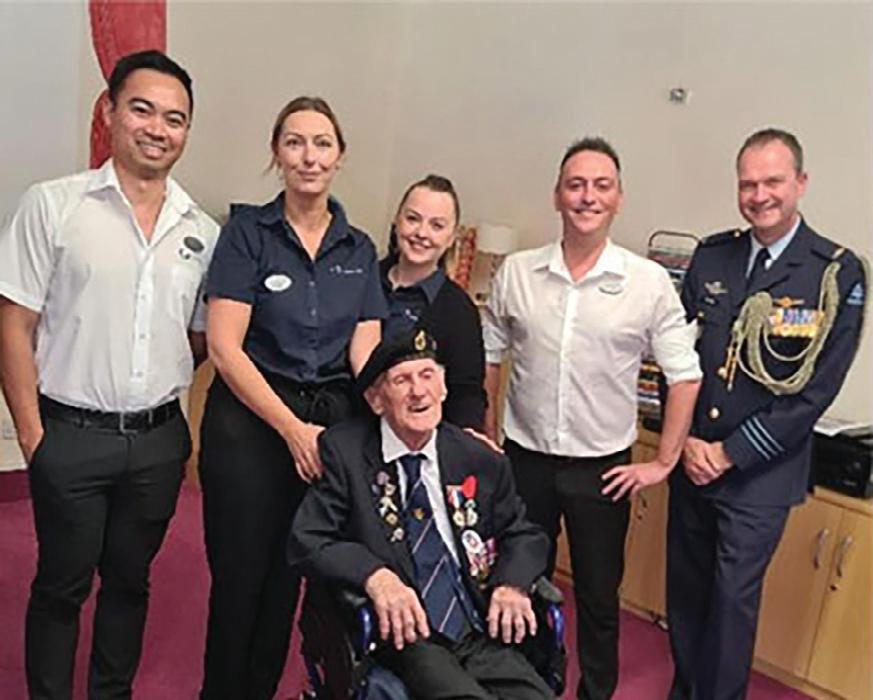
ongoing gratitude to the servicemen and women who helped liberate their country over 80 years ago.
The medal programme was established to ensure that surviving veterans receive the recognition they deserve for their crucial role in freeing the Dutch people from occupation.
The ceremony provided a wonderful opportunity for Les to share stories of his wartime experiences with his family, friends, and fellow residents. Surrounded by loved ones on a beautiful day, Les listened as tales of his service and the places he travelled during the war were recounted.
The presentation highlighted not only Les’s individual courage and sacrifice, but also the enduring bonds between the United Kingdom and the Netherlands, forged through shared struggle and mutual support during one of history’s darkest periods.
For the staff and residents at Burlington Court Care Home, witnessing this recognition of Les’s remarkable service was a privilege and a reminder of the extraordinary lives and experiences of the people in their care.
Residents at an Ilkley home can visit places such as Scotland and the North York Moors without leaving their home thanks to a new train experience.
MHA Glen Rosa have installed the Jolly Journey Train Experience, a new initiative by Little Islands, who specialise in creating unique interactive environments.
The train experience showcases journeys across the UK from the viewpoint of a passenger looking out of the window.
The team from Little Islands installed and decorated a part of the home’s dementia unit and converted it into a train carriage with props such as suitcases, train times and journey information displays.
MHA Glen Rosa provides residential and residential dementia care for 47 residents.
Adam Carling, home manager said: “The Jolly Journey Train experience is a new initiative and one that is proving to be very popular here.

“We have received some great feedback since the experience has been installed.
“Our residents love it, you will often see a number of them sat in the carriage and watching a journey.
“The idea came to me from my area who forwarded it to me, and I decided to look into it.
“I then contacted the team at Little Islands and the whole process took a couple of months from start to finish.
“We are quite privileged here at MHA Glen Rosa, where thanks to the generosity of the local community we are able to provide services such as this for our residents.
“We received a very generous donation via our Legacy Fund which enabled us to go for this experience.
“The location of the experience is really good as it’s in a high footfall area, where both residents and their relatives can sit and enjoy it.
“Alongside the Train Experience, we have also prepared a sensory garden thanks to funds we received.
“I do think this is something other MHA homes can look into having, it’s something quite unique and I do feel other homes will see the benefits just like we have.”
For more information on the Jolly Journey Train Experience, see the advert on the facing page.
UK care homes market attracted record-high investment volumes of £4 billion in the 12 months since July 2024, according to real estate services firm Cushman & Wakefield.
Transactional volumes in the sector reached over £1.75 billion in H1 2025, the highest ever total for a six-month period and 108% higher than H1 2024. Occupancy reached nearly 90% in Q1 2025, driven by limited volatility and consistent demand due to the UK’s ageing population.
US investors are the predominant driver of this activity, accounting for more than 70% of transactions, up from 56% in 2024. This reflects strong international confidence in the UK care homes market, with the country’s ageing demographic profile drawing investors to the sector.
Early indicators suggest that the UK Government’s National Living Wage and Employers’ National Insurance increases – combined with typical timing of annual operator fee uplifts – are driving up Average Weekly Fees (AWFs).
Paid by care home residents and often subsidised by Councils, these fees stood at £1,260 in Q1 2025, the highest rates on record. Preliminary data from Q2 shows that they have continued to rise, driven by the
which took effect on April 1st.
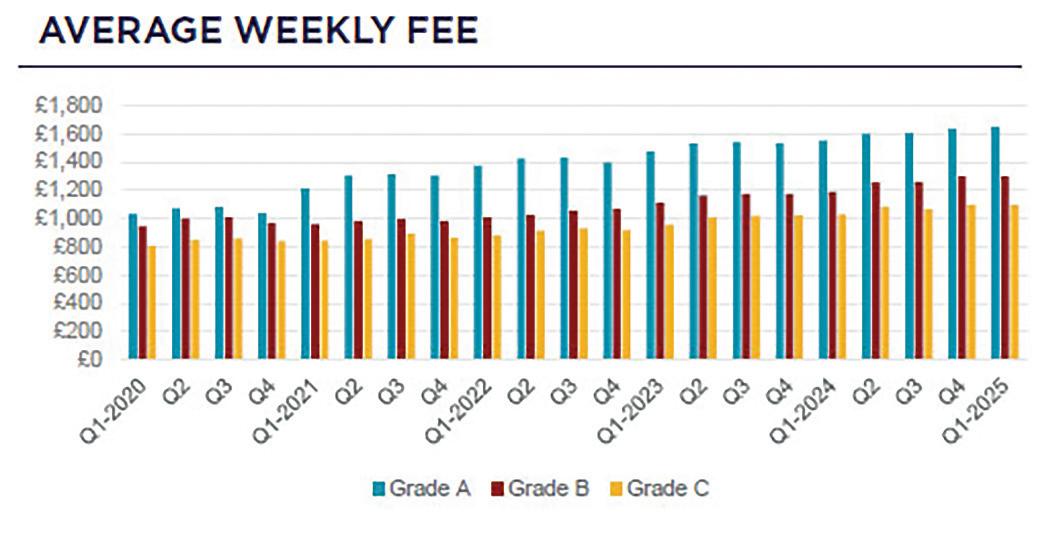
Source: Cushman & Wakefield
The investment environment is characterised by high-value portfolio acquisitions, says Cushman & Wakefield, including the £640 million acquisition of Care REIT plc by CareTrust REIT, as well as growing mid-
market transaction activity – with investors such as Omega Healthcare actively targeting midmarket assets.
Jack Kelleher, Data and Analytics Associate, Healthcare, at Cushman & Wakefield, said:
“Interest and activity in the UK care home market have skyrocketed in the last 12 months, driven in part by strong appetite from US investors.
“US funding sources have dominated the sector in 2025, reinforcing their strong and growing presence with investment across asset grades and structures. Occupancy levels remain robust due to the UK’s ageing demographic profile. Average Weekly Fees showed steady Year-onYear growth, supporting resilient profit margins across all asset grades.
“However, Q2 cost headwinds – notably the National Insurance and National Minimum Wage increases – will impact margins across the sector. In many cases, this additional cost will be passed on, meaning residents are likely to face higher Average Weekly Fees as a result.
“Despite the lower private fee levels and profitability compared to Grade A stock, Grade B and C assets still offer appealing investment opportunities, due to the fragmented ownership and attractive pricing characterising the UK market.”
Skills for Care has unveiled a new nursing preceptorship package designed specifically for adult social care providers in England – a key step in delivering on the ambitions of the Workforce Strategy for Adult Social Care.
The Adult Social Care Workforce Strategy identifies tailored support for the “Small but Mighty” workforce of regulated professionals and registered managers who make up 6% of the social care workforce but make a huge impact on quality of care and support.
Funded by the Skills for Care ‘Small but Mighty’ programme, the package supports providers to develop structured preceptorship programmes for newly-registered nurses and nursing associates working in social care where this type of support is not currently widely developed or standardised.
The new package of support aims to address that gap and is designed to help providers improve recruitment and retention by embedding preceptorship programmes confidently and sustainably within their organisations.
Claire Leenhouwers, National Professional Lead – Nursing, Skills for Care, explains: “As we see a shift in focus from hospital-based care towards community care, and prevention over treatment, there are many opportunities for newly-registered nursing staff to build a career outside of the traditional hospital setting.”
“I’m really excited to offer this programme. Preceptorship is a vital step in building an effective and sustainable social care nursing workforce which is why it’s one of the key recommendations in the national Workforce Strategy for Adult Social Care.
Social care nurses and nursing associates play an incredible role in supporting people to live their lives well, and so it’s crucial they are provided with all the tools they need to be confident and effective in their roles.”
The package from Skills for Care includes a series of virtual events, including an introduction to preceptorship, a workshop for preceptors, and a workshop for preceptorship leads who will lead on embedding and championing preceptorship in their organisations.
The introductory session, delivered in partnership with the Nursing and Midwifery Council, will run on 3 September 2025, with the other workshops taking place on dates through September,
October and November.
Preceptorship leads will also be invited to join a bi-monthly community of practice to network, receive peer support and ongoing guidance on how to continue to embed and monitor the quality of their preceptorship programme.
Marisa Spice, Head of Learning and Development, Nellsar Care Homes says: The Skills for Care offer around preceptorship will make all the difference. Easily accessible, reliable and relevant resources, guidance, and opportunities to attend free events which are not too long. Also, a great platform to network, find out more and feel safe in the familiarity of social care.
Donna O’Boyle, Acting Executive Director of Professional Practice at the Nursing and Midwifery Council (NMC), says: “Nurses and nursing associates working in adult social care are a lifeline for people and communities across the UK. Social care nursing offers a uniquely rewarding career path. That’s why preceptorship is so vital; it lays the foundation for confidence, connection, and professional growth from the beginning.”
“Preceptorship offers newly-registered professionals the structured support they need to build confidence, apply the Code in everyday practice, and feel a part of the team from the very start. At the NMC, our Principles of Preceptorship define what effective preceptorship looks like across all health and social care settings, helping to ensure a consistently high standard of support.”
“We welcome Skills for Care’s tailored package for social care providers. Helping employers embed consistent, high-quality preceptorship will not only support those new to the register – it will also strengthen retention, grow leadership, and help ensure people receive the safe and effective care they deserve.”
Sarah Gilbert, Head of Workforce Strategy Implementation Unit, Skills for Care, adds: “It’s great to be launching this new package of support during the one-year anniversary of The Workforce Strategy for Adult Social Care. The strategy is all about working together and I’m delighted we can use some of the Small but Mighty funding, to join with others from across the sector, on something which promotes safe, confident practice and fosters that strong sense of belonging in social care.”

By Fran Kirke, OneAdvanced’s VP of Care

When I think about the care sector, I think of a community built on connection, empathy, and a commitment to supporting those who need it most. But at the same time, it’s a sector facing immense pressure – growing demand, operational inefficiencies, and stringent regulatory compliance.
And amongst the biggest digital transformation care has seen, artificial intelligence is now set to play a growing role. So, it’s natural to wonder, how will this blend of care and technology work? More importantly, how should it work for those living and working in the sector?
From my conversations with care professionals at the recent Care Show London, it’s clear to me that the sector is cautiously optimistic about the potential of AI but insists we tread carefully, putting people before processes. And I couldn’t agree more.
If there’s one sentiment that echoes throughout the care sector, it’s this: AI should not replace people, it needs to empower them. With the right approach, AI solutions can remove burdensome admin tasks, giving care workers what they desperately need more of—time. Time to focus on the people they support. Time to provide personal, meaningful interactions that shouldn’t be sacrificed under the weight of endless paperwork.
AI can be used to handle reporting, summarise care notes, or even support with local authority tenders. By taking these tasks off workers’ plates, AI can help free up time to focus on care itself. Some people I spoke to described it as giving them the bandwidth to ‘care more deeply’. However, there was understandable concern from some that this should never mean ‘automation at all costs’. People want assurances that AI won’t become an invisible decision-maker, introducing risks by sidelining human judgement. Because what good is tech for the sake of tech in a sector like social care, if it doesn’t put human needs at the forefront?
The care sector is understandably risk-averse, and for good reason. We’re dealing with people’s health, wellbeing, and livelihoods so it needs to be closely protected.
So, for providers to have confidence in AI, it must earn the trust of all people living and working in care. And it often starts with security. As you know, the care sector handles sensitive data, governed by vital regulations. Therefore, AI must hold up under scrutiny here, ensuring personal data is not misused, vulnerable
to breaches or public access.
And to further build trust, education also emerged as a priority. If we want the care sector to see AI as a partner rather than a threat, we’ve got to demystify it. Training programmes and transparent communication will be key to show care teams not only what the technology can do but also that it’s here to work with them, not against them.
One phrase always resonates with me when talking about AI within care circles: ‘human in the loop’. For all the efficiencies AI promises, there’s no replacing the insight, intuition, and compassion of a trained professional.
AI could assist with early detection of health issues by analysing patterns in client data or flagging anomalies. But the final call, the decision to act, should always rest with a qualified care professional.
The same applies to personal interactions. AI might recommend adjustments to a care plan based on behavioural patterns, but it cannot recognise the subtleties of someone’s emotions or what they’re not saying with words. Keeping human oversight ensures that any system can remain empathetically rooted in the care sector’s core mission – to provide person-centred care.
After speaking to many professionals in the sector, it reinforced to me that this balance is key. We should leverage artificial intelligence to eliminate inefficiencies while reinforcing, not replacing, human expertise.
Despite the concerns, there’s immense optimism about what AI can achieve for care. And by streamlining operations, many in the sector see AI as a missing puzzle piece.
From analysing information from multiple sources, to predicting trends or identifying gaps, AI could bring reduced inefficiencies and perhaps even improved care outcomes.
And yet, a recurring point raised is caution around how quickly we implement these technologies. The fear isn’t AI itself, but the lack of sufficient guidance around it. Thoughtful, deliberate action is therefore needed to ensure safe and ethical adoption.
At the end of the day, care is deeply personal, often intimate work. So of course, people within the sector are right to protect it fiercely. The introduction of AI must respect this, acting as a supportive partner rather than a disruptive force.
With empathy, education, and a critical focus on safety, we can position AI as an enabler of better care. AI is already proving it can help us rise to the challenges we face. And by keeping humans in the loop, safeguarding trust, and listening to the sector’s voice, we can help ensure AI supports the care sectors’ needs, empower care professionals and support care delivery.
Hospices across the England are set to receive a 375 million boost to modernise facilities and deliver major upgrades.
The government has announced an increase in funding to support improvements in end-of-life care to deliver major upgrades and enhancements to facilities including separate family rooms, solar panels to reduce energy costs and communal lounges.
More than 170 hospices across England will receive a share of the funding – the largest cash injection ever – to ensure patients receive the highest quality end-of-life care in comfortable, dignified surroundings.
It follows a £25 million boost in February, delivering the government’s £100 million investment confirmed in December. This is already supporting urgent building repairs and creating warmer, homely spaces.
This cash marks a further step in the delivery of the government’s Plan for Change, improving care in the community where people need it most.
Hospices include Wigan and Leigh – visited by Health Minister Stephen Kinnock last week – which used its funding to replace a flat roof which was leaking. It will use the additional funding to replace its heating system – helping create a better, more comfortable environment for patients and enabling staff to deliver higher quality care.
Minister for Care Stephen Kinnock said: “Hospices play a vital role in our society by providing invaluable care and support when people need it most.”
“At this most difficult time, people deserve to receive the best care in the best possible environment with dignity”
“I have seen first-hand how our funding is already making a real difference to improving facilities for patients and families. This additional funding will deliver further upgrades, relieving pressure on day-today spending.”
“End-of-life care is crucial to our 10 Year Health Plan and our fundamental shift of moving more care out of hospital and into the community. We will continue to support hospices so they can deliver their vital work”
OTHER IMPROVEMENTS ALREADY MADE AT HOSPICES ACROSS THE COUNTRY INCLUDE:
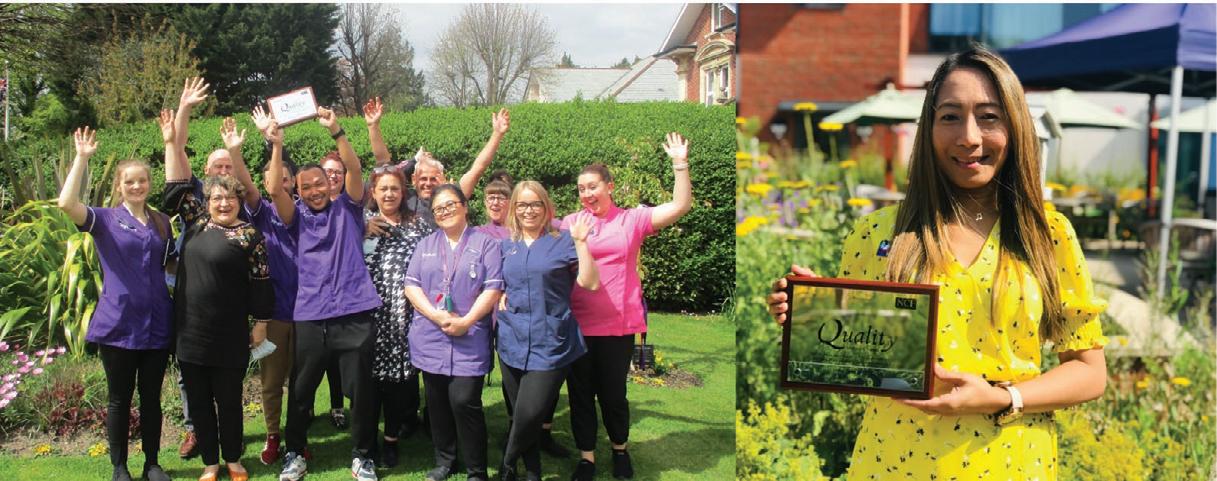
• Major building works and modernised facilities
• Digital transformation to improve data sharing between healthcare providers
• Development of outreach services to extend care beyond physical buildings
• Creation of more welcoming spaces for families, including outdoor areas
• Energy efficiency measures to improve sustainability
The new cash injection is for the financial year 2025/26 and will be distributed by Hospice UK to hospices. Hospices have been allocated a pot of funding and will be able to proceed with upgrades, invoicing Hospice UK once work has been completed.
Toby Porter, CEO of Hospice UK, said: “The announcement in late 2024 of £100 million in capital funding for hospices was welcome recognition from the government of the immense pressure facing hospices, and their urgent need for more financial support.”
“We were pleased to distribute the first £25 million of this funding early in March. We know this money has made a huge difference to hospices and the next £75 million will continue to help them invest in their buildings, facilities, and digital infrastructure.”
“While this one-off investment has been very welcome, it’s critical that we continue to work with government to secure long-term reform to ensure hospice care is there for everyone who needs it, whoever and wherever they are.”
“The government has just emphasised the importance of hospices in their 10 Year Plan for the NHS and the role they can play in shifting care from hospitals into the community. With the right support, there is so much more they can do to realise the vision set out in the 10 Year Plan. We look forward to working with government to make this a reality.”
Matthew Reed, Chief Executive of Marie Curie said: “Marie Curie welcome this grant funding, which we will be investing in helping to ensure people living with terminal illness are well cared for across England –whether in our hospice buildings, or in their own homes through improvements in use of digital technology.”
“We look forward to working with the Government to ensure longer-term funding is put in place to ensure the best possible palliative care is sustainably available for everyone who needs it, including in their new neighbourhood health centres in the most deprived communities.”
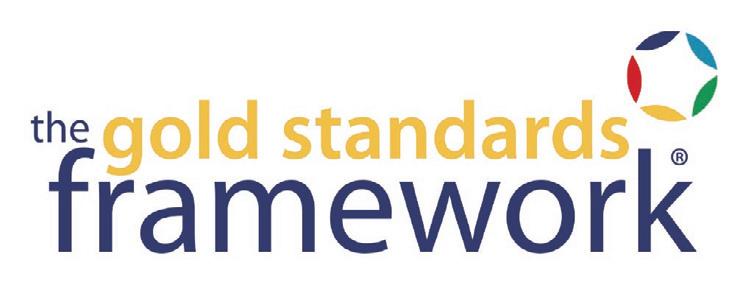
In its 33rd Report of Session 24-25, the cross-party House of Lords Secondary Legislation Scrutiny Committee has once again expressed concern about the lack of information provided by the Home Office in support of measures which make significant changes in immigration policy.
The report comes after the Committee considered the department’s latest Statement of Changes in Immigration Rules (HC 977) – the “Statement”.
First, the Statement implements changes to the Skilled Worker visa route by tightening the conditions for granting such visas and removing the social care sector from the list of occupations that can recruit migrant workers. This will have a wide impact, affecting around 180 occupations.
The report highlights the lack of any consultation exercise in advance of these changes and that no impact assessment (IA) has been carried out. The lack of an IA is particularly regrettable given the changes are likely to have significant economic effects.
Its absence suggests that the measures in the Statement were formed before these effects had been fully analysed and understood. Moreover, the lack of an IA makes it impossible for the Committee to
fulfil its duty to scrutinise the Statement. The Home Office accepted that its approach “should not be common practice”. The Committee has called on the department to publish the IA by the end of the current Parliamentary summer recess.
Second, the Statement closes two schemes that assisted Afghans who supported UK operations and aims in Afghanistan to resettle in the UK. A submission to the Committee argued that this would mean “permanently abandoning” people who need support, particularly in the context of information about a data leak in February 2022 revealed by the recent lifting of a superinjunction. In response, the Home Office told the Committee that the majority of those who are eligible had already applied under the schemes, and that 95% of current applications are being found to be ineligible.
The report draws the Statement to the special attention of the House on the ground that the explanatory material laid in support provides insufficient information to gain a clear understanding about the instrument’s policy objective and intended implementation.
Lord Watson of Invergowrie, Chair of the Secondary Legislation Scrutiny Committee, said: “It is a point we have made repeatedly, particularly to the Home Office, that whenever the Government lays legis-
lation which potentially has significant real world consequences, it must provide information on the impact. Despite acknowledging this to be correct practice, the Home Office has again failed to provide adequate supporting information on the effect of these changes.
“The restrictions on Skilled Worker visas are expected to lead to a drop of 40% in the grant of these visas. The effects on the care sector may be particularly acute. It is inexplicable that information on the impact of this was not included in the Explanatory Memorandum accompanying the Statement.”
“We are severely hampered in fulfilling our parliamentary scrutiny role as a Committee, on behalf of the House of Lords, when we are not given the level of detail necessary to enable effective scrutiny of secondary legislation and we will continue to highlight examples where departments fall short of this obligation.”
“The Minister has told us that an Impact Assessment will be published as soon as possible. We have called on it to be published before the end of the Parliamentary summer recess and we will not hesitate to ask the Minister for an explanation if our calls are ignored.”
HC-One’s Mossdale Residence Care Home in Burnholme, York, proudly hosted a Dementia Support Coffee Morning and Social Event in support of the Alzheimer’s Society, welcoming residents, family members, and the wider community to join in a meaningful day of support, understanding, and togetherness.
Held in the home’s spacious communal lounge, the event provided a safe and friendly environment where people could share their experiences of dementia, connect with others, and learn more about the condition and the resources available for those affected by it.
The morning featured a variety of activities designed to foster connection and engagement, including:
A selection of homemade cakes and refreshments, lovingly prepared by the Mossdale catering team.
Information stands offering leaflets and guidance from local and national dementia support organisations.
Friendly one-to-one chats with members of the Mossdale care team, who shared advice and insights into dementia care practices.
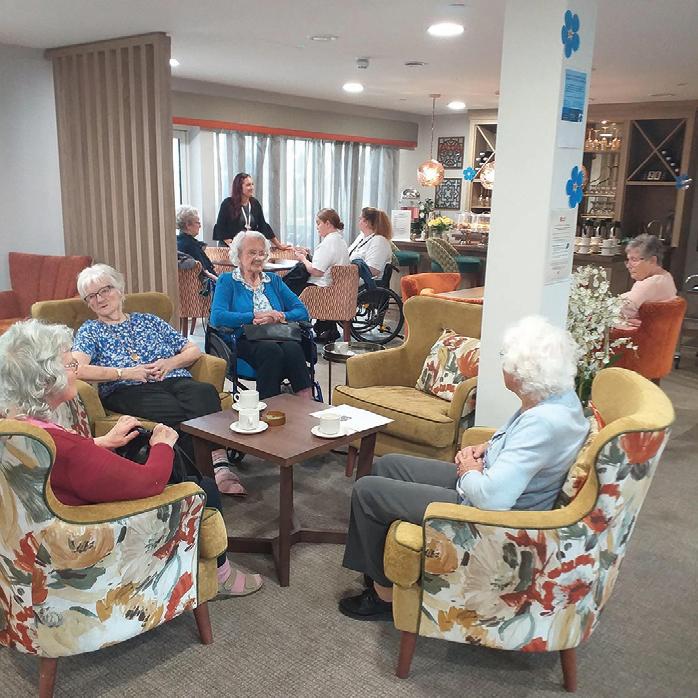

A warm and inclusive atmosphere, designed to put attendees at ease and encourage open conversations about a condition that affects millions across the UK. Visitors also had the chance to learn about the specialist dementia care provided at Mossdale Residence, and how the home creates a supportive, stimulating environment for those living with memory loss and cognitive decline.
Julie Banks, Home Manager at HC-One’s Mossdale Residence Care Home, said:
“We were delighted by the incredible turnout and support from our local community. Dementia affects not just individuals, but families and loved ones too and events like this help build a strong network of support, understanding and compassion. We’re proud to be part of a care group that champions awareness and education.”
The Dementia Support Coffee Morning events are held monthly at HC-One care homes located in York including Mossdale Residence, Handley House and Ebor Court on the fourth Thursday of every month, 10am – 12pm, alternating venues between the three homes.



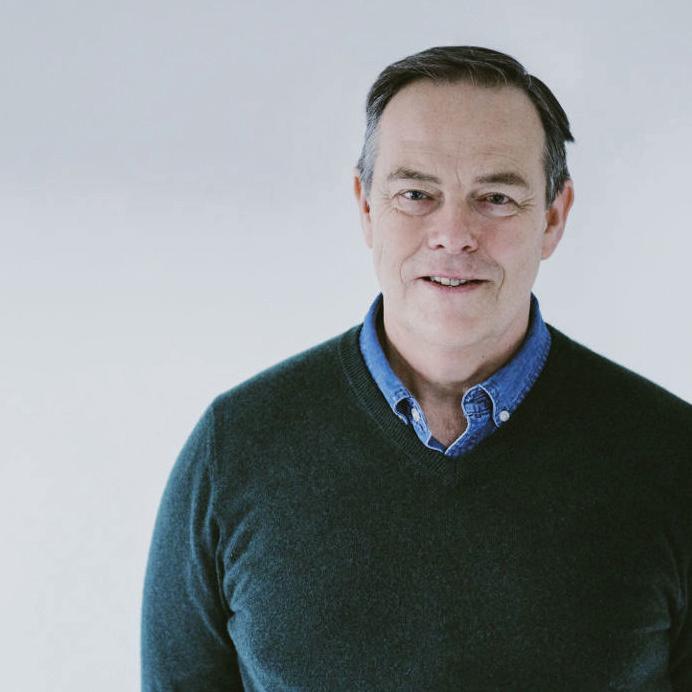
When you're delivering mental health support across the vast Scottish Highlands, every minute counts. Centred, Scottish Highlands leading charity for mental health, has implemented technology to support workers and transform paper-based processes. FROM SPREADSHEETS TO DIGITAL SOLUTIONS
Centred has been supporting people with mental health challenges since 1987, when it began as Birchwood Highland. Following their 2022 rebrand, they now operate a 23-bed residential recovery unit in Inverness, provide home care services in Caithness, and run Recovery Colleges in three locations.
Like many care organisations, they were managing everything through traditional methods—spreadsheets for staff rotas, paper-based care plans, and manual record keeping. The system worked to a point, but when Covid-19 hit and working patterns had to change rapidly, processes had to adapt.
The transformation came through partnering with The Access Group (www.theaccessgroup.com), implementing care planning and people planner systems. The impact has been substantial.
Care workers now have everything they need accessible through their mobile devices. Client information, care plans, and schedules are all available at their fingertips. The system even integrates with mapping applications, allowing care workers to easily locate homes in remote areas where postcode coverage can be unreliable, saving valuable time.
"By digitising our service, it has resulted in staff requiring fewer visits to the office as they now have everything at their fingertips," explains David Brookfield, Centred's Chief Executive. "Scheduling has been a life saver and the added protection measures within the system ensure there are no conflicts."
Digital solutions now support staff in their daily work, allowing them to focus more on the people they're helping rather than administrative tasks.
The improvements extend beyond convenience. Brookfield describes the changes as delivering "better management, more organisation, and better communication with regards to support plans and daily allocations."
Staff satisfaction has increased notably—partly because scheduling conflicts have virtually disappeared, but also because workers have more flexibility in how they organise their time. In rural Scotland, where recruiting and retaining skilled mental health professionals is challenging, this kind of improvement in working conditions makes a genuine difference.
The timing of this digital transformation has been perfect. Centred is planning to expand into rural Highland areas where other organisations have struggled to establish sustainable services. Their Recovery Colleges are also growing their impact across local communities.
"Our aim is to be totally electronic in terms of our data recording and administration, and Access has enabled us to almost achieve this," explains Brookfield. "We want to improve administrative effectiveness and efficiency and to reduce our overhead costs."
This isn't simply about modernisation—it's about freeing up resources for direct care. Every hour saved on administration is an hour that can be spent supporting someone through their recovery journey.
Anisa Byrne, General Manager of Care at The Access Group, reflects on the collaboration: "We're incredibly proud to be supporting the dedicated staff at Centred in their vital work across the Scottish Highlands. Their commitment to improving mental health services in rural communities aligns perfectly with our mission to empower care organisations through technology. We look forward to continuing this partnership as they expand their reach and impact."
For other care organisations across Scotland facing similar challenges, Centred's experience offers genuine hope. Their success demonstrates that digital transformation doesn't require wholesale change—it requires thoughtful implementation that prioritises the needs of both staff and service users.
In a sector facing increasing pressure, Centred's approach shows how practical technology solutions can strengthen the human connections that lie at the heart of effective mental health care.
Birchwood Grange Care Home, part of Avery Healthcare, welcomed 15 students from St Dominic’s Sixth Form College for a full-day garden transformation and intergenerational connection, transforming the outdoor space into a vibrant haven for residents.
Staff and residents at Birchwood Grange Care Home in Harrow regularly welcome visitors from their local community, including local schools and nurseries, to the home for open days and themed events. In July, they greeted students from St Dominic’s Sixth Form College. The visit was organised in collaboration with the charity Attend, which regularly supports Birchwood Grange Care Home with volunteer initiatives. This visit marked a special day as a new group of students rolled up their sleeves to rejuvenate the garden outside the home’s Ash and Beech units — even braving the rain to get the job done.
Speaking of the day, Kerry Richards, General Manager at Birchwood Grange Care Home, stated,
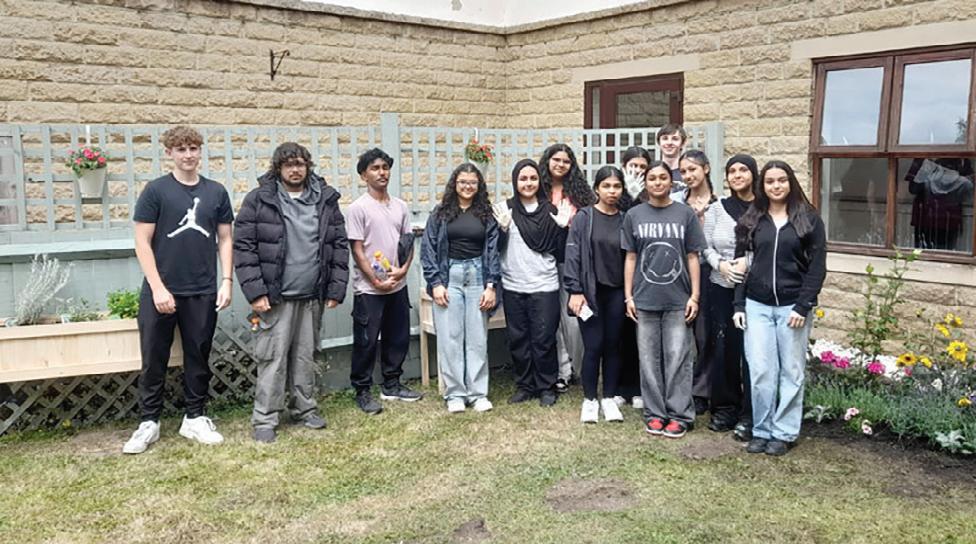
“It was wonderful to see the enthusiasm and care these students brought with them. The transformation was incredible, and more importantly, the joy it brought to our residents was priceless. We’re so grateful
to St Dominic’s Sixth Form College and to Attend for helping make this happen.”
Over the course of the day, the students created a sensory garden filled with lavender, rosemary, and other herbs and supported residents in participating in gardening activities.
The revitalised space has already made a big impact. It is now a designated area for outdoor dining and resident activities during the spring and summer months. The home has also purchased new watering cans to enable residents to participate in maintaining the garden, with many now proudly referring to themselves as part of the “gardening team.”
Naomi Ross, Assistant Principal at St Dominic’s Sixth Form College, said, “Thank you for such a wonderful day, which our students were able to have. Thank you so much to David for organising so much and for enabling our students to volunteer, and to Kerry and the team who made us feel so welcome. Our students gained a lot from it and were reluctant to leave.”
Resident, Patricia Hicks stated, “It’s lovely to sit out here now. I helped plant the lavender, and I like watering it every morning. It’s peaceful and smells beautiful!”
In a heartwarming display of intergenerational engagement, eightyear-old Spencer Whittenham from Burton has embarked on a unique mission: teaching older residents the joys of modern gaming. This initiative highlights the benefits of activities between young and older people, and the crucial importance of keeping them connected in an increasingly digital world.
Spencer, a keen gamer himself and owner of global YouTube channel Spencer Arcade (https://tinyurl.com/d97bad8r) noticed a gap in digital literacy and social interaction among some older members of his community and inspired to make a difference, he began volunteering his time at local community centres and care homes, offering personalised gaming lessons to seniors eager to learn.
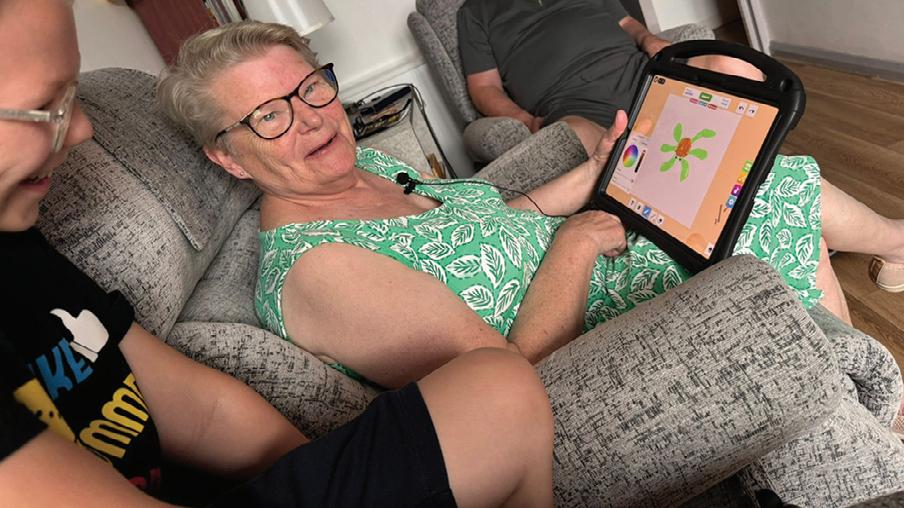
From navigating virtual worlds in Roblox to mastering simple puzzles, Spencer patiently guides his new friends through the digital landscape, fostering a sense of achievement
and fun.
"It's really cool to see them laugh and get excited when they win a level," says Spencer. "Gaming isn't just for kids, it's for everyone and it's fun to teach."
The initiative has quickly gained traction, with participants reporting not only improved digital confidence but also a significant boost in mood and social interaction.
"I never thought I'd be playing video games at my age, but Spencer makes it easy and enjoyable," commented Ireene Bower, 78, a participant at Carlton Court retirement village in Burton. "It's wonderful to connect with the younger generation and learn something new. It really brightens my day."
"The importance of keeping older people is so important," said Spencer’s dad Jason. "Isolation can have serious impacts on health and happiness and I’m really proud that Spencer's own initiative is a brilliant example of how simple, creative ideas can make a huge difference in fostering vital connections.”
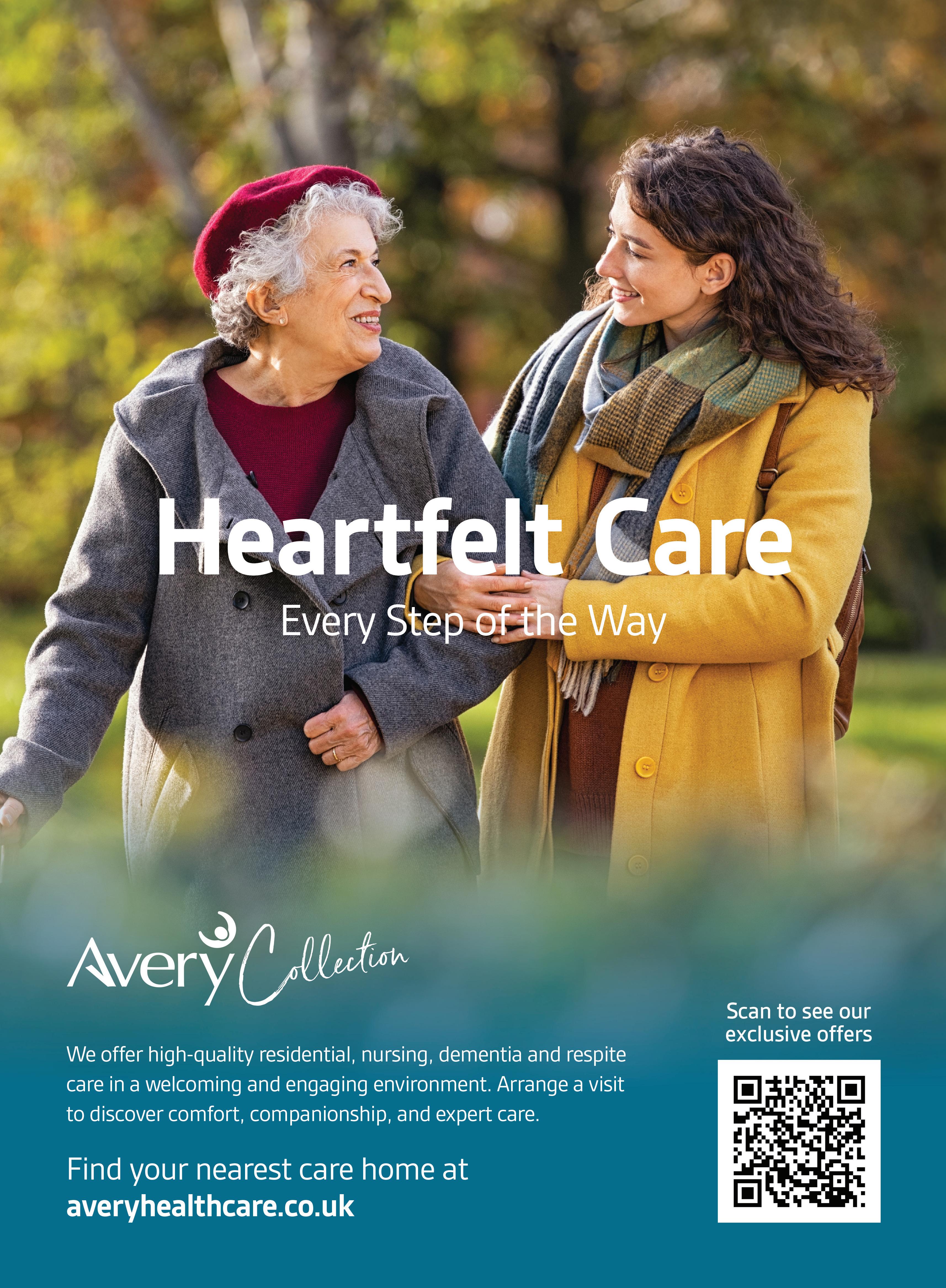
By David Dominy, CEO at The Royal Alfred Seafarers’ Society

When we think about what keeps us healthy and happy, we don’t always give outdoor spaces the credit they deserve. But there’s growing evidence that spending time outside has a huge impact on our physical and mental health, especially for older people who might find themselves indoors more often.
Research shows that interaction with nature can deliver benefits for people experiencing depression and/or sudden mood changes.
A walk in natural surroundings lift your mood, cuts stress, and gives you back that sense of purpose. If you’re struggling with depression or sudden mood swings, time outdoors provides real benefits alongside other treatments.
The magic number seems to be 120-150 minutes a week in natural settings - that’s when you see the best results for physical and mental health. We’re not talking about just glancing at trees through a window, but getting outside to breathe fresh air, feel the sun, and connect with nature.
For older adults, anything that encourages independence, wellbeing, and staying connected with others holds immediate value. Outdoor activities are brilliant for all three, which is why they can be such an essential element for the lives of residents.
SUPPORTING INDEPENDENCE THROUGH OUTDOOR ENVIRONMENTS
At The Royal Alfred’s nursing home, Belvedere House, we’re lucky to be nestled in 14 acres of beautiful Surrey countryside. This means our staff and residents can get outside every day and experience what nature does for you. Many of our residents have health issues that come with age, so outdoor time often means gentle walks or wheelchair trips to our Northfield Pond. There, residents love watching
birds with family or carers, or just enjoying the seasonal flowers and changing scenery.
Again, this is encouraging an independent way of life – but also having a positive effect on cognitive health. It’s been shown that nature walks, birdwatching and gardening can all help with memory, concentration and keeping the brain active, while also keeping the body moving.
The independence of getting out and about matters enormously for older adults to live fulfilling lives. It means them making their own choices about daily activities, staying in control, and remaining engaged with the community. For families looking at care options, it’s crucial that they ask how each service supports their loved one’s ability to manage tasks independently or with just a little help. And having access to outdoor space can be central to this.
BUILDING FRIENDSHIPS AND BELONGING
There’s another side to outdoor activities that’s crucial for improving the lives of residents: the sense of community.
Communal spaces like lounges and dining areas naturally bring people together, but outdoor environments offer something specialshared experiences in fresh air and natural light. Just think of outdoor group activities like arts and crafts, gardening and exercise classes.
At Royal Alfred, we focus on these social connections by planning outdoor activities that bring people together. Garden parties create chances for residents to bond over shared interests while enjoying being outside. These activities often start conversations and friendships that carry on long after the organised sessions end.
Many of our residents have maritime backgrounds, which creates a natural love for outdoor spaces. Having spent careers on the open seas, many find comfort in environments that remind them of the wideopen spaces and fresh air they knew at work. This connection adds even deeper meaning and helps residents feel more at home.
IMPROVING PHYSICAL WELLBEING THROUGH OUTDOOR ACTIVITIES
Regular physical activity remains vital for health at any age, including people in their 80s and 90s. Doctors increasingly recommend outdoor activity more often to their oldest patients, understanding its wide-
ranging benefits.
Research from the National Institutes of Health shows that regular access to outdoor environments can reduce depression and anxiety symptoms while improving overall wellbeing in older adults. A 2020 study of people with knee arthritis found that walking regularly for up to 30 minutes helps protect joints and strengthen muscles - benefits that last well beyond the exercise itself.
These findings match what we see every day at Belvedere House. Residents who join outdoor activities often show improved mood, better sleep, and increased social engagement. The combination of physical movement, fresh air, and natural surroundings creates a powerful therapeutic environment that supports health in multiple ways.
OUTDOOR INITIATIVES AT ROYAL ALFRED
Building more activity and movement into care routines can help reverse some medical conditions, restore physical ability, address mental health concerns, and increase overall wellbeing. At Belvedere House, our care staff constantly support residents with varying mobility levels, offering chair-based exercises, walking groups and gentle stretching routines that work well in outdoor settings.
Maintaining physical health is vital for day-to-day independence in care homes. By offering varied exercise options and a supportive environment, it helps residents stay active, engaged and as independent as possible.
NATURE’S HEALING POWER
Of course, not all care homes have extensive outdoor space, particularly those in cities, but you can find natural beauty throughout the UK. Even local parks can provide significant benefits when thoughtfully included in care routines.
We recognise this is as a crucial element in our care. The evidence supporting outdoor activities continues to grow, backing up what many of us instinctively know about nature’s healing power.
Taking time to reflect and look after our emotional and physical wellbeing remains important at every stage of life. Embracing the power of the natural world offers one of the most accessible and effective ways to support health, happiness, and human connection - benefits that prove invaluable in care settings and beyond.
Gareth Lewis at Chacombe Park care home in Chacombe, Banbury has been crowned Maintenance Champion for the Central Division in the Barchester Care Awards 2025 and is through to the national round of judging.
The Barchester Care Awards celebrate the staff who go the extra mile for the benefit of the 13,500 residents living in Barchester’s 267 care homes and private hospitals across the country. Categories range from ‘Registered Nurse of the Year’ and ‘Carer of the Year’ to ‘Dementia Care Champion’ and ‘Activities Coordinator of the Year’.
Over 5,000 nominations were received from homes and hospitals across the UK. All entries were a very high standard and Gareth Lewis is over the moon to have been named the winner for the Central Division beating hundreds of other nominees.
Gareth Lewis said: “It’s wonderful to know so many people voted for me, it was a
A family-run West Devon care home has joined the elite few UK social care settings to have adopted of the acclaimed ‘Butterfly Approach’ – establishing an exemplary dementia care culture where people can thrive.
West View Care Home, in Bere Alston, recently completed the significant 18-month transformation to provide a more personcentred care model and elevate its “excellent” offering even further.
Following rigorous monthly support with the team at the 28-bed home, along with those who live there, West View received accreditation in the prestigious Butterfly Approach from Meaningful Care Matters. The care and culture consultancy group specialise in focusing on the development of resilient, relationship-centred cultures of care shaped by the people living and working within them.
The Butterfly Approach has a meticulous focus on creating a culture where people are ‘free to be me’. It values emotional intelligence and the core belief that everyone has a unique story that has meaning and matters. It also encourages care providers to put the focus back on the people they care for and their emotions, by engaging in the reality of people’s lived experience in the ‘here and now’.
The transformation at West View included splitting the home into two separate living areas – Wren and Robin – where people with earlyonset dementia or without dementia live together and people who experience more complex needs or later stage dementia live together. This fundamental change to a small household approach has enabled holistic care to flourish, where emotions-based care is balanced with clinical care best practice.
The home has also been decorated with vibrant colours and murals to bring warmth, with items of interest all around representing each individual and their life story – what Meaningful Care Matters calls the

pleasant surprise being nominated, and being awarded for simply doing my job.” As the winner for Central, Gareth is through to the national finals in which the overall winner is decided. They will join winners from across the UK at a special awards event in October to celebrate their outstanding achievements and discover if they have won a national award.
General Manager, Shaju Paul, said: “This is an amazing achievement and the whole home is supporting Gareth. We are so proud of him. He deserves all the recognition for his daily support of our home, and the continued safety of its residents, staff and visitors. In his role, Gareth provides guidance and support to his immediate team and colleagues across the region, everyone wishes him all the best for the nationals.”
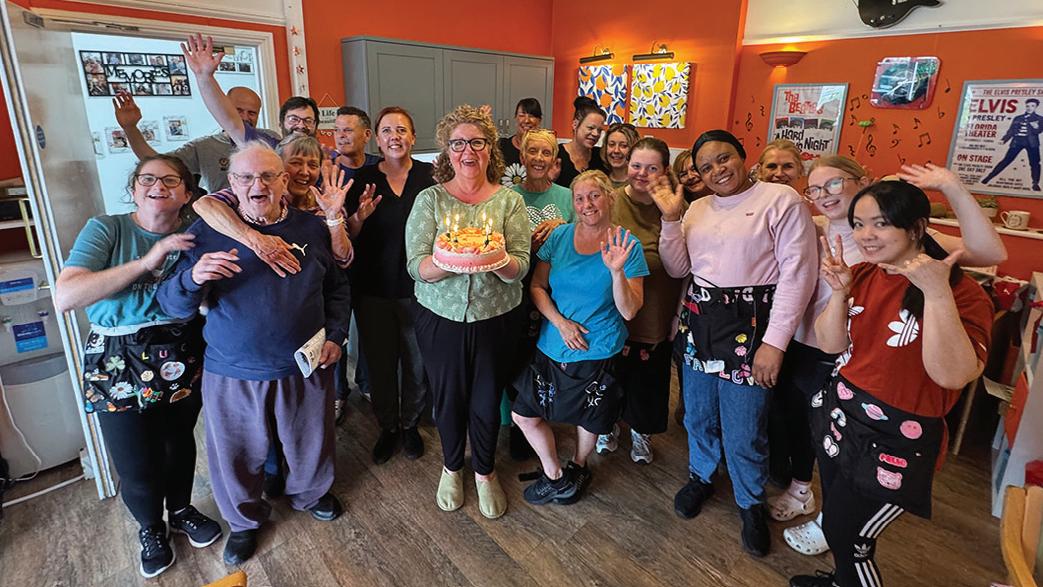
‘stuff of life’, creating a family atmosphere.
Diane Kehoe, Manager at West View Care Home, said: “As a secondgeneration family-run business, we always aspire to create a stimulating, engaging and enjoyable environment – and the Butterfly Approach has provided us with the platform to offer that around the clock. I was already familiar with the approach and saw the potential West View had in achieving it. The transformation was not easy, and we had a few challenges along the way, but the rewards upon completion have made it so worthwhile.
“We believed in the whole process from the outset and the staff embraced it – showing so much patience and kindness. They treat the residents like family, enjoying life together with lots of laughter and fun. When you step into the home now you can really sense the buzz of the place, and the level of care is both phenomenal and heartwarm-
ing.”
The overall findings from Meaningful Care Matters during a final audit last month identified the home as “excellent”, offering a highly engaged service that prioritises meaningful moments and where emotion-focused care is consistently seen, felt and heard in interactions with people. It also reported that individuality and self-expression are encouraged within the home, allowing people to freely be themselves.
Peter Bewert, Managing Director of Meaningful Care Matters, said: “West View has transformed into a truly wonderful home. The team have clearly embraced the desire to change and have achieved amazing results, being guided and supported by Diane. They have also lifted their CQC rating from ‘Requires Improvement’ to ‘Good’ and are aiming over the course of the year to reach ‘Outstanding’. They have also been supported by the local service improvements team, who were so impressed at the transformation that they plan to use West View as a role model for other homes.”
Peter continued: “The journey has been incredible. From what we would call a ‘traditional’ care home, West View has come alive and now has a genuine feeling of family, togetherness, love and purpose for the people living there.”
The home aims to continue elevating its high standard of care, with ambitious plans to be acknowledged and approved by the National Dementia Care Accreditation Scheme. It also plans to achieve the ‘gold standard’ for end-of-life care by the Gold Standards Framework.
For more information on West View Care Home, please visit https://westviewcarehome.co.uk/.
For more information on Meaningful Care Matters and its cultural transformation models, visit https://meaningfulcarematters.com/.
A Welsh care home boss has invited the First Minister to come on a visit to see at first had the threat to services caused by the ban on overseas workers.
Kevin Edwards, a director of Gwynedd-based Meddyg Care, wrote to Eluned Morgan to warn of the “potentially devastating impact” of the UK Government’s decision to end the Health and Care Worker visa.
According to Mr Edwards, whose company operates two care homes in Porthmadog and Cricieth and specialises in dementia care, there was a real risk of care homes and domiciliary care companies being forced to close.
The crisis, he said, was particularly acute in rural areas where it was increasingly difficult to recruit local workers.
The scale of the problem was underscored by official statistics which showed that 15 per cent of registered care workers in Wales were born outside the UK.
In his letter Mr Edwards urged the First Minister to put pressure on the Westminster Government to either reverse the policy or introduce a transitional scheme for critical workers in social care.
At the same time, he wants to see more investment in training and pay levels to attract and retain local workers.
He’s also calling for stronger measures to safeguard international workers from exploitation.
Mr Edwards said: “The social care sector in rural North Wales is
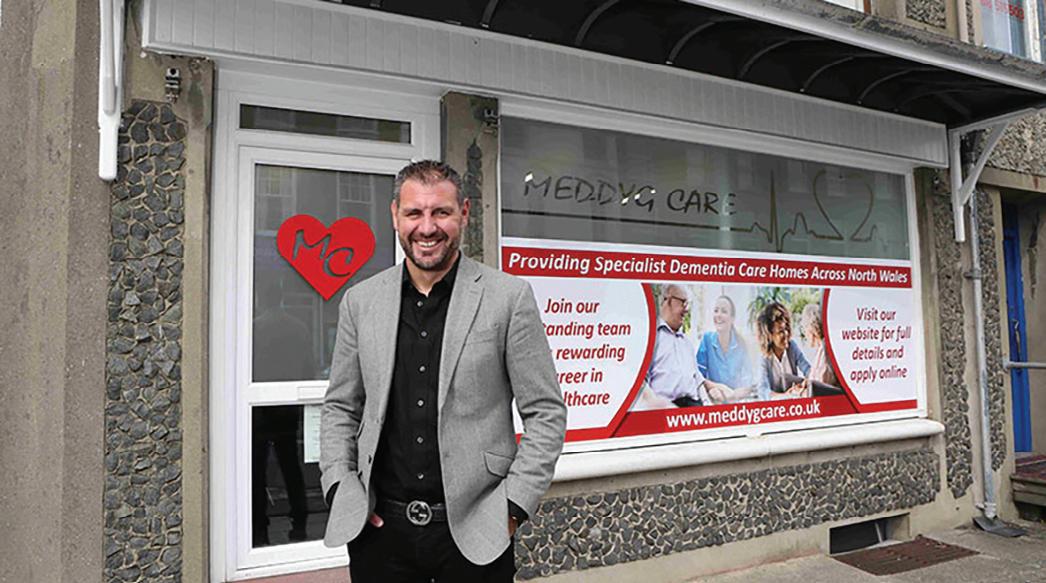
already under significant strain, grappling with high vacancy rates, an ageing population, and limited local workforce availability.
“The Health and Care Worker visa has been a critical lifeline, enabling care providers to recruit international workers to fill staffing gaps.
“The withdrawal of this visa will exacerbate existing challenges in rural North Wales, where geographic isolation and a smaller pool of domestic workers make recruitment particularly difficult.”
Figures show the ban on care workers bringing dependants, which
was implemented in March last year, has already led to an 83 per cent decline in visa applications, with monthly applications dropping from 129,000 to 26,000 in a year.
Mr Edwards added: “This sharp reduction demonstrates the policy’s immediate impact, and the complete termination of the visa route will likely deepen the crisis.
“Moreover, the care sector in rural areas faces unique challenges, including limited access to training facilities and higher costs for service delivery due to dispersed populations.
“The loss of international workers, who bring diverse skills and dedication, threatens to destabilise care homes and domiciliary services, potentially leading to closures.
“Such closures would not only disrupt care for vulnerable residents but also place additional pressure on NHS services in North Wales, as hospitals struggle to manage increased demand when social care support falters.
“The care sector in rural North Wales is at a critical juncture. Without urgent action, the withdrawal of the Health and Care Worker visa risks collapsing services that our most vulnerable citizens rely upon.”
“I would welcome the opportunity to discuss this further with you and would like to extend an invitation to you, to visit our nursing homes so you can see firsthand the key role that we and our migrant workers play in our community.
PASS by everyLIFE, the leading care management software provider, has announced a major recruitment drive following the successful launch of PASSgenius™ - its new suite of AI, data, and automation tools designed to help care providers make smarter decisions and improve service performance.
The company is expanding its team across the board, targeting overall annual headcount growth of 25% by the end of 2025. This includes more than doubling its Customer Growth & Engagement functions, enabling the business to meet growing demand while continuing to prioritise customer support and success.
"PASSgenius™ has opened up a new chapter for PASS," said Robin Batchelor, CEO of everyLIFE Technologies, the company behind PASS.
"We’re not only seeing increased demand from care providers, but also growing interest from talent who want to build technology that genuinely makes a difference

in people’s lives. This is about scaling responsibly and investing in the people who will take us forward."
The recruitment drive spans multiple departments, including Engineering, Customer Success, and Growth, with roles offered on a hybrid or remote-first basis across the UK.
This expansion comes as digital transformation in the care sector continues to accelerate, with providers under pressure to deliver more with fewer resources. PASS’s latest innovations - including real-time performance dashboards and AIpowered care insights - have positioned it as a trusted partner to providers navigating operational and regulatory challenges.
For more information about current vacancies, visit www.everylifetechnologies.com/careers
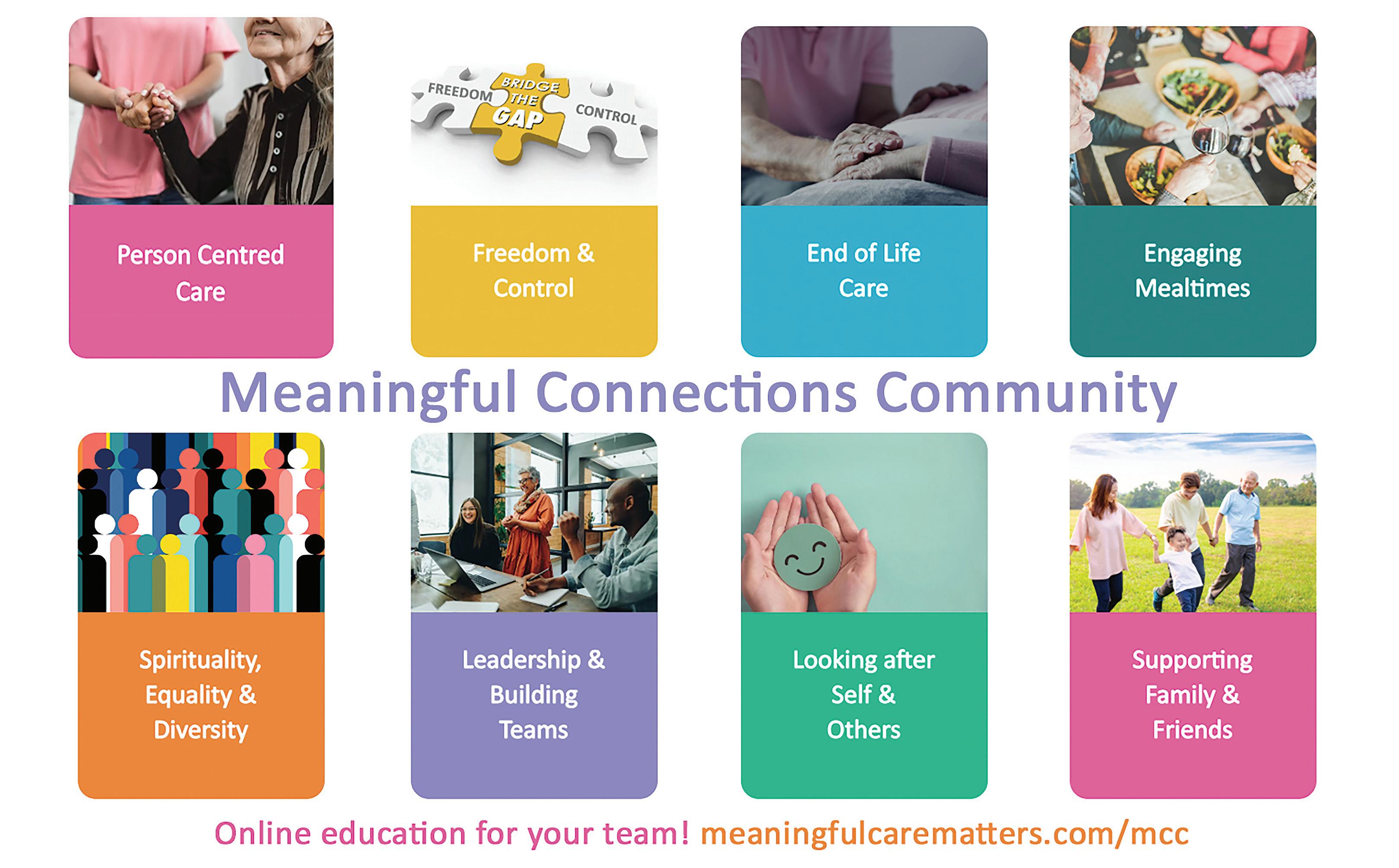

Sue Smart is the manager of Aria Care’s Abbeycrest Nursing Home in Sonning Common near Reading providing residential, nursing, dementia and palliative care.
She has been working in care for 40 years starting her career as a nurse where she worked in A&E for 20 years before moving into the community.
Under her leadership Sue has taken the home to full occupancy (70 residents) in less than a year (from 54).
The complement of 76 colleagues are highly motivated and dedicated; there are no Agency care or nursing team members– rare in today’s climate of over 130,000 unfilled vacancies in the sector. Sue and the team are extremely proud of this as it shows great commitment between the team to cover when there is sickness and annual leave.
Sue picks up the story, “My day always starts with a walk-round the home and gardens, saying good morning to the residents, engaging with the nurses, carers, as well as spending time with the activity team, kitchen, hospitality team, laundry, and maintenance teams, my deputy home manager and the reception team. This amazing and loyal team is what makes this home the wonderful quality home it is and supports our excellent reputation. At around 10.30am each day we have a head
of department meeting to discuss any updates and plans for the day. Communication is vital to ensure we all know what is going on allowing us to deliver excellent continuity of care. Late morning three times a week I have a Regional Teams meeting updating my Regional Director of our day and plans for the week and is particularly good as we can share any ideas or ask questions to the others managers in my region, the team support here from other home managers is invaluable.
I am genuinely interested in how my team are feeling as well as hearing about the practicalities of the duties of the day. Being a good listener and approachable is so important; we all need to feel that we are seen and heard, of value! We are a stable, close-knit and supportive team, people stay where they are happy, two colleagues recently celebrated 10 and 5 years here, some have been here longer still. Our shared vision both here at Abbeycrest and in the wider Aria Care community is ‘care from the heart’ and we live and breathe that. It runs through everything that we do.
The remainder of my day consists of all the behinds the scenes work along with meeting with relatives, show arounds of prospective residents and completing assessments along with networking with the local and at times the wider community. Abbeycrest is a beautiful place, I feel so lucky to work here. No two days are the same. It is filled with life and activity with our objective to help our residents achieve the best version of themselves that they can. I feel sometimes people are surprised by how lively it is here and how much fun is had by everyone, both residents and colleagues. Our residents have led extremely full and interesting lives, why should their later years be any less stimulating and enjoyable! For example we have a new resident here and on completing her assessment we learnt that she was a successful and keen artist with many stunning paintings to show plus she has written a
book, her family are understandably most proud! So we are planning an afternoon/early evening gallery event to show her amazing works of art and meet the author! This will include invitations to the other residents and of course her family and friends. This theme of celebrating individual lives we will pick up with all our residents who wish to share whatever is their gift or passion.
We are always looking for ways of improving. My leadership style is consultative and colleague recognition is a priority. This consultative approach extends to the residents who we involve in the interview process of new colleagues and we have recently started a steering user group for residents; last month piloting the benefits of decaffeinated tea and coffee into the home. Residents’ families and friends are also invited to quarterly home update meetings and our first bi-monthly cheese and wine meeting that is open to the local community started in April where we have a guest speaker, we let the audience choose the subject they would like for the next meeting following the “You said, we did” ethos.
Outside of the demands of being a Home Manager I lead a full personal life, I have two wonderful sons and daughters-in-law, and look very forward to becoming a grandmother one day! I am blessed to live in the countryside so walking and embracing nature is a wonderful past time along with staying with my family in Devon too. I have been very blessed and even managed to find the time to meet my fiancé who I am in the process of setting up home with.
“I’ve been very lucky in my career and dedicated my life to people. People are my absolute passion and I love making a difference to people’s lives, both to the residents and their families. To get a smile when you see a resident or family member is priceless, it means everything to me to see them happy.”
Karuna Manor Care Home, Harrow, was filled with devotion, joy, and tropical flavour as residents, families, and staff came together to celebrate the International Mango Festival in a truly unique and meaningful way.
The highlight of the celebration was a special mango-themed pooja (prayer ceremony), honouring the cultural and spiritual significance of mangoes in Indian tradition.
Set in the adorned temple within the care home, the festival opened with a traditional pooja led by residents and supported by carers. The mango, considered sacred in many cultures and often used in religious offerings, took centre stage during the ceremony. The altar was decorated with mango leaves, garlands, and ripe mangoes as offerings — symbolising prosperity, love, and good health.
“Our residents hold deep cultural and spiritual ties to these traditions,” said Home Manager Ruth Kigaa. “By celebrating the Mango Festival with a pooja, we were able to honour both their faith and cherished memories. It was a moment of peace, gratitude, and community.”

Following the spiritual ceremony, the care home transformed into a vibrant festival setting, with mango-
themed decorations, traditional music, and the sweet aroma of ripe fruit filling the air. Residents enjoyed singing bhajans (devotional songs) and sharing stories of mango seasons from their childhoods in India, East Africa, and the Caribbean.
“It felt like being back home again,” said one resident (TS), smiling as she participated in the aarti (light offering). “The pooja, the songs, and the mangoes — it all brought back beautiful memories.”
The event was a true reflection of Karuna Manor’s mission to provide person-centred, culturally sensitive care that uplifts the minds and hearts of its residents. The Mango Festival not only celebrated a beloved fruit but also created a spiritual and social space for residents to feel seen, heard, and valued.
The celebration concluded with group prayers for health and happiness, followed by a joyful singalong and a group photo under the mango arch — a memory to cherish for all involved.
Karuna Manor extends heartfelt thanks to families, staff, and volunteers who helped make this beautiful day possible. With its success and meaning, the Mango Festival will now become an annual tradition at the care home’s temple.
Care Inspections UK (CIUK), the UK’s only accredited inspection body for care homes, has launched a pay-as-you-go inspection service aimed at helping care homes improve quality, performance, risk management, and regulatory ratings in the face of the increasing costs affecting the social care sector.
To ease cash flow during rising National Insurance and wage pressures, the subscription service offers care homes structured, evidence-based support to navigate compliance challenges effectively. To add to this support, CIUK is offering up to £100 per month off all new subscriptions for twelve months for sign-ups in May 2025.

Designed to accommodate a range of operational needs and budgets, the three-tiered subscription model, Silver, Gold, and Platinum, offers varying levels of inspection frequency, expert guidance, and action plans tailored to each home’s requirements.
Under the Silver plan, care homes receive an annual comprehensive inspection carried out by experienced, accredited professionals. The resulting detailed report includes a full breakdown of every aspect of the care home, along with easy click-through access to relevant standards, regulations, and best practices. An action plan is provided to cover any non-conformances, with ongoing review and support to
ensure continuous progress. Homes that meet the required thresholds will be awarded a certification, signifying excellence in care provision. Additional benefits include advisory support before and after inspections, access to exclusive online events and forums for networking and best practice sharing, and participation in CIUK-led publicity initiatives designed to highlight high standards of care. CIUK also guarantees that, by fully implementing all aspects of the action plan, homes will see improvements in their regulatory ratings (CQC, CI, CIW, RQIA), giving providers added assurance that their investment in quality improvement will yield tangible results.
The Gold tier builds upon the Silver plan by offering additional regulatory and commissioning pre-inspection tools. This deeper level of service helps care providers prepare more effectively for formal inspections, giving them an edge in demonstrating compliance with industry standards. Gold members benefit from an in-depth assessment of their readiness for external regulatory visits, with tailored support that helps anticipate potential concerns and address them proactively. In addition to all the features of the Silver package, Gold subscribers receive a more comprehensive level of preparatory guidance, ensuring that homes meet and exceed industry expectations.
The Platinum package is the most comprehensive offering, providing
two inspections per year to ensure that care homes maintain consistently high standards throughout the year. Alongside the core benefits found in the Gold and Silver plans, Platinum members gain access to detailed analysis of inspection trends, helping care homes identify recurring issues and implement long-term solutions for sustained compliance and excellence. Additional advisory support is extended to Platinum members, ensuring they have ongoing expert guidance in regulatory matters, risk management, and quality improvement. This elite tier is particularly beneficial for larger care providers or those undergoing transitions, such as ownership changes or expansion, who require higher scrutiny and support.
Kevin Groombridge, chief executive at Care Inspections UK, said: “Our mission is to raise standards in the care sector by providing accessible, evidence-based support. This subscription model equips care homes with the tools to enhance compliance and deliver the highestquality care.
With rising costs placing additional pressure on the sector, for only a couple hundred pounds a month, our service offers expert guidance and regular inspections to help providers navigate these challenges. By following our structured action plan, care homes can guarantee an improvement in their regulatory ratings, ensuring better outcomes for both residents and staff.”
Visit www.careinspections.co.uk or see the advert on the facing page for details.
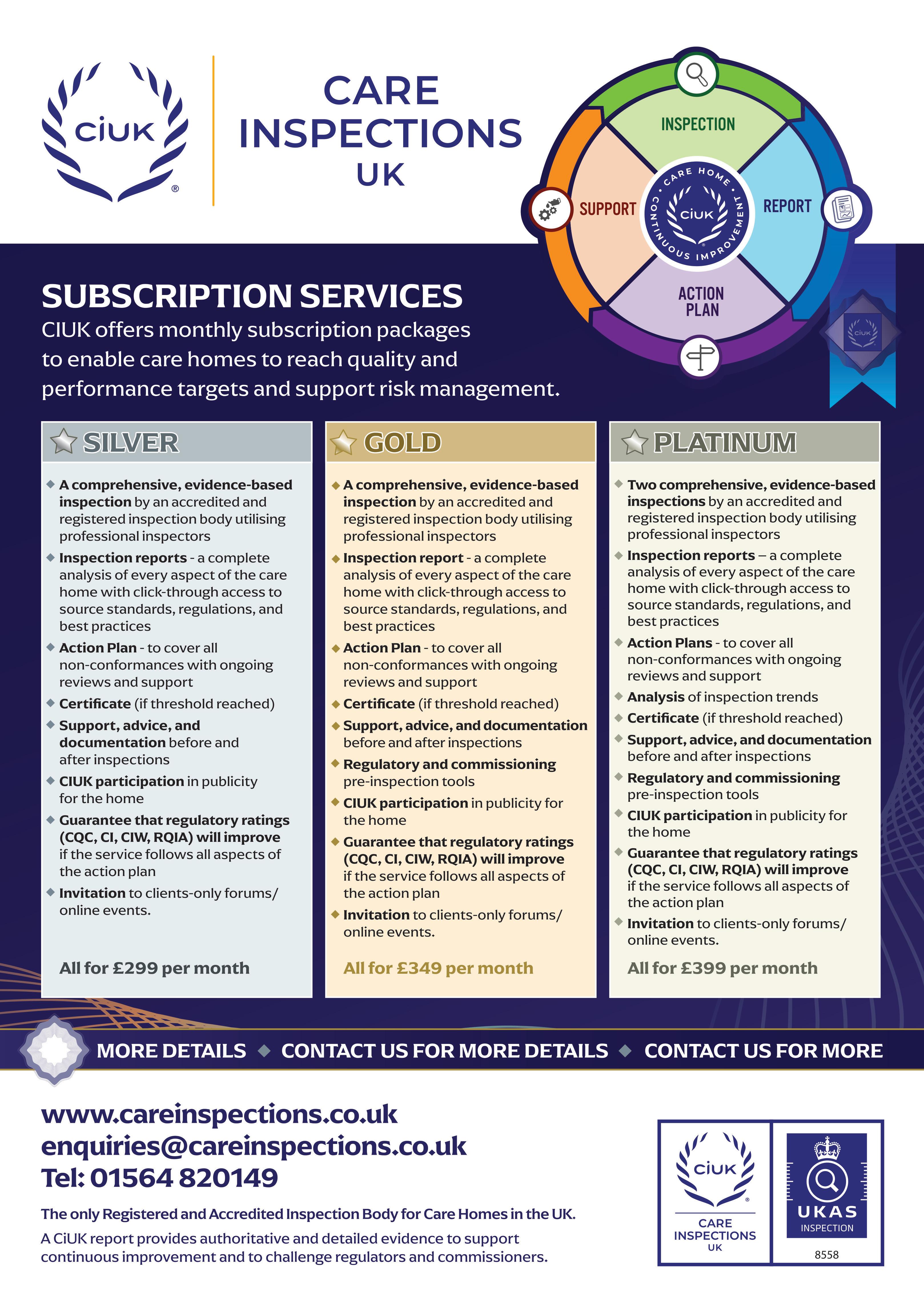
In the world of social care, career progression is not just a possibility, it’s a shining reality that transforms not only individual lives but also the lives of the residents we serve, and Ashberry Healthcare “spotlight’s” the incredible journey of Amie Porter, Home Manager at Blaenos House Nursing Home, to showcase just how far a career in care can take you.
Amie began her career in care back in 2012, joining Allt Y Mynydd as a Care Assistant. Though she had never worked in elder care before, she was drawn to the field because she knew she wanted to make a difference. Amie’s story demonstrates that it doesn’t matter where you start, with dedication, passion, and a commitment to learning, the sky is the limit.
2012: CARE ASSISTANT
Amie joined Ashberry Healthcare and quickly embraced every opportunity to grow. She loved being part of the team and always offered to take on extra responsibilities.
2013: TEAM LEADER
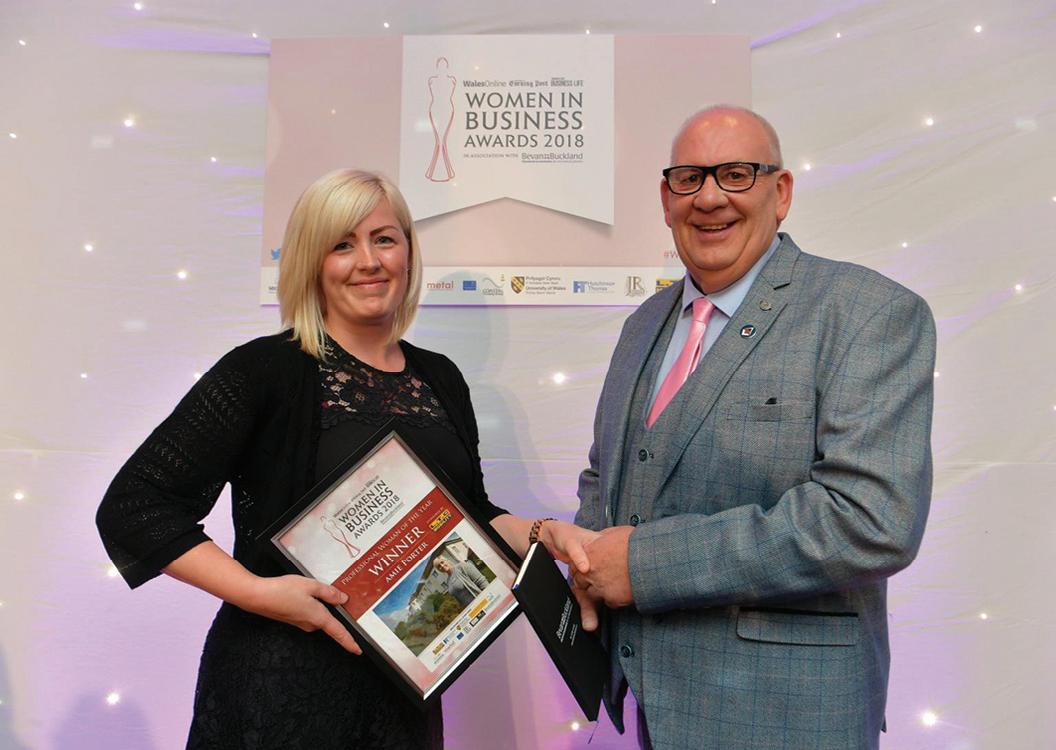
Her enthusiasm and commitment paid off when she was promoted to Team Leader. She thrived in this role, enjoying the extra responsibility and the chance to take charge.
2014: DEPUTY MANAGER
By 2014, Amie’s dedication and leadership qualities were evident, and she was promoted to Deputy Manager. She worked closely with her manager to ensure a happy, successful home environment for both residents and staff.
2015: HOME MANAGER
Amie’s hard work continued to shine, and in 2015 she was promoted to Home Manager.
2018: WELSH WOMAN IN BUSINESS
She celebrated a personal milestone by winning the Welsh Woman in Business Award, a testament to her incredible achievements. Amie’s journey didn’t stop there. In 2024, she moved to Blaenos House, another Ashberry Healthcare home, where she continues to lead with compassion and excellence. And in 2025, Blaenos House was named one of the top 20 Care Homes in Wales by Carehome.co.uk — a well-deserved recognition of Amie’s dedication and the incredible team around her.
WHY HIGHLIGHT A CAREER IN CARE?
There’s often misunderstanding about what a career in care entails. Too often, it’s viewed as unskilled work, but the reality is quite the opposite. Care work requires deep compassion, empathy, and the ability to truly step into someone else’s shoes. It’s not for everyone, but for those who choose it, like Amie, it’s one of the most rewarding careers imaginable.
Amie herself puts it best: “I’ve faced criticism for choosing this career, but I genuinely can’t think of a more rewarding job. It’s a privilege to care for someone’s loved one and to build such meaningful connections with residents.”
As MPs headed off on their summer recess, and school holidays begin, exhausted unpaid carers from across the country came together to fight for their right to respite care, in a first-ofits-kind protest outside Parliament.
With more than two fifths of unpaid carers (44%) currently accessing no UK Government support to respite care – some time off which could be anything from a few hours’ break to taking a holiday – this cohort of forgotten key workers have been left with no choice but to stage a protest from their homes, while simultaneously caring for their loved ones.
Holding placards from their kitchens and living rooms that reveal what they’d do if they were able to take some much-needed time off, their rallying cries are being streamed on huge LED screens outside government buildings.
The protest comes as a new study of 250 unpaid carers in England reveals that almost 1 in 3 (29%) rarely take a respite break, with 1 in 7 (15%) admitting they never take a break from their care duties. This lack of downtime leaves unpaid carers reporting feelings of burnout (60%), frustration (47%) and depression (27%).

With a staggering six million Brits reported to be providing unpaid care to family and friends around the clock, the research also found the average time taken away from caring by unpaid carers each day is just 54 minutes, which equates to only 13 days in a year – nine days less than the legal requirement for paid workers in England who are working eight hours a day, five days a week.
As a result of their need to care around the clock, more than half (57%) of unpaid carers surveyed rarely socialise with friends or family, whilst 67% say planning a holiday feels like a pipe dream. In fact, whilst the average Brit takes 3.94 holidays a year, nearly a third (31%) of carers say they’ve not had a holiday in more than four years.
The initiative has been created by Uncommon Creative Studio, and is backed by leading charity Carers Trust. Also supporting the campaign is actor and ambassador for Carers Trust Greg Wise, who has had firsthand experience as a former live-in carer for his sister Clare.
“I know from my own experience just how tough life can be for carers,” says Greg, “and that’s why this protest is so important. Carers need to be seen and heard, yet the UK Government continues to stay silent when it comes to social care reform. That has to change.”
Kirsty McHugh, CEO of Carers Trust, comments: “It’s incredibly disappointing that the UK Government still hasn’t given unpaid carers a right to respite. For decades, successive governments have depended on unpaid carers to provide social care on the cheap, which has delayed the need to come up with long-term funding and support.
Whilst the Government is focused on strengthening employment rights, it seems to have forgotten unpaid carers – who can’t take a break at all.’
The finalists for the National Association of Care Catering (NACC) Care Chef of the Year 2025 have been announced.
Following some fiercely contested heats the line-up of care chefs set to compete in the national final of the National Association of Care Catering (NACC) Care Chef of the Year 2025 competition has been announced. This, the 25th anniversary of the competition saw five regional heats being held with care chefs demonstrating that they can compete with the best when it comes to culinary skills. The prize is to represent their region in the national final scheduled to take place on 1st October 2025.

Head Judge Steve Munkley, Vice President of Craft Guild of Chefs, was accompanied by specialist judges at each event. The chefs had to demonstrate to the judges their full understanding of the meals they are providing for their residents whilst introducing their own flair through contemporary flavours. The finalists who intend to impress the judges one more time include:
• Lorna Parsons, Colten Care
• Jack Wood, Colten Care
• Anna Koziarska, Meallmore Ltd
• Jessica Vreede, Guthrie House Care Home
• James Adcock, Aaron Court, Abbey Healthcare
• Matthew Burke, Care UK
• Dawn Louise Brown, Greenholme Care Home, Avery Healthcare
• Alex Connell, Vegetarian for Life
• Ilona Tomaz, Porthavent Care Home
• Clare Broadbent, Devonshire House, Harbour Healthcare
• Steven Wright, Caring Homes
• Caitlin Goodall, AbleCare Homes
The ninety-minute regional heat focused on the importance of food, nutrition and positive mealtime experiences as part of quality care, entrants are challenged to create an appealing and delicious two-course menu (main and dessert) appropriate for people in a care setting. The combined food cost for both courses should be no more than £4.50 per head based on three portions and it must be nutritionally balanced. The menu must also feature at least one product from Unilever Food Solutions’ sector-relevant catering range.
Head Judge, Steve Munkley said: “This is the fifth year I have been involved and it’s going brilliantly. The standards continue to improve year on year and we have some great cooks out there in the Care Sector. This competition is a brilliant example of showcasing that talent.”
Neel Radia, National Chair of the NACC, said: “Congratulations to all those making the final of the NACC Care Chef of the Year Competition 2025! We are celebrating the Silver Jubilee of this fantastic event. The standards that we see in this competition is as high as it has ever been and the dishes served would bring delight to any diner, wherever they were eating. The finalists should be immensely proud of their efforts so far. I am sure that they will want to impress the judges once more in October.”
For more information on the NACC Care Chef of the Year 2025 competition visit https://nacccarechefoftheyear.co.uk/2025
Unite and their urgent, emotional, and politically charged campaign to save Britain’s collapsing social care and support system. Through powerful interviews interspersed with moving scenes from their first rally at Westminster earlier this year, they convey the stark economic truths, revealing how the social care sector forms the foundation of our communities and the invisible pillar maintaining the NHS.
Moreover, how successive governments' failed promises of reform now finds social care and support on the brink of collapse, which will be a national tragedy, unless urgent action is taken! ‘

The Backbone of Care’ follows the mobilisation of thousands of care providers, carers, and families who came together on the 2025 Day of Action to demand urgent government reform.
Providers Unite spokesperson Katrina Hall said: “With over 1.6 million professionals supporting 1.2 million individuals, social care is the UK’s invisible infrastructure.”
“Yet the sector is under critical threat as a result of 30 years of government underfunding, policy shifts, wage pressures, and the escalating costs of National Insurance. In this film, we hear the truth from the front lines: stories of burnout, collapse, heartbreak and resilience.”
“From green-carding MPs in the Palace of Westminster to marching with placards and chanting ‘Who Cares? We Care,’ the campaign captures a collective roar of defiance from our nearly 5000 members.”
“This documentary is not just a call for reform; it’s a living record of the social care and support sector refusing to go unheard. ‘I’ve worked in care for over two decades — but I’ve never seen it this bad.”
“We’re not asking for charity. We’re demanding justice.’ said Katrina Hall. The film shines a spotlight on our invisible workforce and nearly 6 million unpaid carers propping up the UK’s care system.”
“It makes a clear call to action for MPs and the public to stand with Providers Unite ahead of their next Day of Action at the Labour Party Conference in Liverpool this September.
‘This is our love letter to the care and support community, but also a line in the sand to our Prime minister and government.
You cannot build a National Care System on the back of thousands of broken services and millions of lives, without truly engaging us!’ Katrina added.
The staff of Birmingham based care home, Priestley Rose, recently came together for a fundraising walk in support of Alzheimer’s Research UK – raising hundreds for the good cause.
A dedicated team of caregivers and staff participated in the 5kilometer walk to raise funds for the charity, bringing attention to the ongoing fight against Alzheimer’s and other types of dementia. This cause is particularly meaningful for the staff at Priestley Rose, who witness the impact of Alzheimer’s on residents, and their families, daily.
Elizabeth Hunt, activities coordinator at Priestley Rose, said: “At Macc Care, we see firsthand the devastating impact Alzheimer’s has on the lives of our residents and their loved ones. Walking in their honour was a powerful and emotional experience – one that brought our team even closer together.”
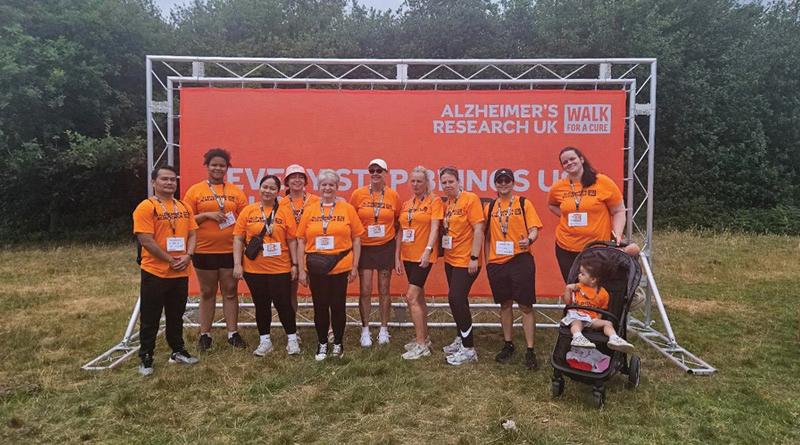
The walk was not only a way to raise funds but also to raise awareness and show solidarity with those living with Alzheimer’s. The event was an opportunity to reflect and raise both money and spirits in support of a future free from Alzheimer’s.
Priestley Rose, located in Erdington, continues to be committed to fundraising for Alzheimer’s throughout the year, with future events already in the works.
“Raising over £400 is just the beginning,” added Elizabeth. “We’re already thinking about what’s next, and how we can keep the momentum going. From coffee mornings and raffles to creative workshops and awareness talks, we’ll be continuing our efforts yearround.”
The team would like to extend a heartfelt thank you to everyone who donated and supported them during the Alzheimer’s Walk.



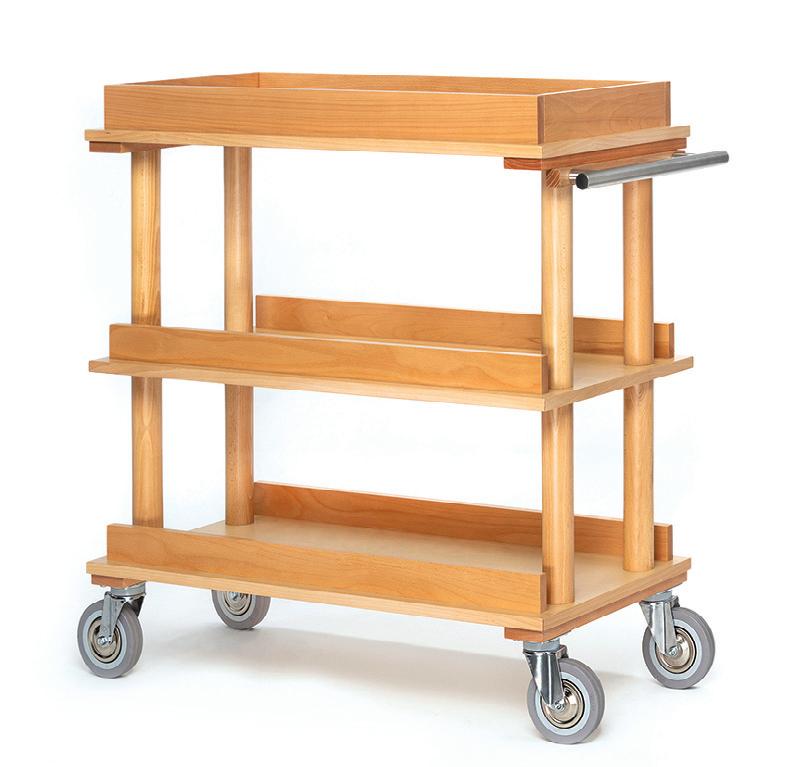
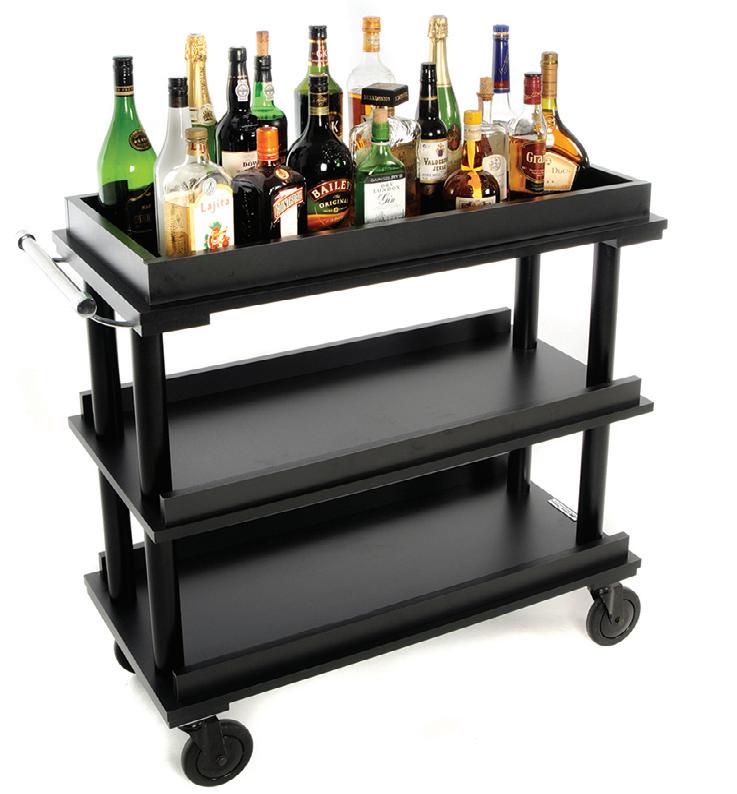
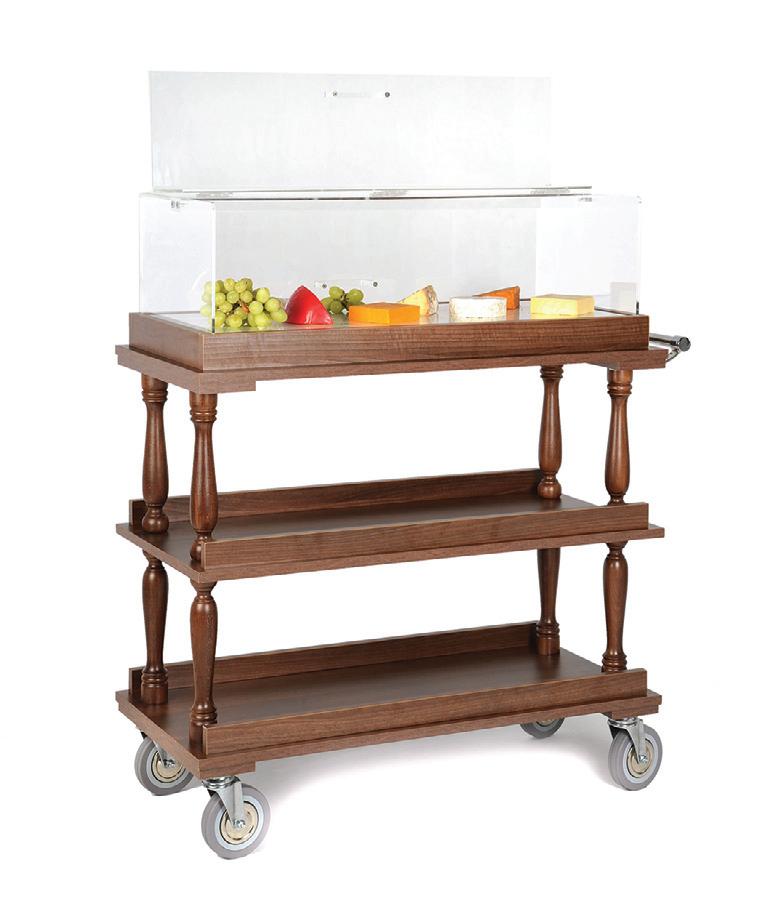
10 care home residents, each aged 100 or more, celebrated their centenarian status with a joint birthday bash, sharing their advice to join a very exclusive club.
To celebrate residents who have reached the incredible age of 100 and beyond, Care UK has launched the Centenarian Club, featuring pearls of wisdom from centenarians around the country – from food to exercising.
Marking the launch of Care UK’s Centenarian Club, the team at Queen’s Court in Windsor, went above and beyond to organise a memorable party for 10 remarkable residents from Care UK homes in Berkshire and Surrey who collectively boast an incredible combined age of 1002.
On the day, the care home team decorated the lounge with balloons and banners, and the home’s head chef planned a three-course meal and birthday cupcakes for the residents and their family members to enjoy.
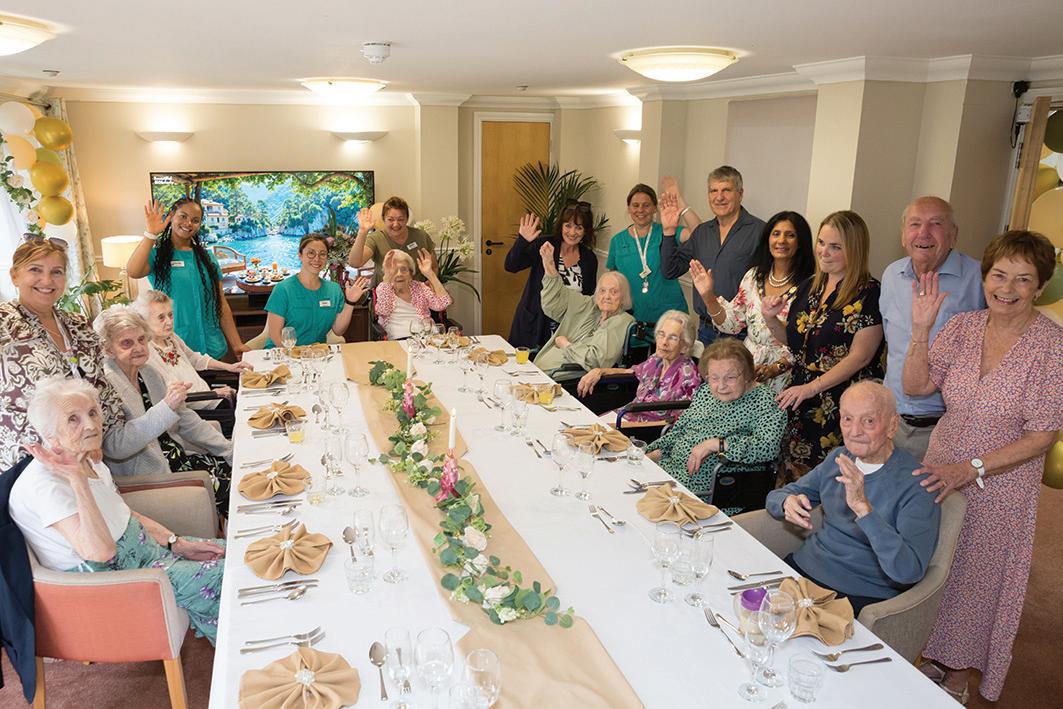
As part of the celebrations, the centenarians came together and shared their secrets to living a long and happy life. Betty Irene Harris, born in Datchet on 14th June 1925, revealed: “Always look on the bright side. Get out and about while you’re able to. Drink brandy and dance!”
Meanwhile, Margaret Lawrence, 101, attributed reaching centenarian status to her personal mantra, saying: “Always put your shoulders back, stand tall and smile.”
Other advice shared on the day included 101-year-old, Mildred Oliver, who added: “You’ve got to enjoy life! Get your friends together and have a jamboree!”
Resident, Betty Browne, 100, from neighbouring home Whitebourne in Frimley, Surrey, added: “Not having a man is my secret – I never married! That and having a glass of baileys and a bet on the horses now and again.”
Bozena Szczepaniak, Home Manager at Care UK Queen’s Court said: “We’re incredibly proud to launch The Centenarian Club and to celebrate the remarkable residents who have reached the milestone age of 100 and beyond.
“At Care UK, we’re passionate about supporting residents to live active, fulfilling lives, and we take great joy in celebrating the moments that matter. Every centenarian has a rich, unique story to tell and continues to inspire those around them with their strength, humour, and wisdom.
“The Centenarian Club is our way of recognising their incredible contributions and life experiences. Many have also shared their personal secrets to a long life. From daily movement and staying social to enjoying chocolate and the occasional glass of wine, their advice reminds us that there’s no single path to happiness and wellbeing.”
was
community
even
its highly anticipated annual
With the home decked out in colourful decorations and a 1960s theme, the day kicked off with an exciting visit from some exotic animals followed by an entertainer who took to the stage, keeping spirits high and the crowd dancing.
The highlight of the event was undoubtedly the arrival of the stunning Pink Cadillac, a perfect nod to the swinging ‘60s, accompanied by an original gramophone playing hits from the era transporting residents back in time for the fun filled afternoon.
The fair featured a wide range of activities and entertainment for all

ages, including inflatables and craft stalls, and of course some lovely food. Local families, staff, and residents enjoyed the summer sun and the sense of community throughout the day.
Sarah Johnson, manager of Craigielea Care Home, said: “it was an amazing day from start to finish. We were thrilled to welcome so many people from the local community to join our residents in the fun. The turnout was far beyond what we expected, and seeing everyone enjoying themselves made it all worth it.
“The Pink Cadillac was fabulous and definitely the star of the show. You don’t see many cars like that on the roads around Gateshead!”
“I’d like to say a big thank you to everyone that came along and to the people who made this day as incredible as it was, particularly the lovely people at the Co-op funeral parlour for their support.”
The Lord Mayor of Chester Councillor Sherin Akhtar, along with Father Paul Shaw from St Werburgh’s Roman Catholic Parish, have officially unveiled a new inclusive community garden at Grosvenor Manor care centre in Chester.
The new garden was the idea of the wellbeing team at Grosvenor Manor, senior wellbeing coordinator Lisa Forth and wellbeing assistant Siobhan Rands, who invited the whole community around the highly rated care home to get involved.
Reaching out to schools and community groups, the idea was well received and grew at pace with many donating knowledge, time and gardening expertise and others bringing energy, enthusiasm and equipment.
Land and sea were represented with the British Army and Royal Navy who were joined Cheshire Police and also the Salvation Army helping with all areas of design and construction.
Local schools were also heavily involved. Reflecting its passion for music and desire to provide a space to host entertainment for residents, Bishops High School worked to create a small stage area and ‘rock’ garden.
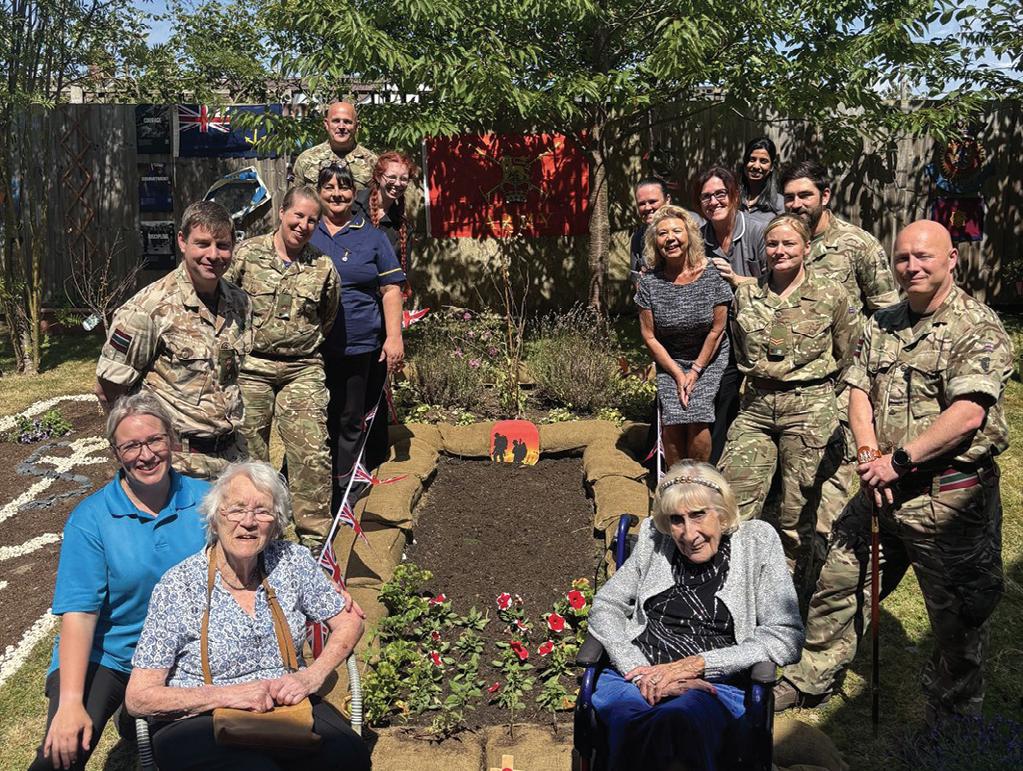
The Kings School undertook a number of watercolour painting sessions with residents, turning everyone’s works of art into an amazing backdrop for the garden, Kids Planet Nursery have created an area for an allotment so that they can grow potatoes and make homemade chips and children from Cherry Grove Primary School planted a cherry tree.
And Janet and Bronte the dog from Therapy Dogs Nationwide have worked with residents to brightly paint a number of pots for plants during their regular paws crafting sessions.
After a blessing by Father Paul, Lord Mayor of Chester Cllr Sherin Akhtar had the honour of officially opening the new garden for all to enjoy. She said: “This really has been a whole community effort and the result is a stunning new communal outdoor space for all to enjoy. It has clearly taken many hours of hard work to create the garden and is testament to what can be achieved when communities pull together. Everyone should be very pleased with their efforts.”
Senior wellbeing coordinator Lisa Forth said:
“At Grosvenor Manor we have some beautiful outside space that we enjoy making the most of and already had a wellbeing walking path that finished around the back of the home. It was a lovely and natural space, but nothing particularly special until we reached out to our wonderful local community and invited everyone together to create a fabulous space that could be enjoyed by all.
“Our fully inclusive community garden has been developed and created by the local community, not only for the wellbeing of our residents, but for the wellbeing and enjoyment of the whole community. Our residents have enjoyed watching and supporting all involved, but we don’t stop here, this is an ongoing project and we look forward to welcoming everyone into the home to tend to their parts of the garden and enjoy spending time here.”
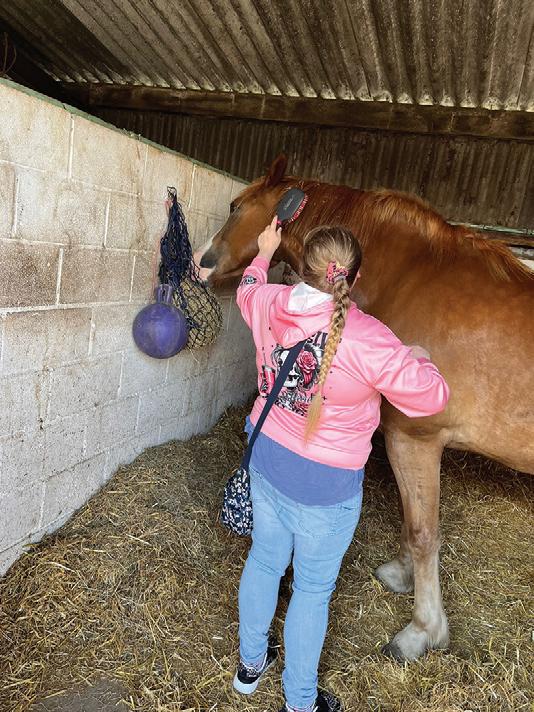
Resident Jacqueline Bryan from Beckdale House in Sale, part of Milewood, recently reconnected with her love of animals with a special trip to local farm meeting Oscar, an Irish Draught X as she works towards her personal goal of riding a horse again.
Jacqueline’s day began at Wythenshawe Community Farm, where she had an amazing time meeting friendly goats, lambs, and chickens. She particularly enjoyed giving the baby goats a gentle stroke and enjoyed the calming atmosphere of the community farm and the rolling countryside.
A visit to a private stable in Northwich followed, where Jacqueline met Oscar, a five-year-old chestnut gelding owned by Beckdale House support worker Ellie. Oscar has been part of Ellie’s life since he was just 9 months old and is known for his affectionate nature and love of cuddles.
Jacqueline was thrilled to meet Oscar, brush him and enjoyed a
cuddle with her new friend, walking him around the track, even feeding him a selection of yummy horse treats.
For Jacqueline, this was far more than just a day out it was big step forward in her goals. Having grown up riding horses and always holding a soft spot for animals, this trip was a personal milestone and part of her journey to rediscover her passion for horse riding and rebuilding her confidence.
Deputy manager of Beckdale house, Charley Ashton said “This is exactly the kind of outcome we love to see, Jacqueline working toward a personal dream and making such positive steps. Activities like this are all about giving our residents their independence to do the things they love and we’re very proud of Jacqueline.”
She now aims to visit Oscar once a week with her support worker and will continue working to finally being back in saddle again.


The latest Skills for Care report entitled ‘Size and structure of the adult social care sector and workforce in England’, revealing the return of social care vacancy rates to pre-COVID levels has generated significant response from industry leaders, highlighting both cautious optimism and persistent concerns about the sector's long-term sustainability.
While acknowledging the positive trajectory, sector chiefs have emphasized that the improvement masks deeper structural challenges that require urgent government intervention.
Oonagh Smyth, Chief Executive Officer at Skills for Care, cautioned against complacency, noting that "while the vacancy rate in social care has reduced, it's still three times that of the wider economy" and stressed the need for 470,000 additional posts by 2040. Industry leaders have expressed particular concern about the sector's heavy reliance on international recruitment, with Professor Martin Green OBE of Care England warning that "this rebound has been driven by international recruitment, not by structural reforms", describing the current approach as unsustainable. The consensus among sector leaders is that while the falling vacancy rate represents progress, it should serve as a catalyst for comprehensive reform rather than a reason for policy complacency, with many calling for fully funded Fair Pay Agreements and longterm workforce investment to address the underlying recruitment and retention challenges facing the domestic workforce.


Nadra Ahmed CBE, Executive Co-Chairman of National Care Association said:
“This report has some stark warning within it for those who are looking at the long-term workforces challenges the sector faces. The reality is if we don’t have a workforce, we cannot deliver care and support to those who need it when they need it. No carers mean we cannot deliver care. Whilst the domestic workforce option is always the better one, if the government doesn’t have a plan to grow it their actions will make it harder for providers to support those who need it. Additionally, it will inevitably hamper our ability to support our NHS colleagues to ensure safe discharges from hospitals when needed. Recognising that our workforce is our greatest strength in the delivery of care and support, we must also acknowledge that it is the greatest weakness. The image of social care continues to a be a barrier in a meaningful career option for those who would choose to follow it.
We hope that NCA and Skills for Care can work closely with the government to ensure that the nuances behind this data are properly understood and addressed, rather than being lost in headline figures. Above all, we must ensure that the people behind these numbers are seen as human beings, not just points on a trend line.’
Kathryn Marsden OBE Chief Executive of SCIE, said:
“The fall in vacancy rate is cause for optimism, but the picture overall is still one of high turnover, persistent recruitment difficulties, and a sector held together by the goodwill of overstretched staff.”
“The system is precariously dependent on overseas workers, who make up a growing proportion of new starters. This overreliance is not a sustainable strategy, and it leaves the entire care system vulnerable to policy changes and political headwinds beyond its control.”
“SCIE welcomes the sector-wide collaboration led by Skills for Care in shaping the Workforce Strategy for Adult Social Care. It provides a strong, shared foundation to tackle urgent challenges around recruitment, retention, and workforce stability. We now call on the government to work with the sector to prioritise and implement key elements of the strategy, particularly around pay, career progression, training, and wellbeing. Achieving parity of esteem with the NHS is not only fair but essential, given the critical role the adult social care workforce will play in enabling the success of the 10Year Health Plan and ensuring people receive care closer to home.”
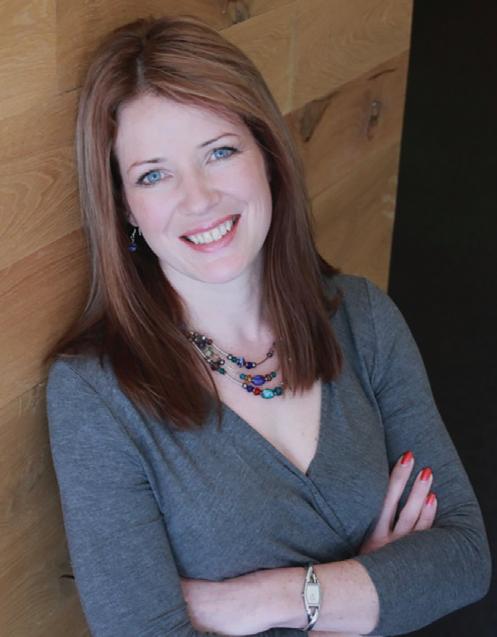
“There are reasons to be hopeful. The proposed Fair Pay Agreement has the potential to be a transformative step forward – recognising the skills of care workers, improving their economic security, and creating conditions that encourage people to stay and build their careers in care. High turnover affects care quality and continuity, disrupts relationships, and ultimately harms those who draw on care and support services.”
“But a Fair Pay Agreement must be implemented as part of a broader commitment to workforce reform. It cannot be another isolated policy fix. We must ensure the voices of care workers, providers, and people who draw on care are central to designing a future-proof system.”

Lucinda Allen, Policy Fellow at the Health Foundation, said:
‘Skills for Care’s report shows that challenges recruiting and retaining enough social care workers have eased since peaking in 2021. Workers from outside the UK continue to hold up the care system in England. The number of British workers in social care has steadily declined since Brexit and they now represent just 70.8% of roles compared to 84.6% in 2019/20. Given government measures to reduce immigration, the shrinking domestic workforce raises serious concerns that care providers could struggle to recruit enough workers in the years ahead.”
‘Overseas workers are essential to the UK health and care system but it’s clear that recent international recruitment has not always
been ethical. Today’s report shows the care sector has recruited heavily from ‘WHO red list’ countries which face significant shortages of health and care workers. Our recent analysis also highlighted that social care workers from outside the UK face particularly high risks of poverty and exploitation.”
‘Caring for older people and disabled people is vital and rewarding work but has long been underpaid and undervalued. Making jobs in social care more attractive and tackling high levels of poverty among workers requires significant improvements to pay, career progression and employment conditions. It’s vital that the government delivers on its plans for a ‘Fair Pay Agreement’ for social care.’
Nuffield Trust Fellow Camille Oung, said:
“More job vacancies being filled in social care is undoubtedly a thing to celebrate, as it should mean more people receive better support from care services. However, social care is still actively losing homegrown workers. The sector continues to be propped up by international recruitment, but the UK government is now taking multiple measures that kick away that support strut. As well as the specific block on visas for care workers, the wider tightening on immigration is likely to mean there will be fewer migrants on other types of visas who might work in the sector.”
“With these barriers in place, there is a strong case for delivering better terms and conditions for care workers to attract and retain more homegrown staff, but the Employment Rights Bill measures aimed at achieving this are both some way off, and not clearly funded.”
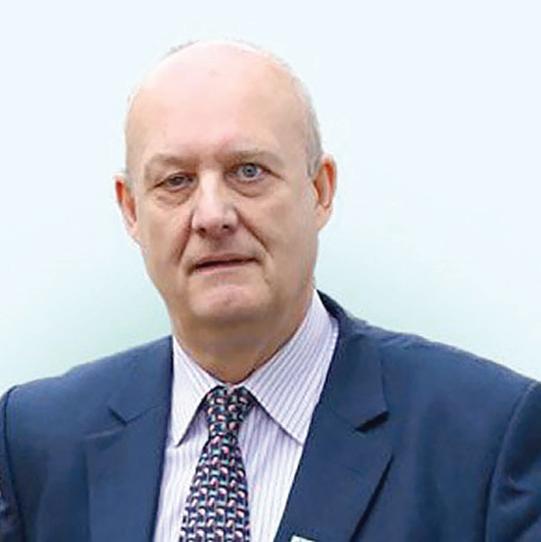

Professor Martin Green OBE, Chief Executive of Care England, said:
“This report reflects progress, but it is progress resting on an increasingly precarious base. It would be wrong to view this as a policy success story. In truth, this rebound has been driven by international recruitment, not by structural reforms to make care a more attractive domestic career. That’s a gamble the Government is now walking away from.”
“We are pulling up the drawbridge just as the sector begins to stabilise. This report makes clear that the domestic workforce continues to decline at the very moment the international recruitment route is being closed off. At a time when we should be reinforcing the foundations of the sector, we’re weakening them. This is not a sustainable path. Without urgent action, today’s progress risks unravelling into tomorrow’s crisis.”
“FPA and ERB are vital steps forward, but they are not a silver bullet -and they won’t ease the pressures providers are facing right now. We need a bridge between the workforce we have and the workforce we need.”
“This report should be recognised as a turning point, not used as a cause for complacency. The sector has shown resilience, but resilience is not the same as sustainability. If Government is serious about delivering quality care for the future, it must back this workforce with action, funding and policy that reflects the scale of the challenge ahead.”
Vic Rayner, CEO of NCF commented: “We should make no mistake that the 2025 Size and Structure report from Skills for Care underlines the need for action to build a resilient social care workforce that is fit for the future.
“On the surface the numbers indicate growth, but beneath the headlines there is a critical story to tell of a sector that is struggling to recruit and retain a sustainable domestic workforce that meets the needs of a growing population. The vacancy rate for adult social care is still three times that of the wider economy. The number of posts filled by people with a British nationality continued to fall this year too, decreasing by 30,000. The size and structure report also highlights that the sector is still likely to need to create and fill another 470,000 posts by 2040 to keep up with the projected growth in the population over the age of 65.

“With a Fair Pay Agreement for adult social care on the horizon, the government has a golden opportunity to truly invest in its workforce. The trends all point to a need to act, demonstrated by the year-on-year shrinkage taking place in our domestic care workforce that will deepen further without urgent action. This picture will only improve if the government takes strong and purposeful action to show care workers they are valued and appreciated – this means fully funding any Fair Pay Agreement for adult social care. Government should also ensure that there is adequate funding in the interim and that commissioning practice is conducive to improving the pay of care workers and attracting more domestic workers.
“Building a resilient workforce fit for the future also means making roles more attractive to the domestic workforce over the long term. Theworkforce strategy for adult social care developed in collaboration with a wide range of organisations, including the NCF, and led by Skills for Care identifies the workforce needed over the next 15 years and sets out a plan for ensuring the sector has enough of the right people with the right skills. We urge the government to commit resource and energy to work with the sector to see that plan achieved.”
For more commentary, see www.thecareruk.com
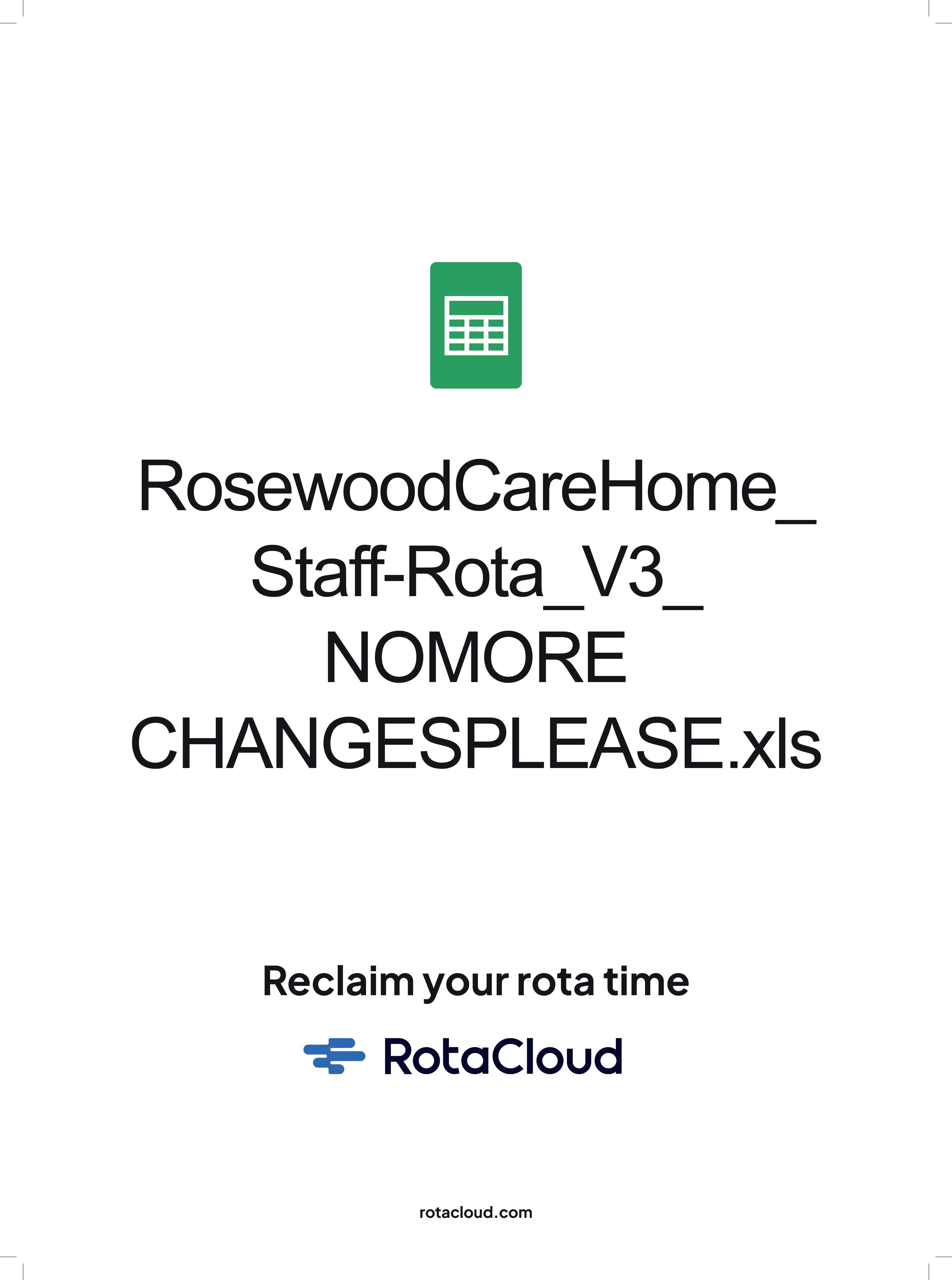
A new report from the Health Foundation reveals that people working in care homes and their families are twice as likely to live in poverty as the average UK worker. Analysing national data from 2021/22 to 2023/24, the independent health charity finds that 1 in 5 residential care workers in the UK lives in poverty, more than 1 in 10 experience food insecurity, meaning they risk going without food, and 15% rely on Universal Credit. 1 in 10 children of residential care workers go without essentials, like a warm winter coat.
Our jobs help shape the risk of living in poverty. 80% of UK jobs paid more than the average care worker wage of £12 an hour in 2024, many care workers are on zero-hours contracts, and exploitation of workers is on the rise in social care. Successive governments have failed to invest in our care system, affecting how much care providers pay workers.
The government’s Employment Rights Bill has the potential to transform work in social care, helping to ensure people are cared for and lift workers out of poverty. Planned ‘Fair Pay Agreements’ for social care could set a new sector minimum wage. Our new analysis estimates that raising the wage floor in social care to the level of clinical support workers and administrative workers in the NHS (Agenda for Change Upper Band 3) would result in an average 6.6% rise in household income for residential care workers and their families, leading to an important reduction in poverty.
The Health Foundation has previously estimated that £2.3bn would be needed in 2028/29 to increase pay for the care workforce to at least NHS Agenda for Change Band 3.
While the recent Spending Review reiterated the government’s commitment to a Fair Pay Agreement, it did not provide enough funding to both meet growing demand for care and fund a meaningful improvement
to care workers’ pay. Current spending plans risk leaving local authorities to choose between providing people with the care they need and funding much-needed wage rises for the care workforce.
Alongside workforce measures, wider improvements to social care are essential. The Casey Commission should move swiftly to bring forward its recommendations, including to help improve access to publicly funded care and better protect people against care costs.
Beyond social care, bold policy action is needed to tackle poverty in the UK, which worsens people’s health and cuts lives short. Currently, the government is choosing not to take the measures that would have the most significant impact on poverty, such as scrapping the two-child limit on benefits.
Lucinda Allen, Policy Fellow at the Health Foundation, said, “Caring for older people and disabled people is vital and fulfilling work, but it has long been underpaid and undervalued. Sadly, it is no surprise that so many care workers and their families are struggling to keep up with bills, afford enough food, put savings aside, and provide warm clothing for their children.”
“Our report also finds worrying inequalities affecting migrant workers in social care. Over one-third of residential care workers born outside the UK live in poverty, compared to one tenth of those born in the UK.”
“Around 1 in every 20 working people in England is employed in social care. Enhancing pay and working conditions in the care sector could be an important part of the government’s growth agenda, improve people’s lives, and help fill the 131,000 social care vacancies. The government must deliver on its promise of fair pay for care workers, alongside wider improvements to our care system.”
In care homes, where hygiene, safety, and reliability are paramount, it’s essential that laundry operations run seamlessly. Forbes Professional’s Complete Care solution is tailored to meet the specific demands of this environment, offering fully supported and cost-effective laundry systems.
With Complete Care, care homes benefit from access to premium commercial laundry appliances without upfront capital expenditure. The all-inclusive rental plan covers installation, routine servicing, maintenance, and repairs; enabling staff to focus on resident care rather than laundry appliance logistics. Unexpected breakdowns can severely disrupt operations, which is why Forbes provides nationwide, award-winning support with a same or next-day engineer response to minimise downtime.
Preventative servicing is central to Forbes’ approach. Their offering includes routine maintenance, full certification, annual gas safety checks, and professional dryer duct cleaning - ensuring systems meet all legal and regulatory standards. Whether supporting existing machines or those rented through Forbes, this proactive strategy improves opera-
C&S
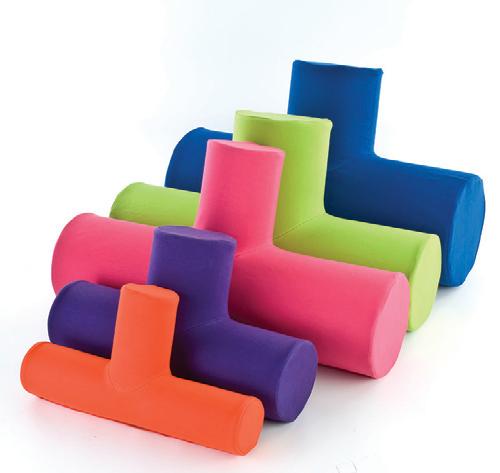

tional efficiency and reduces risk.
Under Regulation 35 of the Gas Safety Regulations 1998, annual gas inspections are mandatory. Forbes’ Gas Safe-registered engineers conduct these checks to ensure safe, legally compliant environments. Additionally, regular duct cleaningoften overlooked - is vital not only for performance but also for fire prevention. Forbes’ nationwide service mitigates these risks while optimising dryer efficiency. Whether you need new rental equipment, service and maintenance for existing appliances, or a full purchase, Forbes offers flexible procurement routes to suit different operational models and budgets. Their expert consultants work closely with care providers to design tailored solutions for each setting.
With decades of experience in the care sector, Forbes Professional is a trusted partner to care homes across the UK; delivering dependable, fully supported laundry solutions that prioritise safety, compliance, and peace of mind. forbespro.co.uk | info@forbes-professional.co.uk |
See the advert on page 13, contact us on 01424 853331 or visit www.cands-seating.co.uk to request or download a brochure, pricelist or order form, request an individualised quotation, speak to an advisor or to place an order.
HipSaver Soft Hip Protectors protect the elderly and disabled people from fall-related hip fractures. Designed to protect elderly people from fall related hip

Available as comfortable underwear or long casual pants in several sizes for men and women, HipSavers feature soft protective airPads permanently sewn into the garments over the hip areas prone to injuries and fractures. HipSaver TailBone models have an additional protective airPad over the coccyx on lower back for protection

Since our founding in 2010, Activities to Share has been dedicated to enhancing the lives of those in care by providing thoughtfully designed activity products. Our mission is to support activity coordinators in delivering uplifting, engaging experiences that foster connection, joy, and well-being. We achieve this by listening closely to your feedback and evolving with your needs. Whether over the phone, via email, WhatsApp, or Live Chat on our
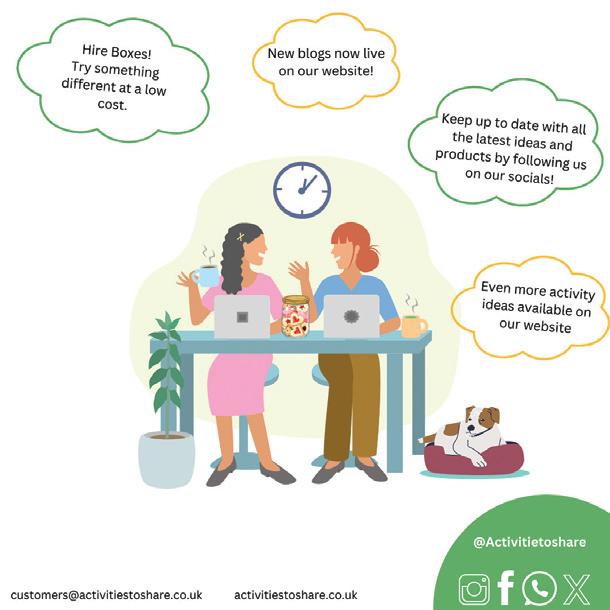
HipSaver Soft Hip Protectors are perfect for use in care homes and by elderly people living independently.
Medical Ltd - 01835 864866 - www.win-health.com See the advert on page 3 for further products.


How one simple training game is helping care homes improve outcomes for residents—and staff
In care homes dehydration remains a quietly persistent danger. While often invisible on the surface, its effects can be devastating—both for older adults and for the staff who care for them.
Despite being entirely preventable, dehydration continues to cause avoidable harm, hospital admissions, and even deaths among vulnerable care home residents. It can also impact staff wellbeing, concentration, and performance—making it a risk that affects the entire care environment. So why does dehydration still slip under the radar? And what practical steps can care homes take to tackle it head-on?
A QUIET EPIDEMIC IN CARE SETTINGS
Older adults are particularly vulnerable to dehydration for a range of reasons. As we age, our sense of thirst diminishes, and many residents have underlying conditions—such as dementia, stroke, or mobility impairments—that make it harder to ask for, reach, or consume drinks. Medications like diuretics or laxatives increase fluid loss, while difficulties swallowing (dysphagia) make drinking unpleasant or risky.
A study published in Age and Ageing (El-Sharkawy et al., 2015) found that over a third of older adults admitted to hospital were already dehydrated on arrival, and two-thirds remained so 48 hours later. More recent studies confirm that this remains a pressing issue. For example, care home residents are still five times more likely than community-dwelling older adults to arrive at hospital with dehydration, particularly with dangerously elevated sodium levels—known as hypernatremia—which significantly increases the risk of in-hospital death.
Despite public health campaigns and growing awareness, more recent reviews suggest the problem has not improved. As recently as 2022, a UKwide review of hydration practices in residential care estimated that around 20% of older adults remain clinically dehydrated at any given time. Some studies, depending on the criteria used, report prevalence rates as high as 34%.
Put simply, dehydration in care homes hasn’t gone away. It remains a widespread, under-addressed issue that continues to harm some of the most vulnerable people in our society.
IT’S NOT JUST THE RESIDENTS
While most dehydration efforts focus (rightly) on residents, it's important to recognise that care home staff are also at risk.
Working long shifts in hot, fast-paced environments, care staff often delay drinking water or miss breaks altogether. Some worry about not having time for toilet breaks. Others are simply too focused on their residents’ needs to think about their own.
The effects of even mild dehydration on staff can include fatigue, headaches, poor concentration, irritability, and slower decision-making— none of which is ideal in a safety-critical setting. Dehydrated staff may not perform at their best, and over time this can impact both care quality and wellbeing.
Supporting hydration in care homes, then, means supporting everyone—residents and staff alike.
A SIMPLE GAME, A BIG IMPACT
So how can care homes raise awareness of hydration risks, improve practice, and make learning more engaging?
One increasingly popular approach is The Hydration Game, developed by Focus Games. Designed specifically for health and social care staff, the game takes the form of a fun, team-based learning session that helps players explore the causes, risks, and solutions related to dehydration in care settings.
The Hydration Game prompts discussion, sparks reflection, and encourages staff to share their experiences and insights in a relaxed, collaborative way.
Players take turns answering questions, tackling realistic scenarios, and discussing how they might handle various hydration-related situations— from supporting a resident who refuses drinks, to spotting early signs of dehydration, to thinking about their own hydration habits during shifts.
The game typically lasts 45–60 minutes and is suitable for 2–12 players. It works well across all roles—care assistants, nurses, kitchen staff, cleaners, and even admin or maintenance teams—because everyone in a care home can play a part in hydration care.
There’s also an online version (ZeST) for teams who work remotely or across multiple sites.
REAL-WORLD RESULTS
Beyond awareness and engagement, hydration-focused training can produce measurable results. A notable example comes from Torbay and South Devon NHS Trust, which in 2021–2022 supported a hydration project across 33 care homes. The results were striking: a 63% reduction in falls requiring hospitalisation, an 18.5% decrease in urinary tract infections (UTIs), and zero UTI-related hospital admissions during the project period. What made the difference? A blend of simple changes: structured drink
At Simply Food Solutions, we believe that everyone deserves access to delicious meals tailored to their specific dietary requirements. Founded over 20 years ago, the company began with a vision to provide high-quality halal meals to hospital patients. Today, as part of the Bidfood family, Simply Food Solutions offers an extensive range of food solutions designed to meet the diverse needs of healthcare providers, care homes and individuals across the UK.
Our Product Ranges
SIMPLY PUREE
Designed for individuals with swallowing difficulties (dysphagia), the Simply Puree range offers texture-modified meals compliant with IDDSI guidelines. From Level 3 (Liquidised) to Level 7 (Regular), our meals ensure safety without compromising on taste. Options include soups, main courses, desserts and snacks, all crafted to the highest safety standards. Additionally, the Simply Puree Junior line caters to paediatric needs, providing
rounds, flavour and temperature choices, staff reminders, visual prompts, and team training.
The Hydration Game fits perfectly into this approach, helping staff explore and embed hydration-friendly practices in a way that’s memorable and motivating.
IDEAS FOR USING THE HYDRATION GAME IN YOUR HOME
Care homes that adopt The Hydration Game often find that it quickly becomes a flexible, well-used tool across their organisation. Here are some creative and effective ways it can be used:
As part of induction or refresher training, the game helps new staff understand hydration risks from day one—and makes mandatory learning more enjoyable. Many homes use it during Care Certificate sessions. During staff meetings or team huddles, a few game cards can be used to prompt a five-minute discussion. These quick conversations often uncover issues or ideas that otherwise go unspoken.
To promote staff wellbeing, the game can also prompt teams to think about their own hydration habits. “When did you last drink water?” or “How do you remind yourself to hydrate?” are simple but important questions that encourage better self-care.
Some care homes even use the game to identify “hydration champions”—staff members who demonstrate a real interest in promoting better hydration, and who can lead initiatives, monitor intake, or coach colleagues.
SHIFTING THE CULTURE
Ultimately, hydration in care homes is not just about checking drink charts or offering fluids at mealtimes. It’s about embedding a culture of attentiveness—where hydration is seen as an essential act of care, not an afterthought.
Games like The Hydration Game make this easier by turning serious issues into opportunities for learning, connection, and shared responsibility. They give staff the space to speak, reflect, and come up with practical ideas that make sense in their setting.
And when residents are better hydrated, they are safer, happier, more comfortable, and more independent. Staff are sharper, more resilient, and more engaged. Everyone benefits.
By making learning enjoyable and practical, The Hydration Game is helping care homes across the UK improve hydration outcomes and build stronger, more confident teams.
Want to learn more or get started? See the advert on the front cover and use the code for a 20% discount.
Visit www.hydrationgame.com for details and ordering options.
meals that are both safe and appealing for children.
SIMPLY HEALTHCARE
Meeting the needs of patients with allergies, intolerances, or specific dietary requirements, the Simply Healthcare range includes gluten-free, allergen-aware and renal-suitable meals. Each dish is pre-plated and ready to serve, ensuring convenience and consistency in meal preparation. The range encompasses a variety of meat, fish and vegetarian options, all designed to support patient health and satisfaction.
SIMPLY WORLDFOODS
Reflecting the UK's rich cultural diversity, Simply Worldfoods offers a selection of cultural meals, including halal, kosher and AfroCaribbean meals. This range allows healthcare providers to offer patients a taste of home, enhancing mealtime experiences and promoting cultural inclusivity.The range also provide multiportion dishes that are ideal for staff or visitor feeding cafes.

Explore our full range of products and discover how Simply Food Solutions can enhance your mealtime offerings, please visit https://simplyfoodsolutions.co.uk
Our son Rune is nearly six. He lives with a rare neuromuscular condition called Nemaline Myopathy, which affects his movement and strength. He needs round-theclock care, someone awake even through the night to manage his ventilator, medication, and medical equipment.
But the biggest threat to Rune’s health hasn’t been his condition. It’s been what he was being fed.
FORMULA NEARLY BROKE HIM
For the first few years of his life, Rune was in and out of hospital. He suffered from constant vomiting, painful tummy issues, repeated chest infections, and dangerous aspiration (when food or liquid enters the lungs). These episodes were terrifying, and they were all made worse by the “nutritionally complete” formula feeds he was given through his feeding tube. These formulas, the kind given to most tube-fed children and adults in the UK, are ultra-processed and heavy in dairy. For Rune, they made everything worse. He was deeply unwell, and we were told this was just part of his condition. But what if it wasn’t?
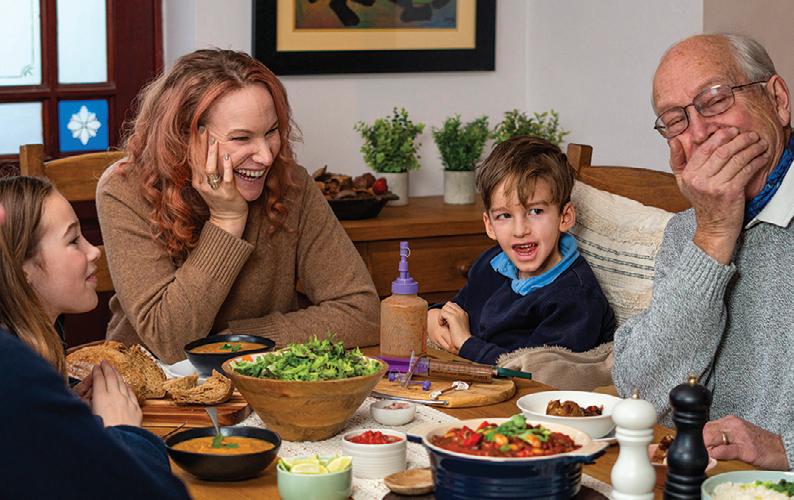
calories are made of, how they digest, and how they make you feel. Think about how you eat. Smelling, tasting, chewing, it all signals your body to start digesting. Tube-fed individuals miss out on that entirely, which means their bodies have to work harder. And if all they’re being given is sweetened shakes or oil-heavy blends, it’s no wonder they struggle to thrive.
TRIAL, ERROR, AND TRANSFORMATION
We had a lot to learn. Creating tubefriendly meals isn’t just about chucking leftovers in a blender. It takes careful attention to texture, nutrition, timing, and safety. But with help from open-minded professionals and a lot of research, we began to build blends tailored for Rune’s needs.
And the change was incredible.
The vomiting stopped. The chest infections slowed. His bowels started to work more normally. He had more energy for therapy. And for the first time in a long while, Rune felt more like himself.
Now, Rune shops with us. He picks out vegetables by smell and colour. He helps decide what goes into his blends. And incredibly, he’s even started tasting small amounts of purée by mouth, something we never imagined would be possible. He’ll always use his feeding button, but now he calls it his “powerup button.” He’s proud of it. And so are we.
FROM PERSONAL JOURNEY TO SHARED PURPOSE
Rune’s journey changed how we think about food, not just as nutrition, but as comfort, culture, and connection. We began to see how many tube-fed people, like him, are offered only one option: formula. For many, it’s essential. But it shouldn’t be the only choice.

Let’s be clear formula isn’t the enemy. For many people, it’s an absolute lifeline. It saves lives. It provides critical nutrition in a manageable, measurable, and medically supported way. This isn’t about demonising formula, it’s about recognising that one size doesn’t fit all. And for too long, that fact has been overlooked.
After one particularly rough hospital stay, we started researching alternatives, and that’s when we discovered the blended diet. In simple terms, it means blending real, cooked food so it can go through a feeding tube. It’s more common in places like the US, but at the time it was almost unheard of in the UK due to old guidelines and fears around safety. That’s changed in recent years. New evidence and updated NICE guidance now support the use of real food blends in medical care. Why? Because people do better. It's not just about calories, it’s about what those
This wasn’t just a lucky break. Study after study shows that real food can offer major benefits for tube-fed people, especially children, where most of the research has focused so far. But the logic applies to adults too. Imagine being used to eating normal food your whole life, only to be switched to synthetic-tasting formula with no smell, no flavour, no connection to the food you once loved. What does that do to your appetite? Your wellbeing? Your sense of self?
FOOD IS CONNECTION
In our home, food isn’t just fuel. It’s comfort. It’s an experience. It’s care. When Rune first started tube feeding, his feeds were done in private, away from the dinner table. That’s what his school and carers had been taught, to keep it discreet, hidden. But we didn’t want Rune to feel ashamed about how he eats. He deserves variety, flavour, and choice just like everyone else.
So we brought him into the heart of mealtimes.
Plenty of tube-fed people can still taste, smell, and even enjoy small amounts of food by mouth. So why shouldn’t they have access to real ingredients, varied flavours, and meals that reflect the same dignity as those who eat by mouth?
Together with a close family friend, we’ve started a small company Food Untethered, not just to create meals, but to rethink what it means to eat when you're tube-fed. Our aim is to support those on liquid diets to live fully, with options that nourish both body and spirit. This all started with Rune, but it’s something so many others deserve too.

Sophia Johnston Co-founder of Food Untethered Parent carer for Rune Johnston www.fooduntethered.com
contact@fooduntethered.com 07846690988


As the care sector continues to evolve, catering services have become an important pillar— not just in meeting nutritional needs, but in supporting dignity, independence and social well-being. At the heart of person-centred care, catering now emphasises personalisation, safety, sustainability and smart technology.
There is growing recognition that catering should be fully integrated with care and clinical services. Close collaboration between catering, care and nursing teams ensures residents remain central to all decisions, with nutritional care given equal priority to physical care.
Tailored nutrition is key to enhancing health, autonomy and daily enjoyment. Meanwhile, environmentally and socially sustainable practices – such as reducing waste, sourcing locally and embracing greener technologies – allow care homes to nourish both people and the planet.
Here are some thoughtful and effective ways that catering can enrich care delivery – and how providers can tap into its full potential to inspire change, connection and pride across their homes.
SPECIALIST CARE CATERING: THE IMPORTANCE OF INDIVIDUALISED NUTRITION
Within every care home setting, food must cater for a broad spectrum of requirements – dietary, cultural, clinical and emotional. For residents with certain conditions like dementia or dysphagia (difficulty swallowing), dining has to be sensitive and responsive. For instance, at Nellsar this has meant developing texturemodified meals that maintain nutritional value and are visually appealing even when puréed. The chefs shape puréed food to resemble its original form using moulds and piping techniques – puréed meat or poultry to look like a chop or thigh and puréed broccoli and cauliflower to look like florets – stimulating memory and increasing comfort at mealtimes.
This is a skill of care catering where clinical accuracy meets culinary creativity. Good nutrition in care homes promotes physical health, limits the risk of chronic disease and frailty and enhances mental health through maintaining mood and cognitive function. Additionally, food is tailored not only to meet physical requirements but to create pleasure and appreciation – an approach that facilitates respect and self-determination for residents, empowering them to make nutritional choices about what they eat and enjoy.
EMBEDDING SUSTAINABILITY IN DAILY CATERING
Sustainability is becoming popular in care catering as care homes are adopting locally sourced and organic ingredients, forming partnerships with local farms. These practices aim to reduce environmental impact and improve meal quality.

By Adrian Silaghi, Head of Catering Services at Nellsar Care Homes (www.nellsar.com)
It's alarming that three in four care homes are concerned about food waste and its associated costs. But there are ways to tackle this issue. For instance, Princess Christian Care Home has started a composting initiative as part of its Cooking Club. This program brings families and residents together to cook, and any food scraps are composted to help grow vegetables in the home's vegetable patch – creating a meaningful cycle of growing, cooking and eating.

Social sustainability is also embedded within this activity. Cooking together encourages enjoyment, confidence and fosters a sense of shared purpose. Residents, team members and visiting family members engage in a familiar and inclusive activity that balances fun with environmental consideration – supporting well-being through connection and routine as much as through nutrition.
A strong catering operation is underpinned by a confident, well-trained team. Many care homes are creating opportunities for catering professionals to connect and share knowledge. For example, Nellsar is forming a Chef Committee to encourage peer-to-peer learning among Head Chefs. This not only encourages innovation but promotes a culture of mutual support and social sustainability.
Horizontal learning models are another effective strategy – offering team members the chance to share skills in areas like menu design, food presentation and specialist diets. These approaches create lasting professional development opportunities that can be scaled across homes through online platforms. Crucially, these models elevate the status of care catering, positioning it as integral to clinical and emotional support.
Technology continues to revolutionise how care homes manage food service. From menu planning tools to dietary tracking apps, digital solutions streamline operations and promote safety. For instance, the International Dysphagia Diet Standardisation Initiative (IDDSI) app helps to ensure diet textures are correctly managed for residents with swallowing difficulties.
In addition, admin systems like Care Vision allow nursing and catering teams to share dietary and care updates and reports in real-time. This holistic coordination supports safe, personalised dining experiences. Technology can also contribute to sustainability. For example, Nellsar’s in-house yoghurt production using stainless-steel pots, electric mixers and biologic cultures has significantly reduced single-use plastic.
ENHANCING DINING EXPERIENCES FOR RESIDENTS
Mealtimes should be moments of enjoyment, calm and connection. Care homes benefit greatly from dedicated roles focused on resident experience. Social interaction during mealtimes facilitates community and engagement, further supporting residents’ emotional well-being. One-way Nellsar’s Residents’ Dining Experience Lead exemplifies this is by working alongside catering and care teams to promote person-centred dining environments.
The emphasis of this role is to support a whole-team approach across Nellsar’s homes, in providing individualised experiences while simultaneously meeting the nutritional needs of the residents — ensuring mealtimes are a calm and enjoyable experience for all.
The dynamic, hands-on support includes mentoring team members, offering strategies for managing behavioural changes sensitively and creating action plans to be implemented collaboratively. Continued involvement through follow-up visits and audits ensures improvements are maintained, with a focus on positive reinforcement and practical problem-solving.
Care catering thrives as a whole-home responsibility. When chefs, care teams and clinical colleagues work together, residents are nourished physically and emotionally. Positive dining experiences built on sustainability, innovation and compassion help residents feel valued, supported and truly at home.
Mobile Kitchens Ltd specialises in the hire or sale of temporary catering facilities and foodservice equipment.
Ideal for events or to provide temporary catering facilities during your kitchen refurbishment, our versatile units and equipment offer an efficient and economic solution to the caterers’ needs.
Production Kitchens, Preparation Kitchens, Warewashing Units, Dry Store Units, Cold Rooms and Restaurant Units are available as individual units in their own right or they can be linked together on site to form a complete complex.
The standard specification of our smallest Production Kitchen unit includes a six burner oven range, salamander grill,
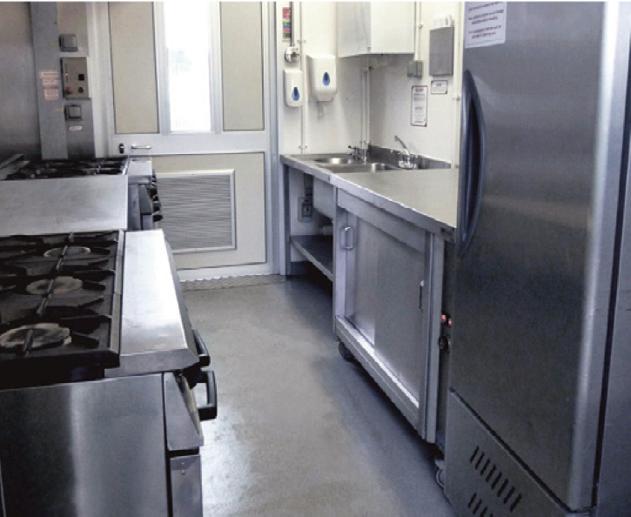
Alternatively, we can offer modular, open-plan facilities, usually for larger, longer-term hires.
We offer a free design service, and project management from concept through to delivery and installation on site, plus full technical support throughout the hire period.
and
Effective hygiene and odour management forms the cornerstone of quality care in residential and nursing home settings. Beyond mere cleanliness, these practices directly impact resident dignity, health outcomes, and the overall therapeutic environment that supports recovery and wellbeing.
THE FOUNDATION OF DIGNIFIED CARE
Personal hygiene represents far more than basic cleanliness—it embodies respect for the individual and recognition of their inherent worth. When residents feel clean and comfortable, their self-esteem improves, social interactions flourish, and psychological wellbeing strengthens. Conversely, poor hygiene practices can lead to social isolation, depression, and a profound loss of personal dignity.
HEALTH AND SAFETY IMPERATIVES
Proper hygiene protocols serve as the first line of defence against healthcare-associated infections. In residential settings where vulnerable populations live in close proximity, maintaining rigorous standards becomes critical for preventing cross-contamination and protecting community health.
Poor odour control often signals underlying health issues requiring immediate attention. Persistent odours may indicate skin breakdown, urinary tract infections, or inadequate wound care management. Staff trained to recognise these warning signs can intervene early, preventing minor concerns from escalating into serious medical complications.
Regular hygiene assessments should form part of comprehensive care planning, with individualised approaches reflecting each resident's preferences, cultural background, and physical capabilities.
BEST PRACTICE FRAMEWORK
Person-Centred Approach: Every hygiene intervention should begin with respectful communication. Explain procedures clearly, seek consent where possible, and honour personal preferences regarding timing, prod-
ucts, and assistance levels. This collaborative approach maintains autonomy whilst ensuring necessary care delivery.
Environmental Management: Maintain optimal room ventilation, use appropriate air fresheners sparingly, and address sources of odour promptly rather than masking them. Regular deep cleaning schedules, combined with immediate response to accidents, create pleasant living environments for all residents.
Product Selection: Choose gentle, pH-balanced cleansing products suitable for sensitive or compromised skin. Avoid harsh chemicals that may cause irritation or allergic reactions. Consider fragrance-free options for residents with respiratory sensitivities or cognitive conditions that may cause distress with strong scents.
Staff Training and Support: Comprehensive training programmes should cover infection control principles, dignity preservation techniques, and proper use of personal protective equipment. Regular refresher sessions ensure consistent standards across all care teams.
DIGNITY-PRESERVING PROCEDURES
Maintaining privacy during personal care represents a fundamental aspect of dignified treatment. Use privacy screens, ensure doors remain closed, and limit the number of staff present to those directly involved in care delivery. Explain each step of the process and pause if residents express discomfort or distress.
Timing considerations prove equally important. Schedule hygiene activities around residents' natural rhythms and preferences where possible. Some individuals prefer morning care, whilst others feel more comfortable with evening routines. Flexibility demonstrates respect for individual choices and promotes cooperation.
Cultural sensitivity requires ongoing attention. Some residents may have specific religious or cultural requirements regarding personal care practices. Understanding and accommodating these needs shows respect
for diversity and supports emotional wellbeing.
When residents resist hygiene care, often due to cognitive impairment or past traumatic experiences, staff require specialised approaches. Gentle persistence, distraction techniques, and breaking tasks into smaller steps can reduce anxiety and promote acceptance.
For residents with dementia, maintaining familiar routines and using consistent caregivers helps reduce confusion and resistance. Simple, clear instructions and positive reinforcement encourage participation and preserve remaining independence.
Effective hygiene programmes require robust documentation, regular auditing, and continuous quality improvement processes. Track infection rates, resident satisfaction scores, and family feedback to identify areas for enhancement.
Invest in appropriate equipment and supplies to support best practice implementation. This includes adequate changing facilities, proper lifting equipment, and sufficient staffing levels to avoid rushing through personal care tasks.
Excellence in hygiene and odour control represents a fundamental expression of caring that extends far beyond basic cleanliness. When implemented thoughtfully, these practices preserve dignity, protect health, and create environments where residents can thrive with confidence and comfort.
The investment in comprehensive hygiene programmes yields dividends in improved health outcomes, enhanced resident satisfaction, and strengthened family relationships. Most importantly, it affirms the value and worth of every individual in our care, supporting their right to live with dignity and respect throughout their residential care journey.
Smell Away Ltd. has unveiled its latest innovation: a dual-action HEPA air purifier designed homes and residential care homes across the UK and Ireland. Combining advanced allergen filtration with trusted odour control, this new solution promotes cleaner, fresher indoor air – crucial for the health and comfort of vulnerable residents and staff alike
As hay fever season intensifies and indoor air quality becomes a growing concern, the Smell Away® purifier addresses both allergen exposure and persistent odours in care environments. Its High-Efficiency Particulate Air (HEPA) filter captures 99.97% of airborne particles as small as 3 microns, effectively removing pollen, dust and mould spores. For elderly residents, especially those with respiratory conditions, this protection can ease symptoms and enhance wellbeing.
Long praised for its odour-neutralising technology, Smell Away® now integrates its premium RC412 Australian activated carbon with a proprietary additive to tackle common
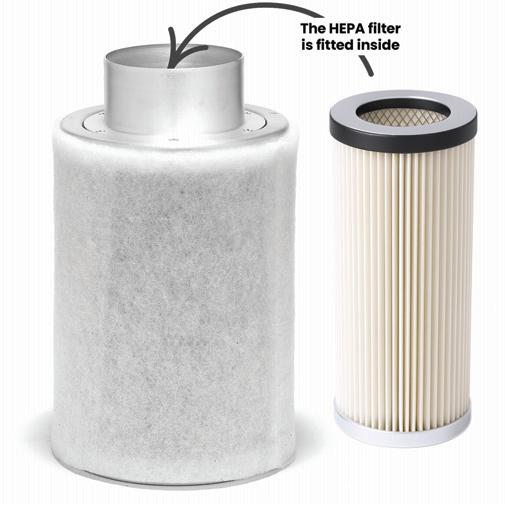
care home smells – from food and cleaning agents to incontinence and smoke – discreetly and efficiently.
Designed for ease of use, the compact, quiet unit fits seamlessly into bedrooms, treatment rooms, and communal areas. It requires no installation, operates with low energy consumption, and offers a long filter life of up to two years. Free delivery is available across the UK and Ireland, with special rates for care homes purchasing multiple units. "Air quality has a direct impact on wellbeing," says Gareth Williams of Smell Away Ltd. "This filter isn’t just about cleaner air – it’s about creating a more dignified, comfortable environment for residents and staff."
With growing attention on indoor air standards, Smell Away® provides a practical, cost-effective tool for care homes committed to delivering safer, more pleasant living spaces – one breath at a time.
For further information see the advert below or visit www.smellaway.com/carer
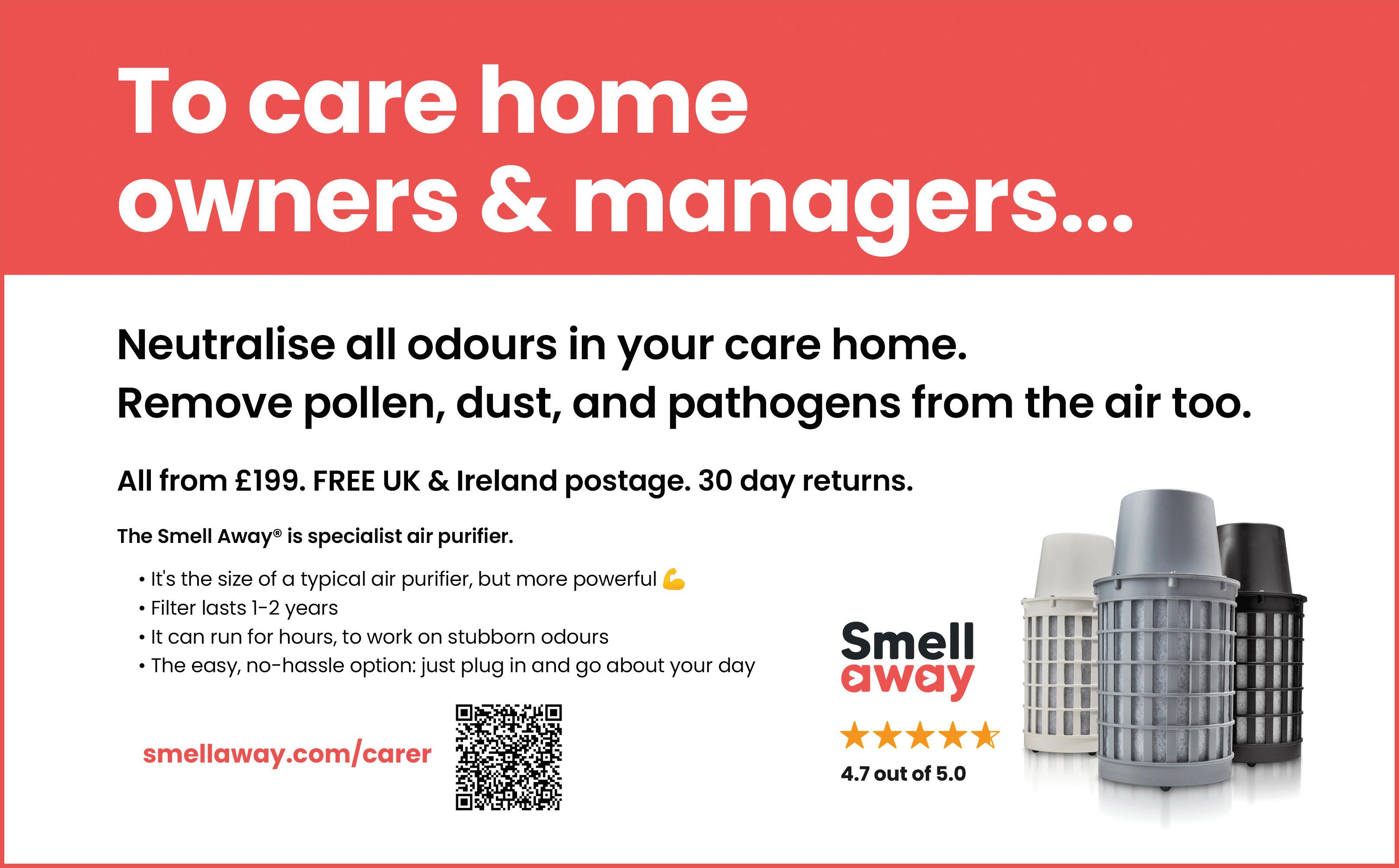
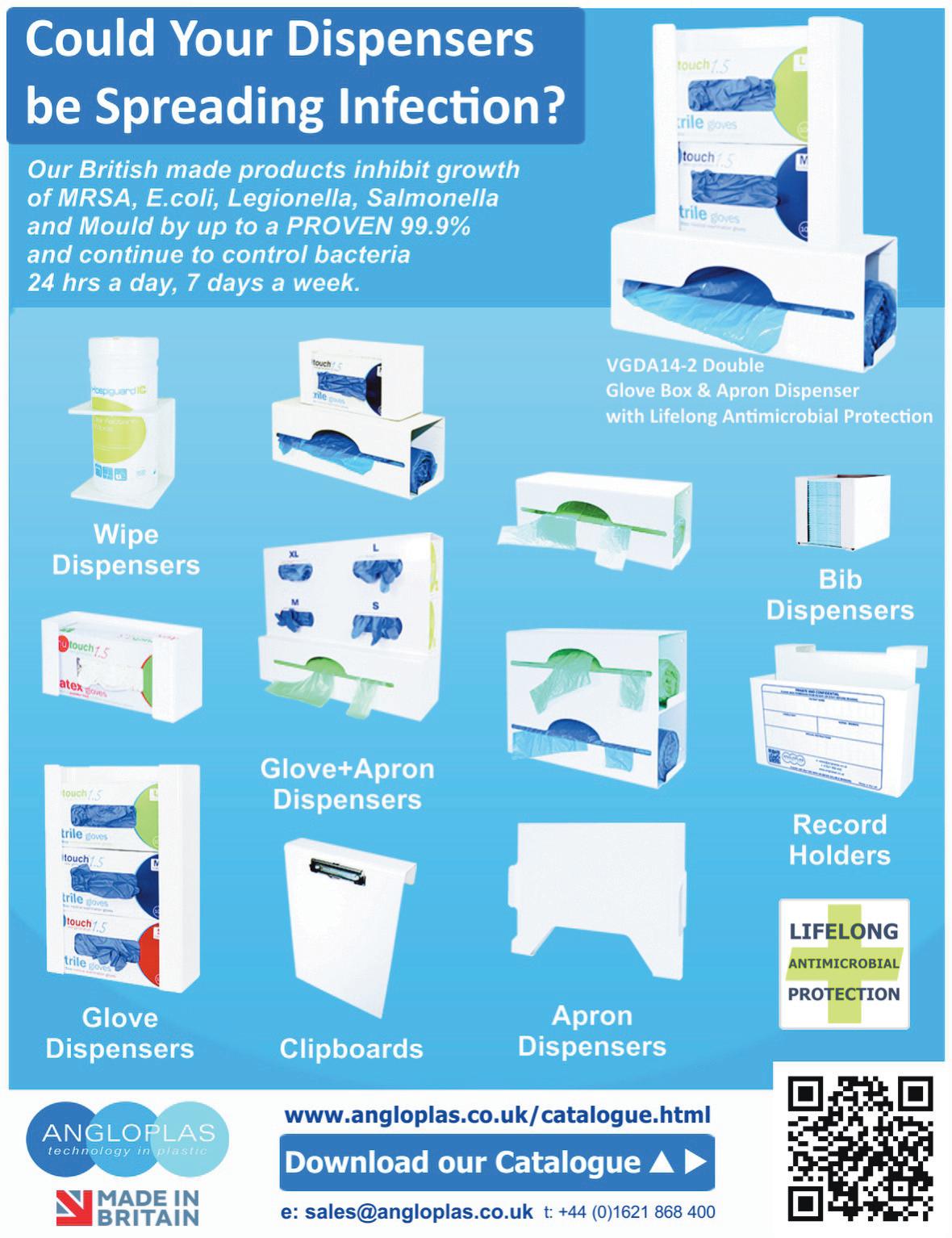
Part of Velair Group Limited, established 2012. Enviro-Save supplies costeffective and environmentally friendly washroom solutions, as well as being the Master Distributor for the Oxy-Gen Powered® air-care range in the UK and Republic of Ireland.

Oxy-Gen Powered® is the only technology that harnesses the power of pure oxygen to guarantee the delivery of fragrance into the air continuously, consistently and accurately for the entire duration of the cartridge life.
This innovative system is based on fuel cell technology that is used in the pharmaceutical industry to deliver drugs to human beings and animals.
Oxy-Gen Powered® technology is simple, reliable and cost-effective.
All Oxy-Gen Powered® fragrance cartridges contain Neutra-Lox, our proprietary odour eliminating ingredient that is extremely effective against the smell of urine, faeces, body odour, tobacco, pet malodour, kitchen odour, mould, mildew and more. Unlike other systems that only mask odours, Oxy-Gen Powered® cartridges eliminate odours and release fragrance effectively and continuously. Carbon footprint approved, and 100% recyclable cartridges; choose Oxy-Gen Powered® for cleaner air and a cleaner earth.
With no added solvents, alcohols, CFCs, VOCs or propellants, our Oxy-Gen Powered® cartridges contain 100% pure fragrance oil and are a safe choice for any facility.
See the advert on this page for further information.
Angloplas are a UK manufacturer who specialise in producing dispensers for the health and hygiene industry. Although these are designed to keep the workplace tidy and uncluttered they are, more importantly, built knowing the control of healthcare-associated infections (HCAIs) are a priority for healthcare providers, and who are employing a combination of infection prevention and control strategies, including hand hygiene, cleaning, training and the adoption of new technologies, to tackle the problem.

proven Antimicrobial PVC with silver ion technology and which is exclusive to Angloplas. This helps reduce the risk of cross infection by stopping the growth of bacteria and mould and works continuously for the lifetime of the product, reducing levels of bacteria such as MRSA, E Coli, Legionella, Salmonella and mould by up to 99.99%.
For non-clinical environments
As a result, a wide range of infection control products and technologies are emerging on the market, including antimicrobial technology. Angloplas’ range of dispensers are produced in the world’s first
Angloplas has recently launched its new Budget Range of products which are made to the same exacting standards as the antimicrobial protected ones but with lower price tags.
You can order Angloplas products directly from its website at www.angloplas.co.uk

Modern nurse call monitoring systems represent a transformative advancement in residential care, bridging the gap between resident independence and professional oversight. These sophisticated platforms extend far beyond traditional emergency buttons, offering comprehensive monitoring solutions that support dignity whilst ensuring safety and prompt response to care needs.
CRITICAL IMPORTANCE IN CARE SETTINGS
The fundamental purpose of nurse call systems lies in empowering residents to maintain control over their care environment. When individuals can easily summon assistance, anxiety decreases and confidence increases, directly supporting psychological wellbeing and independence. This empowerment proves particularly vital for residents with mobility limitations or cognitive concerns who may otherwise feel vulnerable or isolated.
Recent Care Quality Commission reports consistently highlight response times to resident calls as key indicators of care quality. Effective monitoring systems provide objective data demonstrating compliance with regulatory requirements whilst supporting continuous quality improvement initiatives.
ADVANCED SYSTEM FEATURES
Contemporary nurse call platforms integrate multiple monitoring capabilities beyond basic emergency alerts. Motion sensors detect unusual activity patterns, potentially indicating falls or distress before residents can actively seek help. Sleep monitoring functions track rest patterns, enabling staff to identify health changes early and adjust care plans accordingly.
Smart bathroom monitoring provides discrete oversight without compromising privacy, automatically alerting staff to extended occu-
pancy periods that may indicate medical emergencies. Door sensors track movement patterns, supporting dementia care by identifying wandering behaviours or exit-seeking attempts.
Advanced systems incorporate two-way communication features, allowing staff to assess situations remotely and provide reassurance whilst coordinating appropriate responses. This capability reduces unnecessary mobilisation of emergency resources whilst ensuring genuine emergencies receive immediate attention.
COMPREHENSIVE BENEFITS
Enhanced Response Times: Digital systems provide instant notifications with precise location data, enabling faster response times compared to traditional methods. Priority coding ensures urgent situations receive immediate attention whilst routine requests are managed efficiently.
Improved Documentation: Automated logging captures response times, call frequencies, and staff actions, supporting quality assurance programmes and regulatory compliance. This data proves invaluable for care plan reviews and staffing level assessments.
Reduced Staff Burden: Intelligent filtering prevents unnecessary interruptions by distinguishing between genuine emergencies and routine requests. Mobile integration allows staff to receive notifications anywhere within the facility, improving efficiency and reducing response delays.
SAFETY AND WELLBEING ENHANCEMENT
Proactive monitoring capabilities identify potential health crises before they escalate. Fall detection technology automatically summons assistance even when residents cannot activate call buttons manually. This feature proves particularly valuable for individuals with
cognitive impairments who may forget to seek help or become confused during emergencies.
Environmental monitoring functions track room temperature, humidity, and air quality, supporting infection control measures and ensuring optimal living conditions. Integration with fire safety systems provides comprehensive emergency response coordination.
DIGNITY-PRESERVING IMPLEMENTATION
Successful deployment requires careful attention to privacy concerns and individual preferences. Systems should offer adjustable sensitivity settings, allowing personalisation based on resident needs and comfort levels. Clear communication about monitoring capabilities helps residents understand how technology supports rather than surveils their daily activities.
Staff training must emphasise respectful response protocols, ensuring calls receive prompt, professional attention regardless of frequency or apparent urgency. This approach maintains resident confidence in the system and prevents reluctance to seek necessary assistance.
CONCLUSION
Nurse call monitoring systems represent essential infrastructure supporting both resident independence and professional care delivery. When implemented thoughtfully, these technologies enhance safety without compromising dignity, creating environments where residents feel secure, supported, and respected.
The investment in advanced monitoring capabilities demonstrates commitment to excellence in care delivery whilst providing objective evidence of quality standards. Most importantly, these systems empower residents to maintain control over their care experience, supporting dignity and wellbeing throughout their residential care journey.
Alarm Radio Monitoring is the market leader in the design, manufacture and installation of bespoke, end-to-end, wireless alarm systems and solutions for the healthcare, leisure, custodial and education industries.
We have been providing wireless alarm and nurse call systems for over 30 years. Supplying care homes and hospitals with an essential lifeline that supports the delivery of outstanding care.
We believe in excellence which translates into:
Advanced Technology
Industry-leading wireless alarm technologies and software Bespoke Solutions
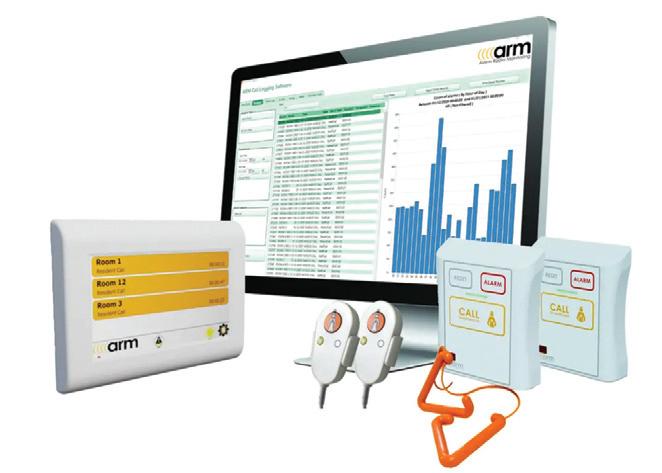
We design systems to your needs rather than your team having to work around the system
Innovative Design
Pushing boundaries with the reliability that comes from decades in the industry
Flexible Finance Options
Ensuring organisations of any size can provide safety for their staff and clients 24 Hours a Day, 365 Days a Year Service
Your ARM service team is on hand, on the phone, on-site or return to base, whether you have a service contract or not
For further information, see the advert below or visit www.arm.uk.com
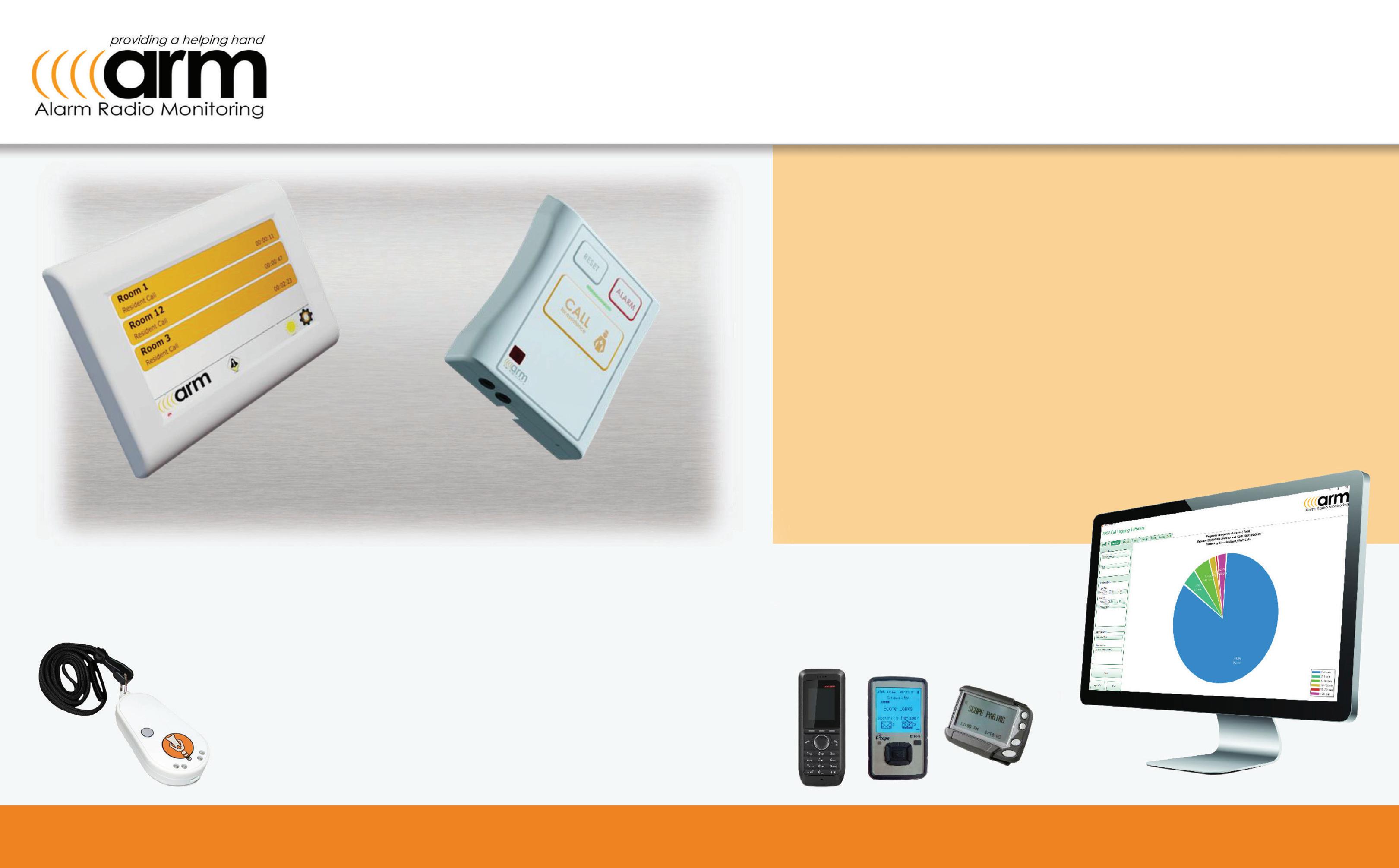
The wireless ARM Nurse Call system has been developed over 30 years with both the client and user in mind.
It enables staff to efficiently answer calls, making the management of resources more flexible and provides the functionality you would expect of any nurse call system.
The system is quick and easy to install and works wirelessly, using radio communication between both the call points and the system infrastructure.
Data Analysis software provides a full audit trail of events
The all-new call logging software from ARM enhances the functionality of your care call system dramatically.
• It can help you track the quality of your service to your residents.
• It can help you demonstrate compliance with your aims and best practices, both to relatives and to authorities.
• It can help you find bottlenecks in service provision, track staffing requirements, and allow you to ensure staff are meeting expectations.
• Most importantly, it provides assurance that you know and can demonstrate what is happening in your care home.
Call messages can be sent direct to staff to speed up response times and can also be integrated to work with smart phones & messaging.
Fall Savers®, are an experienced market leading healthcare provider of resident safety solutions for over 15 years.
FALL SAVERS ® WIRELESS MONITOR
Eliminate all cables with our new generation falls management solutions!
Upgrade your falls programme with the latest technology from Fall Savers®. The NEW Fall Savers®
Wireless eliminates the cord between the monitor and sensor pad. This results in less work for nursing staff, improved safety for patients and reduced wear and tear on sensor pads. Wireless advantages include the ability to use one monitor with two sensor pads simultaneously and support for many new wireless devices.
BENEFITS INCLUDE:
Safer for patients; less work for staff Bed and chair pads available
One monitor works with two sensor pads Integrates with most nurse call systems
A variety of options, including:

Floor sensor mat
Wireless door/window exit alerts
TREADNOUGHT
®FLOOR SENSOR PAD
The TreadNought® Floor Sensor Pad is built to last with a durable construction that far out lasts the competition. Our anti-bacterial floor sensor pad is compatible with most nurse call systems or can be used with a portable pager to sound an alert when a person steps on to the sensor pad. Caregivers typically place the sensor pad at the bedside, in a doorway or other locations to monitor persons at risk for falls or wandering. An optional anti-slip mesh reduces the potential for slippage on hard surface floors.
FEATURES INCLUDE:
Connects directly to most nurse call systems
High Quality anti-bacterial Floor Sensor Pad
Large Size Pad: Measures (L)

Blaucomm’s Nurse Call Messaging Service (NMS) is the market leading solution to remove the dependency on noisy nurse call panels and pagers, through its intelligent software, which delivers the alerts straight to the care staff who need them.
Care homes are rapidly introducing smartphones for digital care planning and eMar - now, the same devices can be used to receive the nurse call alerts they need for the residents under their care.
Furthermore, Blaucomm NMS is deeply linked into Person Centred Software MCM, so call bell data is linked straight to care plans. This unlocks a huge benefit to care homes to enhance the staff performance with how they accept and respond to residents, which ultimately promotes better response times and visibility for management to audit their performance.
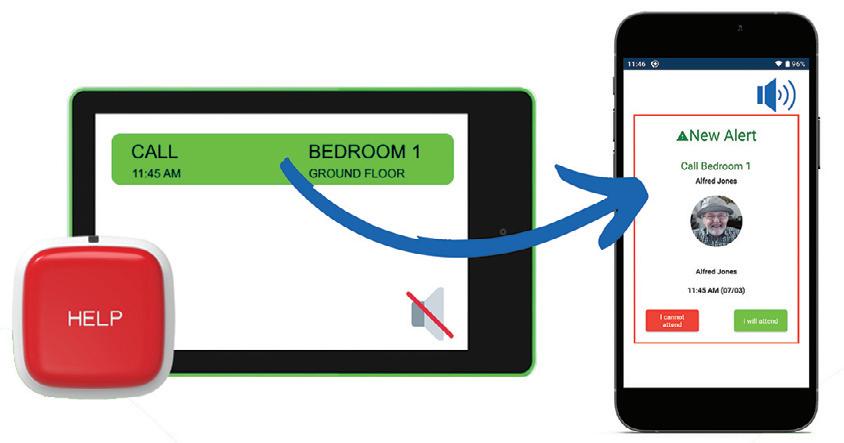
The best part is that Blaucomm NMS links into your existing nurse call system - we work with all major
brands such as Aidcall, ARM, Courtney Thorne, C-TEC, ENS, Intercall, Medicare, SAS and TeleAlarm.
Care operators are constantly recognising Blaucomm NMS for its reliability and dependability to their care operations, which is why we’ve been chosen time and time again over other solutions.
Head of IT Trudi Harrow at WCS Care had this to say about Blaucomm NMS:
“We find Blaucomm is a genuinely fantastic company with a reliable product.
"We would highly recommend this to anybody who wants to replace expensive pagers and silence those annoyingly loud nurse call screens!” To find out more about Blaucomm NMS, visit

Falls are a significant concern for vulnerable individuals, especially seniors and patients at risk. Medpage, a leader in assistive technology, offers a range of cuttingedge products designed to enhance safety and provide peace of mind for caregivers and families. Here’s an in-depth look at some of their standout solutions:
MPRCG1 (2023) BED LEAVING DETECTION ALARM WITH CAREGIVER RADIO PAGER
The MPRCG1 is a comprehensive system tailored for fall prevention in domestic, commercial, and NHS care settings. This all-inclusive kit includes a bed pressure mat sensor, a BTX21-MP alarm sensor transmitter, and an MP-PAG31 radio pager. The system is designed to alert caregivers when a patient leaves their bed, reducing the risk of falls. Key features include:
Wireless Alerts: Notifications are sent to the caregiver’s pager via tone or vibration.
Customizable Alarm Delays: Options for instant, 15-minute, or 30-minute delays.
Durable Design: Antimicrobial and disinfectant-resistant materials ensure longevity. Ease of Use: Minimal installation required, making it user-friendly and portable.
HDKMB2 HOSPITAL DISCHARGE KIT FOR FALLS RISK PATIENTS
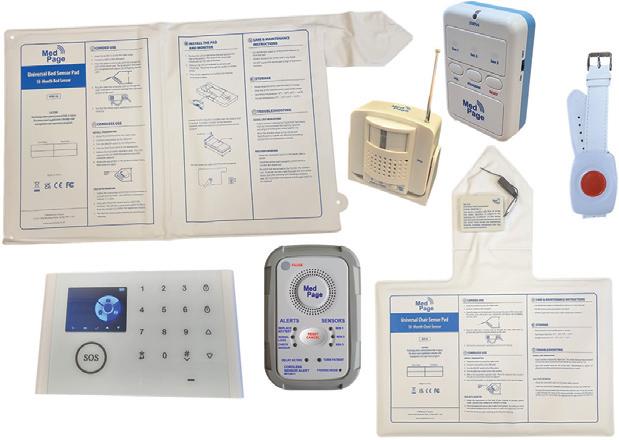
The HDKMB2 is a thoughtfully curated kit aimed at supporting patients transitioning from hospital to home care. It includes essential tools to mitigate fall risks and promote recovery. This kit is ideal for caregivers seeking a comprehensive solution to enhance patient safety during the critical post-discharge period.
CMEX-21 MULTI-PORT WIRELESS SENSOR INPUT EXPANDER FOR NURSE CALL CONNECTION
The CMEX-21 is Medpage’s latest innovation, designed to integrate seamlessly with existing nurse call systems. This multi-port expander allows for the connection of multiple wireless sensors, enhancing the
monitoring capabilities of healthcare facilities. Its versatility makes it a valuable addition to any care environment, ensuring timely responses to patient needs.
RON-WC2 WATERPROOF DISABLED PULL CORD ALARM TRANSMITTER WITH WIRELESS ALARM RECEIVER
The RON-WC2 is a robust solution for disabled individuals requiring immediate assistance. This waterproof pull cord alarm is ideal for use in bathrooms and other high-risk areas. Paired with a wireless alarm receiver, it ensures that help is just a pull away. Features include:
• Waterproof Design: Suitable for wet environments.
Wireless Connectivity: Reliable transmission to the alarm receiver.
• Ease of Installation: Simple setup for quick deployment.
WHY CHOOSE MEDPAGE?
Medpage’s commitment to innovation and quality is evident in their product range. Each solution is designed with the user’s safety and convenience in mind, making them a trusted choice for caregivers and healthcare providers alike.
By investing in these advanced fall prevention tools, families and facilities can create safer environments for those at risk. Medpage continues to lead the way in providing practical, reliable solutions that make a real difference.
For more information, visit Medpage’s official website or contact their team to explore these products further. Safety starts with the right tools, and Medpage delivers just that. www.easylinkuk.co.uk
T: 01536 264 869
Courtney Thorne, a long-standing innovator in healthcare communication systems, is setting new standards in the care home sector with its advanced wireless nurse call technology—designed to improve resident safety, enhance staff efficiency, and support a more responsive care environment.
With over 30 years of experience serving the UK healthcare market, Courtney Thorne’s systems are now trusted by thousands of care homes nationwide. Unlike traditional hardwired solutions, their wireless nurse call systems offer non-invasive installation, scalability, and smart analytics—making them ideal for both new builds and retrofit projects.
“At the heart of our technology is the belief that better communication leads to better care,” says Graham Vickrage, Managing Director at Courtney Thorne. “Our wireless systems not only reduce response times but also empower staff
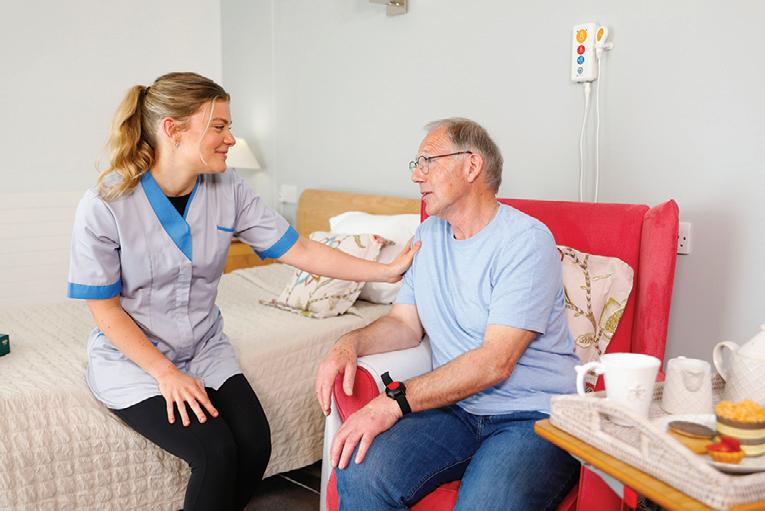
with the tools they need to deliver safe, person-centred care.”
Care providers are increasingly choosing wireless systems for their flexibility, reliability, and cost-effectiveness. With a full suite of accessories—including neck pendants, door monitors, fall detection, and bed sensors—Courtney Thorne systems can be tailored to meet the specific needs of each home and resident.
In an industry where compliance, safety, and staff pressures are always front of mind, Courtney Thorne provides more than just products—they offer ongoing support, training, and a commitment to innovation that helps care homes futureproof their operations.
For more information or to book a free demo, visit www.c-t.co.uk or contact info@c-t.co.uk.
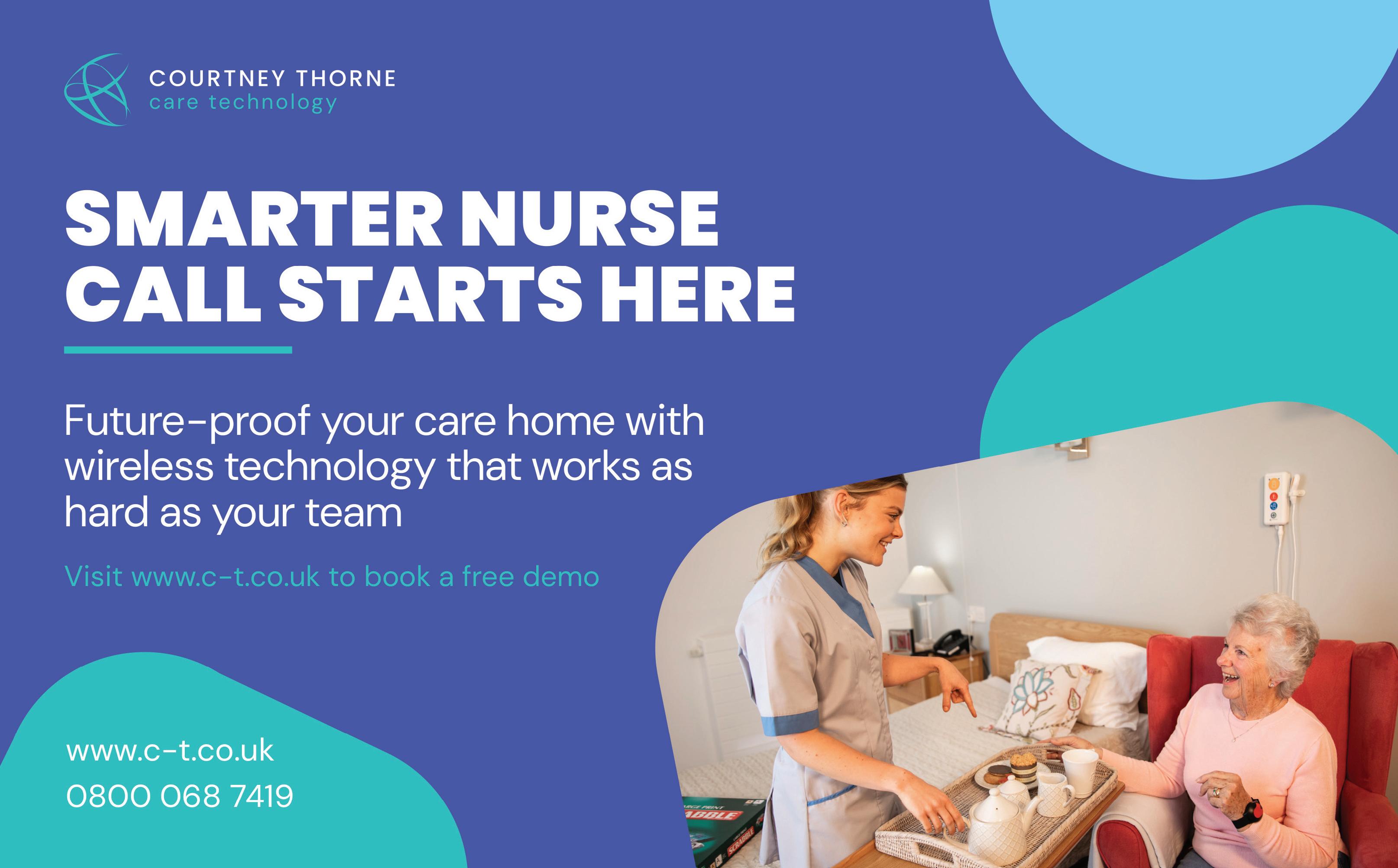
Adult social care is changing fast. Across England, providers are swapping paper and patched-together systems for complete digital records, in step with the government’s Digitising Social Care programme.
Primera Healthcare, which supports people at home in Birmingham and London, has moved early and decisively.
The team started 2025 by upgrading their older care system to Allin-one PASS, adding digital care planning, rostering and finance tools so that every part of the service now sits under a single platform.
The switch felt less like a software update and more like turning on the lights. Travel times, staff skills and visit continuity now feed automatically into the rota, so late or missed calls are spotted and fixed before they become problems.

Medication notes flow straight into electronic MAR charts, and live GPS data shows managers exactly where carers are, cutting the need for frantic phone calls on busy shifts.
Most striking of all is GP Connect. With one tap, authorised staff can see up-to-date diagnoses and prescriptions, saving time and keeping visits focused on the person rather than the paperwork.
“The transition was seamless,” says Shaelene Dewar, Quality Assurance Auditor. “The journal view gives us a live window on the whole business, and the Data Creation Team at PASS built our new
3. ENHANCED MONITORING
settings, the impact it can have is huge.
Here’s a closer look at why AI is set to make waves in social care:
1. BOOSTING EFFICIENCY
AI can help handle those resource-draining tasks in seconds. Whether it’s crunching a mountain of data, summarising care notes, or suggesting next steps, it frees up your team to do what they do best.
It can also improve communication, such as helping new team members quickly access policies or answer routine questions without waiting for assistance. By handling these background tasks, AI allows organisations to redirect resources to other core priorities.
2. ENSURING PERSON-CENTRED CARE
AI can support your teams when providing persona-centred care by analysing data over time, so they can build tailored plans that align with each individual’s goals, preferences, and abilities. It can even predict future needs, flagging issues before they arise so your team can act proactively.
Care organisations often operate round-the-clock, and AI can offer real-time monitoring to support this. For example, AI can highlight subtle behavioural changes, like someone sleeping poorly or becoming more withdrawn. These insights can alert your teams to potential concerns early, which means better, faster decisions can be made to support your clients.
For organisations, this level of tracking ensures care quality stays high, without adding to the workload. It’s like having an extra layer of support that’s always on duty.
4. EMPOWERING TEAMS
AI is here to help empower your care teams, not replace them. AI tools can provide instant recommendations or resources, which could help your newer employees confidently manage unexpected situations. Similarly, AI can assist with summarising care notes or giving quick access to up-to-date best practices, helping your teams provide the high-quality care they work so hard to deliver.
5. OPTIMISING COSTS
One of the big wins of AI is its ability to do more with less. By automating tasks and making resource allocation more efficient, it
forms in record time. GP Connect is brilliant. Reliable information in seconds, and the new charts help us spot patterns we never saw before.”
Those changes have delivered quick, concrete gains. Oversight is tighter, risk is lower, and staff spend more minutes each day with the people they support.
Everything is logged, time-stamped and ready for inspection, which reassures families and pleases regulators.
As everyLIFE Technologies marks ten years of PASS, Primera’s experience shows what the next decade can look like when digital tools are placed at the heart of care.
Good care can always get better, and better starts with digital.
Ready to explore your own next step? Visit www.everylifetechnologies.com or call the everyLIFE team to see how PASS can help your service.
can help organisations manage tight budgets without compromising on care.
AI can even help reduce staff turnover by easing workload pressures, which means savings on recruitment and training costs too. Plus, because AI solutions are scalable, it can adapt to your organisation's needs.

AI in social care isn’t about replacing people with tech. It’s about giving your teams the time, insights, and tools they need to focus on the people they care for. That’s why OneAdvanced AI, the first UK hosted fully secure, private AI tool for businesses, was created. OneAdvanced AI can help care providers improve efficiency, deliver person-centred care, and empower teams, all while safeguarding your data. This marks a significant step towards a more innovative and sustainable future in social care.
Find out more at: www.oneadvanced.com/ai
See the advert on the back cover of this issue for further info.




A new report from the Digital Care Hub, Online But Unsupported, highlights the vital role care homes and other care providers play in supporting people with learning disabilities to stay safe online.
Digital access is now a routine part of life. People use the internet to keep in touch with family and friends, follow hobbies, do their shopping, and increase their independence. But alongside the many benefits come real risks—and people need the right support to manage them.
The research, commissioned by Better Security, Better Care and delivered by Cyber Champions, found that while many people with learning disabilities feel confident using the internet, fewer feel confident about keeping themselves safe.
Key challenges identified include:
• Only 31% of people knew how to spot a fake email or scam
Nearly 30% didn’t know how to change privacy settings on social media
Almost a quarter weren’t sure how to update device security
Some people had been tricked into sharing inappropriate images, not realising the risks or consequences
Others struggled to tell the difference between online and real-life friends

Carers also raised concerns about online grooming, sexting, bullying via messaging apps, and people oversharing personal information.
Care home staff, volunteers and family members are central to helping people manage these risks. But the report found that carers often don’t get the practical training or support they need.
89% of staff support people online at least once a month
25% had received little or no training in digital safety
• 69% said their training was annual but not tailored to real-life situations
• Around 30% said they didn’t know how to set up two-factor authentication or update device security
“There’s a gap between people’s confidence in using the internet and their ability to spot risks and stay safe,” said Michelle Corrigan, Programme Director at Better Security, Better Care. “This can lead to people with learning disabilities being targeted online or unintentionally putting themselves in danger. Care providers have a real opportunity to help close this gap.”
The report calls for care providers to invest in regular, scenario-based training for staff—moving beyond tick-box approaches. It recommends using role-play and real-life stories to help people with learning disabilities understand online safety in simple, everyday terms.
“We need to make online safety part of everyday conversations in care,” said Samantha Leonard, Co-Director of Cyber Champions. “Staff don’t need to be tech experts, but they do need to feel confident talking about online risks, noticing red flags, and knowing where to go for trusted support.”
The report also encourages care organisations to build a culture where staff can share new threats, ask questions, and learn together. By doing so, care providers can help people with learning disabilities enjoy the digital world safely and confidently.
Free resources and guidance are available at: www.digitalcarehub.co.uk/OnlineButUnsupported

In today’s regulated care environment, having clear, current, and wellcommunicated health and social care policies is essential for delivering safe, compliant services. The Care Quality Commission (CQC) now places increasing emphasis on how policies are implemented and understood—especially during registration and inspections.
Outdated or poorly communicated policies can significantly impact your CQC rating. Even if documentation is comprehensive, failure to ensure staff understand and follow procedures may lead to a “Requires Improvement” or even “Inadequate” rating under the ‘Effective’ domain. Well-maintained policies promote consistent standards across care teams and help safeguard services when incidents arise. In regulatory investigations, the first request is often to review relevant policies—making accuracy and accessibility key to reducing legal and compliance risks.

However, keeping policies up to date is challenging. Constant changes in legislation, best practice guid-
ance, and case law mean that policies can quickly become obsolete. W&P has been a trusted provider of CQC-ready care policies and procedures for over 20 years. Our expert team monitors industry developments to ensure your policies remain fully compliant.
Our Online Policy Portal simplifies policy management. With just a few clicks, providers can update content, distribute documents to staff, track confirmations, and monitor compliance via a real-time dashboard. You can even provide temporary read-only access to inspectors—demonstrating transparency and accountability instantly.
Ensure your care service meets CQC expectations with fully up-to-date, easily accessible, and well-communicated policies.
Email: info@wandptraining.co.uk
Call: 01305 767104
for details.
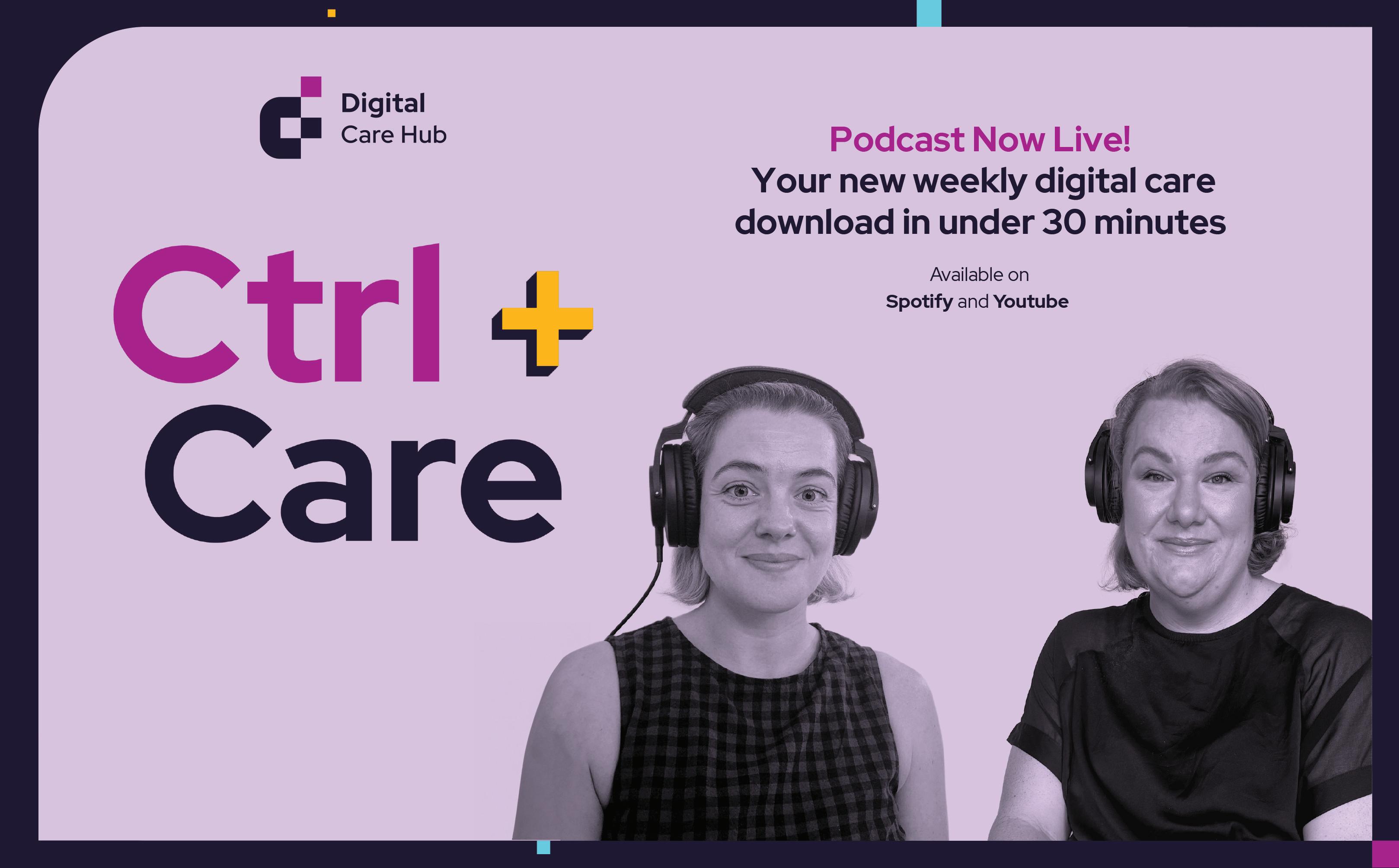
By Becky Mundie, RotaCloud (https://rotacloud.com)

How much time do you spend on admin?
How long are you locked away in your office to make the rota, only having to go back again and again for amends? How often have you realised you’re understaffed, resulting in overspending on agency staff? How frequently do payroll errors, messy audit trails, and chasing staff who missed a shift update occur?
It’s constant, the stress of it all. It’s enough to carry the care of your service users on your shoulders without being overwhelmed every day by repetitive admin and errors. You never thought you’d be spending more time amending schedules, chasing for cover, and correcting issues than your actual job.
But those inefficiencies — staff shortages, payroll errors, missed shift updates, and multiple spreadsheets you juggle — cost you money, time, staff retention, and, in some cases, compliance.
It’s easy to suggest investing in budgeting tools or certain tech to help you understand spending before it happens and to automate certain processes. Budgets are tight in care, after all. But there are simple fixes to cut your operating costs without cutting back on care if you can’t yet turn to digital systems.
Cutting costs doesn’t just mean spending less. It’s about making smarter decisions – reacting to and fixing
the cause of the problem, not the effect. And it all starts with your rota.
There are ways to take better care of your rota, which will, in turn, improve efficiency and staff morale.
One main way: putting your staff first.
First, give your team more say in when they work by allowing them to submit their availability. Try making a rolling rota with a mix of most and least preferred shifts so everyone gets a fair share of them. It means far less admin for you when the rota repeats, far fewer last-minute amends, a more accurate payroll, an easier audit trail, and no more miscommunications on when everyone’s working.
Second. Share rotas at least two weeks in advance. Doing so allows enough time to make amends and for everyone affected to be updated. Sticking to this process is more efficient, which means less admin – which means more time to focus on service users.
Third. Put in a more seamless process for holiday requests. Whether a submitted form or limiting to one means of messaging, sticking to one process means fewer lost or forgotten requests and much less paperwork. Plus, allow staff to arrange shift swaps themselves, leaving managers to simply approve or deny. Again, less time on admin means more time for service users.
All in all, your saviour is flexibility. Flexibility in rotas means less admin for managers, more efficient teams and safe staffing levels, happier staff (and higher retention rates), and, in return, happier service users – all saving costs in the process. After all, when you aren’t making last-minute changes or relying on agency staff to cover no-shows, you stick to the staffing levels and labour budgets you’ve forecast. So long, overspending, lost time, and inefficient processes.
Technology is a key part of the CQC’s improvement agenda; especially when it comes to how care services record performance during inspections.
THE PROBLEM
Many care providers want to move away from pen and paper-based audits and spreadsheets, but most software lacks the capability and flexibility to handle the complexity of the CQC requirements and ratings structure – leading to gaps in oversight and accountability.
THE SOLUTION
Drawing on our experience providing CQC improvement support, we developed an easy-to-use care audit platform designed to help care providers stay on top of their compliance obligations with the user in mind and the CQC framework at its core.
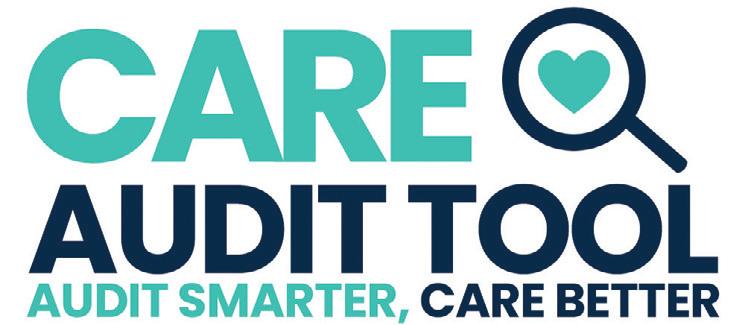
Our Enterprise Care Audit Tool enables care providers to improve oversight and respond to CQC requirements with confidence — delivering greater visibility, accountability, and control.
Now, we’ve made that same expertise and capability more accessible.
Our new cloud-based version is built on the same trusted foundation, giving providers of all sizes a faster, more flexible way to manage compliance with ease.
KEY FEATURES
• CQC-Aligned Dashboard - View audit outcomes and actions against CQC rating thresholds, with drill-down visibility for full organisational oversight.
• 100+ Ready-to-Use Audits - Covering all core operational areas including Care, Health & Safety, Estates, Catering, HR, and more.
• 2,000+ Question Library - Choose from a comprehensive library of questions, each aligned to statutory regulations and the CQC inspection framework.
• Automated Action Management - Audit outcomes that require follow-up are automatically fed into the dashboard and actions portal for clear accountability and tracking.
Reporting - Access a suite of structured reports to support internal reviews and inspection readiness.
• Engagement Surveys - Collect feedback from staff, service users, and relatives STRESS LESS. TRACK MORE. BE READY.
If you’re spending hours chasing paperwork or stressed about being prepared for any inspection any day
- Care Audit Tool can help.
Website: careaudittool.co.uk
Email: info@careaudittool.co.uk
Phone: 0333 577 0807
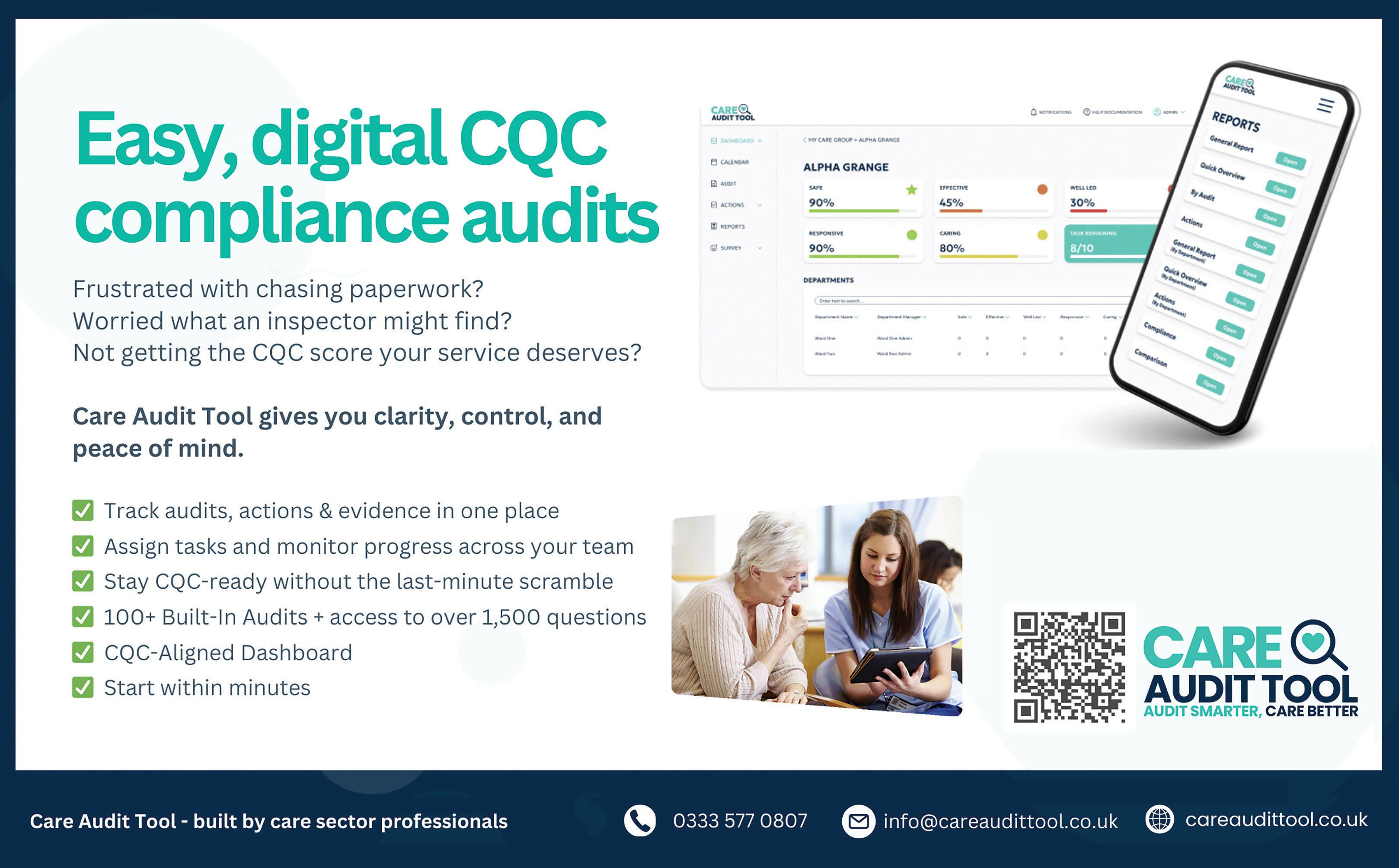
QCS x Carebeans, the UK’s leading digital provider of compliance, care management and workforce solutions for the adult social care and support sector, announces the launch of QCS Learning Centre - a powerful new addition to their growing ecosystem of connected tools built to help providers deliver safer, smarter care.
Developed in partnership with CareTutor, a trusted training expert with over 20 years’ experience in the care sector, QCS Learning Centre offers accessible, accredited and engaging video-based training designed specifically for frontline care teams.
“We’re building the future of digital care,” says Nikki Walker, CEO at QCS. “The QCS platform is about more than just ticking boxes. We’re creating an intelligent, joined-up system where compliance, care management and training all work together – backed by rich data that powers our AI integrations, all driven by realworld care and support challenges, designed to give time back to providers when they need it most.”
A CONNECTED ECOSYSTEM – SMARTER TOGETHER
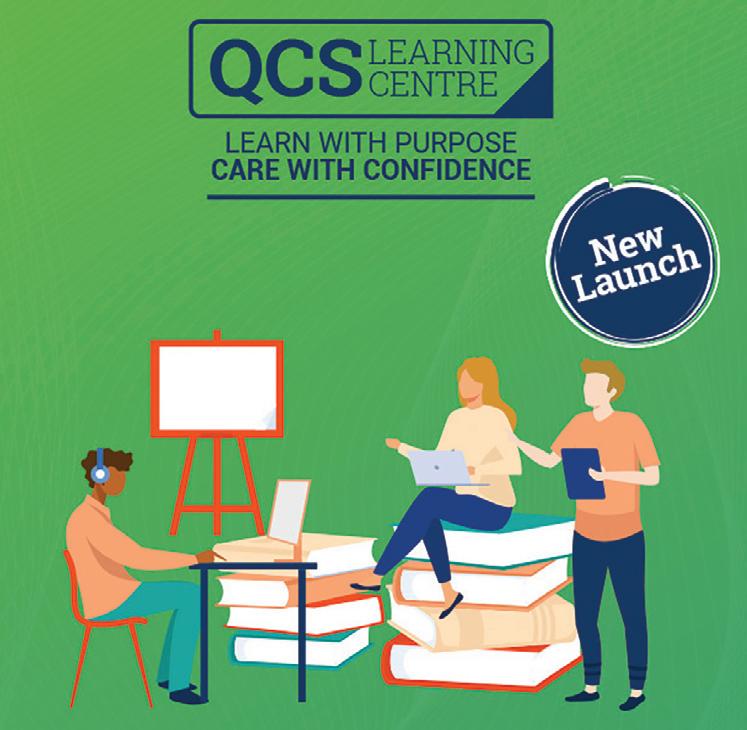
QCS Learning Centre is fully integrated into the wider QCS x Carebeans platform, which brings together care planning, rostering, audits, mock inspections, policies and training into one seamless digital experience. This connected approach means that care and support teams can respond faster, train smarter and make better decisions - all in one place.
Whether you’re running a care home, a domiciliary service or supported living provision. Every part of the system works together to reduce admin, keep you inspection-ready and support better outcomes for the
people you care and support for.
Luke Bond, Managing Director at CareTutor, adds “QCS Learning Centre is more than just another training tool. It’s the next step in supporting a stronger, more confident workforce - providing engaging and interactive, video-led courses designed and created by CareTutor specifically for the adult social care sector”.
What QCS Learning Centre Delivers:
Accredited, video-led training developed by sector experts
• Smart tracking and reporting to keep training up to date and inspection-ready
Designed for real-world care and support - simple to use and quick to deploy
Supports staff development, retention and quality improvement
Future integration roadmap with the full QCS x Carebeans system planned BUILT FOR THE SECTOR. BACKED BY AI.
With AI-powered features running across QCS x Carebeans platforms – the rich data within the system enables intelligent audit tools to real-time alerts and automated policy updates - QCS Learning Centre is part of a long-term vision to reduce admin, raise care quality and give providers back the time they need to provide and evidence quality care and support.
READY TO SEE IT IN ACTION?
Explore the QCS Learning Centre today and see how it can support your service so you can be assured your team is skilled, confident, and able to provide higher-quality care and support.

https://www.qcs.co.uk/qcs-learning-centre/
By Eleanor Stephens, Senior Solicitor – Insolvency at law firm

The UK care sector is under significant financial pressure with rising costs, workforce shortages, and longterm underfunding pushing many care providers towards breaking point. These challenges have only intensified following recent Budget announcements, with increases in the National Living Wage and National Insurance placing further pressure on already resource-stretched organisations.
Recent findings from the Care Provider Alliance paint a stark picture.
A survey of over 1,100 care providers revealed that 73% expect to refuse new care packages, 77% are drawing on reserves, 64% anticipate redundancies, and 22% are considering closing altogether. These figures represent more than just operational strain; they signal a threat to vulnerable adults who rely on essential care, families who depend on support, and dedicated staff who risk losing their livelihoods.
Despite the severity of these challenges, care providers are not powerless. There are practical steps and strategies that can help navigate financial distress and build resilience for the future. In this article, Insolvency Solicitor Eleanor Stephens discusses how you can identify if there are cash flow issues in your business and the steps you can take as a care home provider.
HOW CAN CARE HOME OPERATORS RECOGNISE THE EARLY WARNING SIGNS OF FINANCIAL DISTRESS?
Financial distress rarely arrives without warning, recognising the signs early allows care providers to take action before problems escalate. Common warning signs include difficulties managing cashflow, increasing reliance on short-term borrowing or reserves, and delays in paying suppliers, landlords or HMRC. Indirect indicators, such as rising staff turnover, difficulties recruiting, or pressures around meeting regulatory standards, can also point to underlying financial stress. Directors, no matter the sector, have a legal duty to act in the best interests of creditors once a business faces potential insolvency. Ignoring warning signs not only reduces the chance of recovery but also increases the risk of wrongful trading, which can lead to personal liability.
What steps can care home providers take?
Start with a detailed financial health check, this includes reviewing cashflow forecasts, profit margins, and liabilities. Identify immediate pressures and longer-term risks. This step is not just for the finance team, senior leadership, including operations and HR, should understand the business’s financial position to work together on solutions. Its imperative to ensure you maintain an accurate and up to date financial picture so all directors are aware of the realistic financial situation and
can make decisions based on up to date information.
Engaging with key stakeholders early is an important step. Open conversations with lenders, landlords, suppliers, and local authority commissioners can create opportunities to renegotiate terms, extend payment deadlines, or secure additional support. Many stakeholders would rather help a business recover than see it fail.
Cost structures should be reviewed carefully. Are there areas of spend that can be reduced without affecting care quality? Are contracts still fit for purpose, or could they be renegotiated? Are there opportunities to refinance or access new funding? UNDERSTANDING YOUR BUSINESS’ RESTRUCTURING AND INSOLVENCY OPTIONS
In the care sector, financial pressure can build gradually, rising operating costs, staffing shortages, and delayed local authority payments can impact cash flow. For many business owners, the word ‘insolvency’ can feel like a last resort, or something to be avoided at all costs. But in reality, insolvency and restructuring processes are there to help businesses, not punish them.
If your care home is facing financial difficulties, understanding your options early can make all the difference. A legal process such as administration is designed to give viable businesses the breathing space they need to stabilise, restructure, and recover.
Here are the most common routes and options: COMPANY VOLUNTARY ARRANGEMENT (CVA)
A CVA is a legally binding agreement between a company and its unsecured creditors, typically to repay debts over a fixed period, often at reduced amounts.
The key advantage is that the business can continue trading while the CVA is in place. Directors stay in control, and staff, residents, and suppliers can experience minimal disruption.
How it works:
• The company proposes a repayment plan, usually spread over 3–5 years
• Creditors vote on the proposal at least 75% (by value) must agree for it to proceed
• Once approved, all unsecured creditors are bound by the terms
• The business continues to operate under the supervision of an insolvency practitioner
Why it works well in the care sector:
• Preserves continuity of care and minimises disruption for residents
• Retains jobs and protects staff morale
• Can prevent reputational damage by avoiding formal insolvency proceedings like liquidation
• Shows creditors that you’re taking proactive steps to meet obligations ADMINISTRATION
Administration is a formal insolvency process where control of the business passes to a licensed insolvency practitioner (the administrator). Their role is to act in the best interest of creditors and try to rescue
the business where possible.
During administration, the company is protected by a legal “moratorium”, meaning creditors can’t take enforcement action without the administrator’s consent or court approval.
What administration can achieve:
• Restructure the business to cut costs or exit loss-making contracts
• Sell the business as a going concern, preserving value and jobs
• Deliver a better return to creditors than an immediate liquidation Why this matters for care homes:
• Resident care can continue while the administrator explores rescue or sale
• It creates space to secure investment, agree a pre-pack sale, or restructure leases and liabilities
• Essential suppliers (e.g. food, utilities, medical services) are more likely to continue supply during a managed process LIQUIDATION
Liquidation is the process of closing down a company in a structured and lawful way. Assets are sold, creditors are repaid in order of priority, and the business is removed from the Companies House register. There are two main types:
• Creditors’ Voluntary Liquidation (CVL): initiated by directors when the business is insolvent and can’t continue trading
• Compulsory Liquidation: initiated by a creditor via court proceedings
What happens in liquidation:
• All trading ceases
• A liquidator is appointed to sell assets, settle debts, and distribute any remaining funds
• Employees are made redundant (with access to redundancy pay and other statutory entitlements)
• Directors’ duties continue during the process and are reviewed by the liquidator
When liquidation is appropriate:
• The business has no realistic prospect of recovery
• There are more liabilities than assets
• Continuing to trade would risk further losses or wrongful trading by directors
For care businesses, liquidation should be a last resort, but if recovery isn’t possible, it can allow directors to close the company in a way that meets legal obligations and limits personal risk.
SUMMARY
Many care homes in the UK are under real financial pressure. Rising costs and cash flow issues are making it harder to keep things running smoothly. Acting early is key: review your finances, talk to lenders and suppliers, and seek professional advice. Options like CVAs and administration can help restructure and protect your business, while liquidation should only be a last resort. Throughout the process, maintain clear communication with residents, families, and staff prioritising their wellbeing.

The Home Office has announced major reform of the Immigration Rules and the changes came into effect on 22 July 2025.
New rules were laid in Parliament on the 1st July 2025, which see skills and salary thresholds rise to the previously set RQF level 6, overseas recruitment for care workers to end, and between 100 and 180 occupations no longer eligible under the skilled worker visa route.
The new Immigration Rules came into force on 22 July 2025.
There is no doubt that the UK’s social care system will suffer from the UK government tightened immigration rules.
One of the major changes which will directly affect the social care sector is the Skilled Worker entry clearance applications for care workers (SOC code 6135) and senior care workers (SOC code 6136) being closed on 22 July 2025.
The government’s position is that care providers can recruit from the regional care partnerships which have a significant pool of displaced care workers. Furthermore, the government believe that resident workers can be trained to carry out these roles. However, both of these approaches are flawed.
The displaced workers pool will eventually diminish and there is no real plan to identify where the social scare sector will recruit for the carer and senior carer roles.
Key Takeaways: What Steps Should Care Providers Take Now
Providers holding a sponsor licence should carry out a full audit of their HR processes and the five areas of compliance under the sponsor guidance. Take advantage of the Aston Brooke Solicitors UKVI mock audit service. Please contact Mr Kashif Majeed and email km@astonbrooke.co.uk to book an appointment.
In addition to the above, the following action must be undertaken as a matter of urgency:
Global assists clients throughout the U.K. who specialise in the healthcare sector to achieve their objectives of purchase, development and refinance.
We have organised over £1.8bn for clients in the past 30 years, providing clients with competitively priced funding to refinance existing debt, ease cashflow and develop businesses further. From helping clients make their first purchase through to allowing groups to grow significantly in size we assist at every stage of your business expansion.

Every proposal is individual and deserves to be treated that way, so we hope you will allow us to be of assistance to you and call us to chat through your plans and requirements, I am sure we will be able to tailor a facility to your requirements. Call us on 01242 227172 or e-mail us at enquiries@globalbusinessfinance.net

1. Sponsored Migrants Salary Audit
As there are no transitional arrangements for the new salary thresholds, employers must review the salaries of all sponsored workers. If you are assigning CoSs on or after the 22 July 2025, you must meet the new salary thresholds to ensure compliance of the rules.
2.Compliance of the Skill Level Threshold
Please ensure compliance of any roles filled which fall below RQF level 6 and that they also appear on the Temporary Shortage List and the Immigration Salary List.
Please ensure that any roles sponsored under SOC code 6135 and 6136 are for existing staff who have been employed in the business for at least three months.
There are more changes to come later this year which include:
1. Increasing the immigration skills charge
2. Increasing the English language requirements across the immigration system.
For clear and comprehensive advice on the new rules, its implementation and how it affects your business,
please contact Mr Kashif Majeed, Director at Aston Brooke Solicitors. Email: km@astonbrooke.co.uk
"23 years, operating 4 Devon Nursing homes, has been pretty tough, as anyone in social care, knows, only too well. And if it was hard already, after 2024 budget, it's just got harder. Anyway, at heart, I am just customer of Eden Alternative, and it was a stroke of luck to come across this whilst on holiday in New Zealand in 2009. It started in USA in 1994 and now runs in 22 countries.

it's a programme that is straight forward, tried and tested for 30 years and really works. Its member care organisations generally become trainers for their own teams, and run it themselves. The programme is run in person over 2-3 days or online 1 hr a wk for 7 weeks. You choose.
The fact that I am now involved with this not-forprofit organisation (in the UK area) came about when one of the 2 main UK directors died suddenly just before Covid. But it's something I have run with for 11 years to help make 'vision' a reality, not a struggle. So, being both a customer and helping the admin seems quite natural.
It is a modern philosophy of care, but moreover,
It addresses loneliness, helplessness and boredom and operates through 10 principles to underpin 7 critical domains of wellbeing. Moreover, it's effective, transformational and really works. As residents, and team members wellbeing, matter so much it's a must, in my opinion. Geoffrey Cox Southernhealthcare.co.uk eden-alternative.co.uk"
